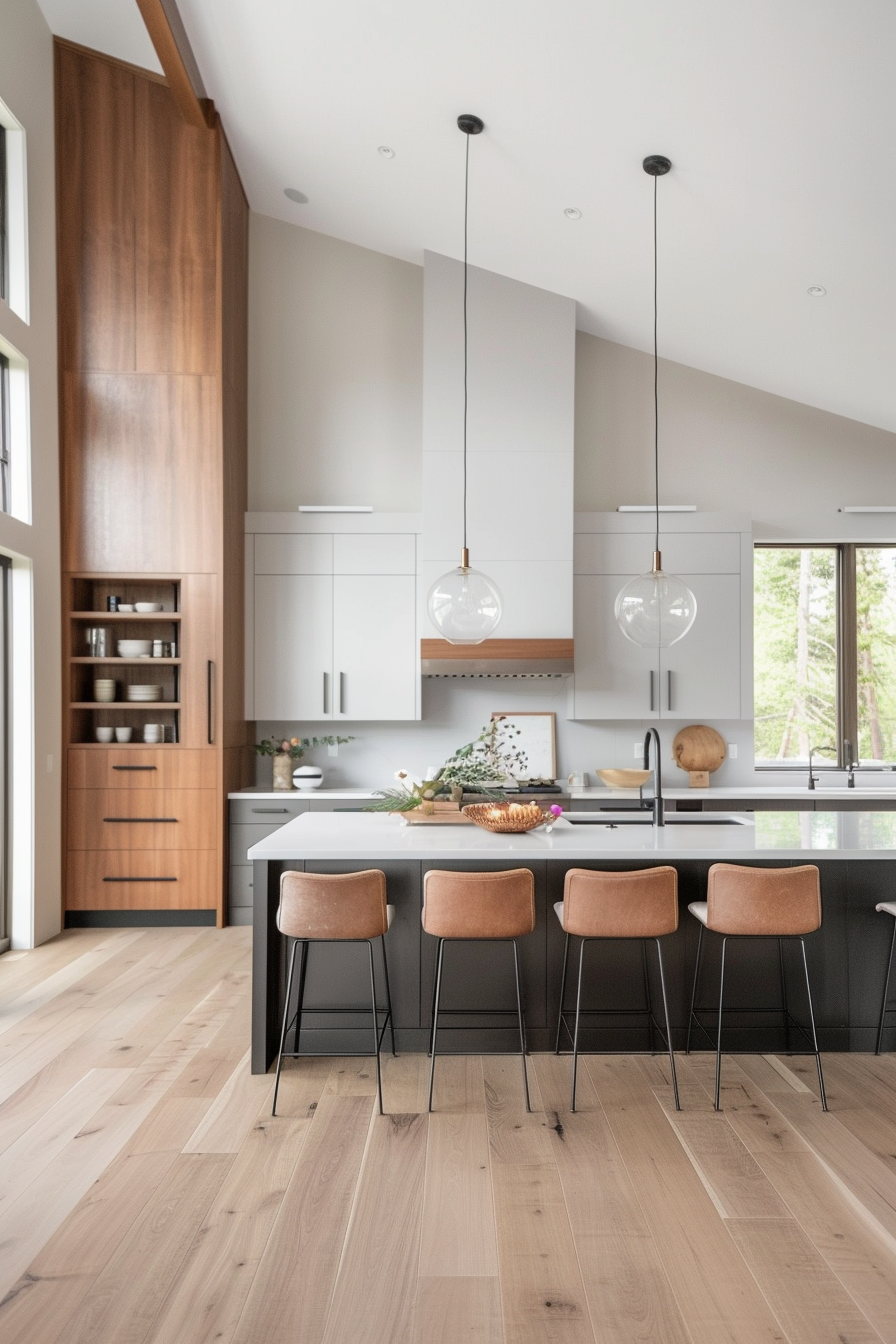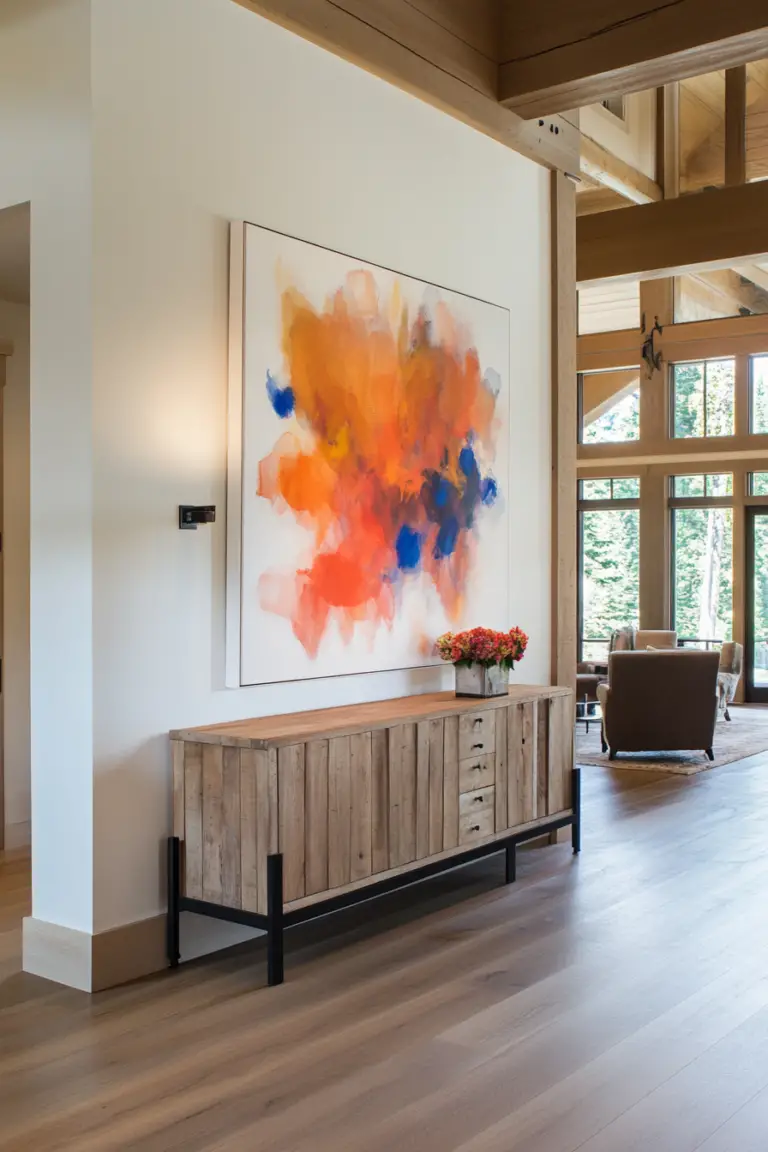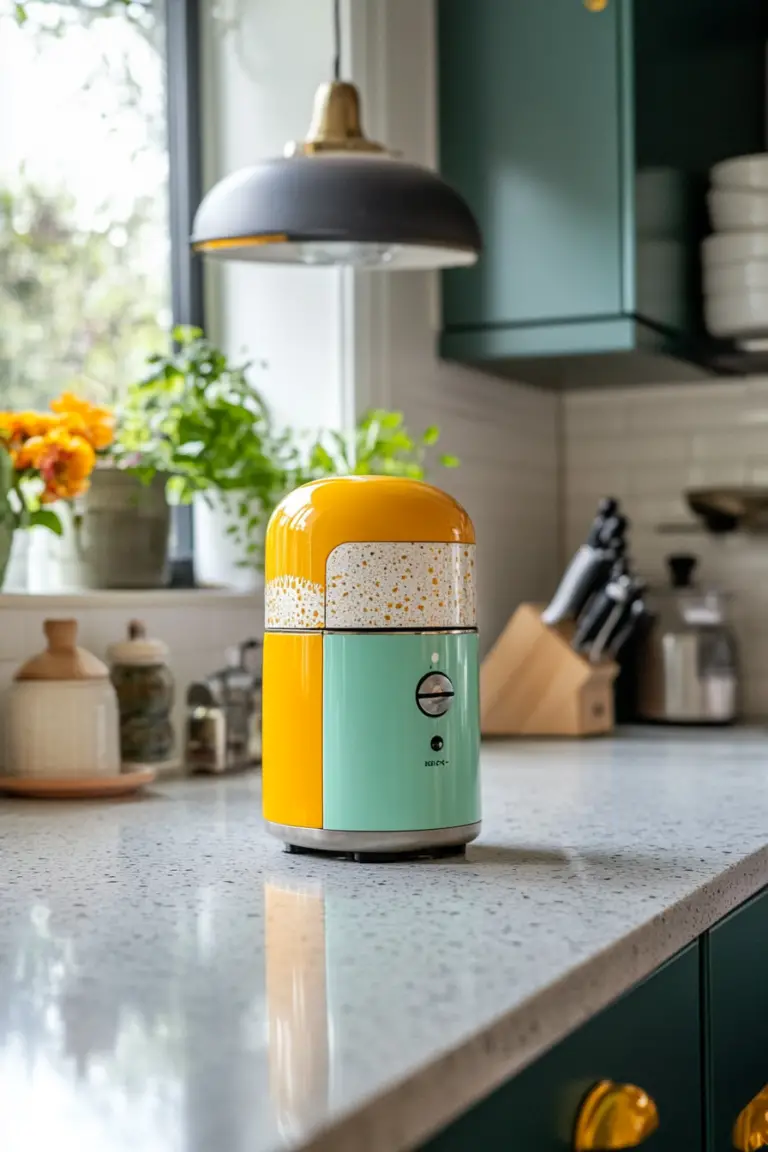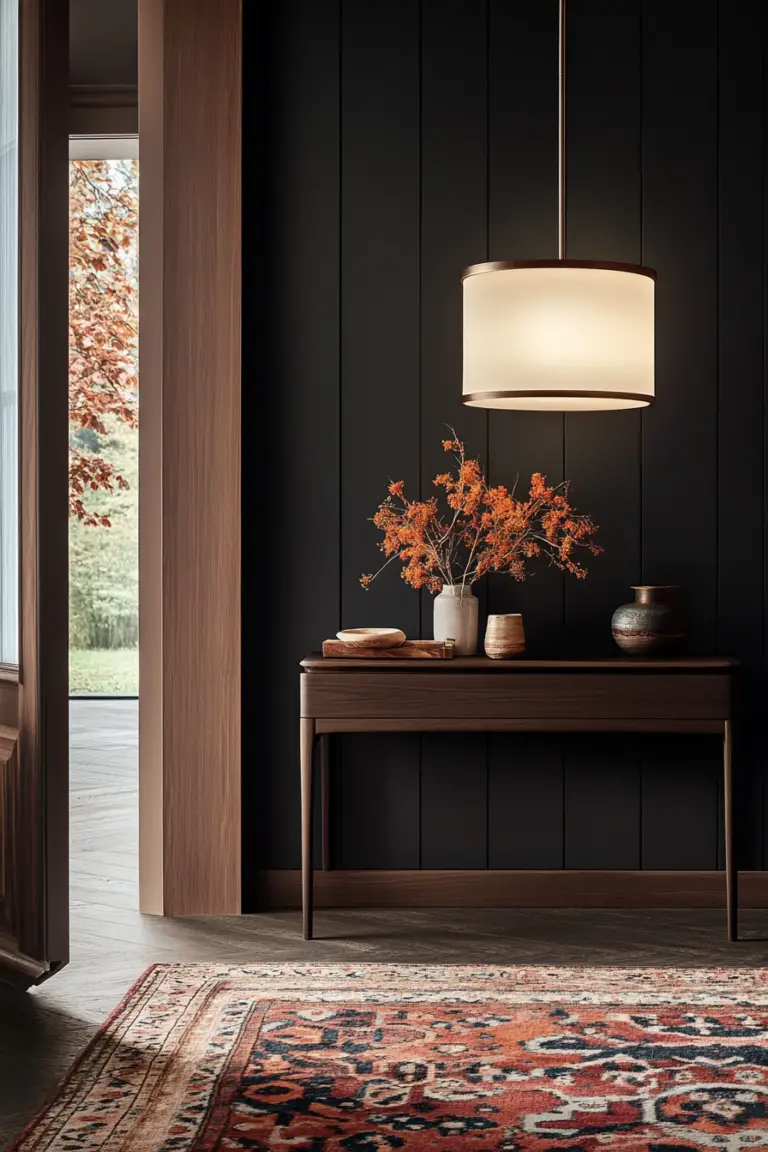Your Guide to a Mid-Century Modern Kitchen Remodel
Did you know that the mid-century modern design movement—born in the aftermath of World War II—is now one of the hottest trends in kitchen remodels? What was once your grandparents’ style is now the epitome of cool. If you’ve ever dreamed of cooking in a space that feels both nostalgic and cutting-edge, you’re in the right place.
Embracing the Essence of Mid-Century Modern
So, what’s the secret sauce behind this iconic style? It’s like the comfort food of design—simple ingredients that create a satisfying result. Mid-century modern is all about clean lines, functional forms, and a seamless blend of indoor and outdoor elements. Imagine a space where every element has a purpose, yet exudes effortless style.
Key Elements to Incorporate
- Sleek Cabinets: Opt for flat-panel or slab-door cabinets in warm wood tones like teak, walnut, or even bamboo. These materials bring warmth and natural beauty into your kitchen.
- Bold Backsplashes: Don’t shy away from color! Incorporate geometric patterns or vibrant hues like turquoise, mustard yellow, or burnt orange to make a statement.
- Minimal Hardware: Choose understated knobs and pulls in brushed nickel or brass, or go handle-free with push-to-open mechanisms for that ultra-sleek look.
- Natural Materials: Use stone countertops, wooden flooring, and metal accents to add texture and authenticity. Think of it as bringing the outside in.
- Iconic Lighting: Install pendant lights or Sputnik chandeliers as eye-catching focal points. Lighting isn’t just functional here—it’s art.
Practical Tips for Your Own Space
Ready to get started? Here are some bite-sized tips to help you transform your kitchen without breaking a sweat (or the bank!).
- Swap Out Hardware: Replace your current cabinet handles with minimalist designs. It’s like giving your kitchen jewelry a modern update.
- Add a Pop of Color: Paint an accent wall or introduce colorful appliances to liven up the space. A bright toaster or kettle can become a conversation starter.
- Get Crafty with Backsplashes: Consider peel-and-stick tiles in funky patterns for a budget-friendly facelift. It’s DIY-friendly and renter-approved!
- Thrift Shop Treasures: Hunt for vintage bar stools, glassware, or decor pieces to add authentic flair. One person’s old is your new favorite thing.
- Embrace Open Shelving: Display your favorite dishware or quirky collectibles—it’s both functional and fun. Plus, it encourages you to stay organized.
Budget-Friendly and DIY-Friendly Ideas
Who says you need a hefty budget to achieve this look? Here are some wallet-friendly options:
- DIY Wooden Shelves: Build simple floating shelves using reclaimed wood (eco-friendly and stylish!). It’s a weekend project with a big payoff.
- Upcycle Furniture: Give old cabinets a new lease on life with a fresh coat of paint and new legs. Mid-century furniture often features tapered legs—swap yours out for an instant update.
- Homemade Art: Create your own abstract paintings or prints to adorn the walls. Channel your inner Picasso!
- Plant Power: Bring in some indoor plants like succulents or snake plants to blur the lines between inside and out. They purify the air and look great doing it.
- Retro Appliances: Look for second-hand appliances with a vintage vibe. Even a retro-style fridge can become the star of your kitchen.
Global Influences to Inspire You
Did you know that mid-century modern design was heavily influenced by Scandinavian minimalism and Japanese simplicity? Incorporate elements like shoji screen-inspired cabinets or Danish teak furniture to add a worldly touch. It’s like taking your kitchen on a mini world tour.
Make It Yours
Remember, your kitchen should reflect you. Don’t be afraid to mix in personal touches.
- Custom Color Palettes: While neutrals are common, feel free to incorporate your favorite colors.
- Family Heirlooms: Display that vintage dishware passed down from grandma—it adds history and charm.
- Artistic Flair: If you love to paint or craft, showcase your work. Your kitchen can double as a mini gallery.
If This is Too Much, Then Just…
- Stick to a Neutral Base: Use whites, grays, and browns as your canvas, then layer in color with accessories.
- Mix Textures: Combine smooth surfaces like quartz countertops with textured fabrics or rugs for depth.
- Balance Old and New: Pair vintage finds with modern appliances for a harmonious look that’s uniquely yours.
- Mind the Details: Small touches like retro-style dishware, a classic wall clock, or even a vintage cookbook on display can make a big difference.
- Keep It Functional: Remember, mid-century modern is all about form meeting function. If it doesn’t serve a purpose, it doesn’t make the cut.
1. Embrace Clean Lines and Minimalist Aesthetics
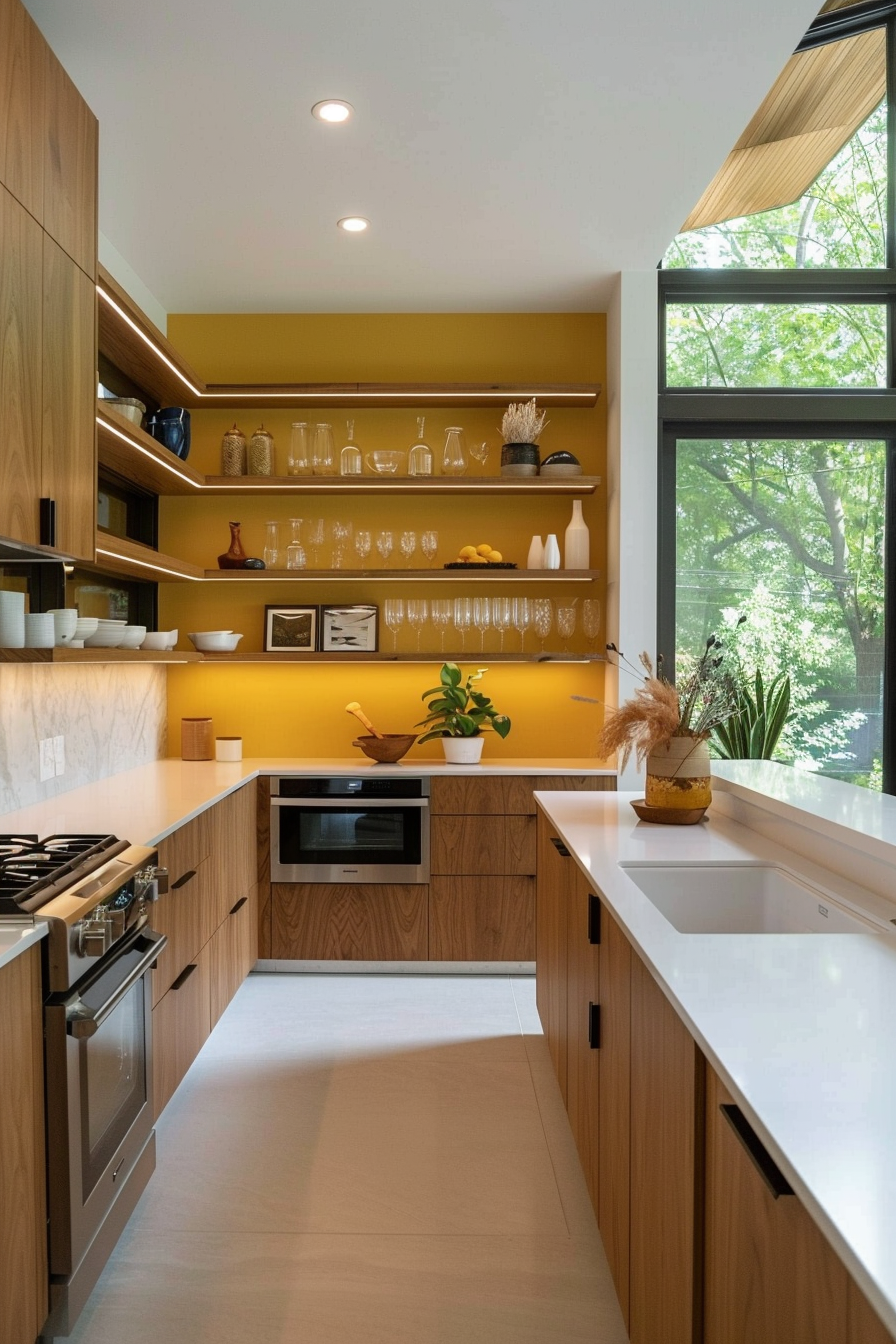
A hallmark of mid-century modern design is its emphasis on clean lines and simplicity. This style favors uncluttered, sleek forms that contribute to a sense of openness and order. When planning your remodel, opt for cabinetry, countertops, and furniture with minimalistic silhouettes and a streamlined appearance. This approach not only enhances the visual appeal of your kitchen but also maximizes functionality and efficiency.
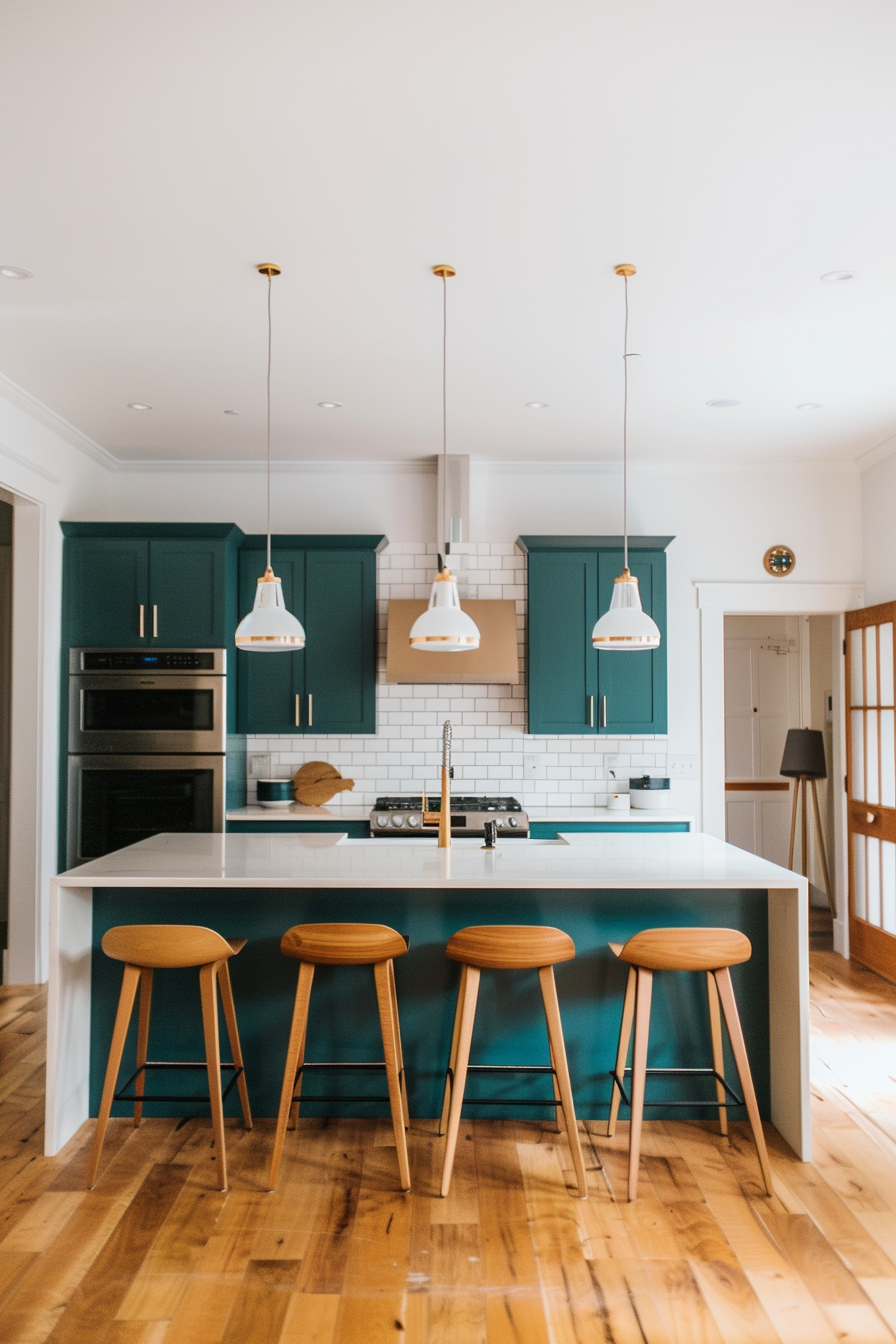
To further emphasize these clean lines, consider integrated or handleless cabinets that provide a seamless look. Open shelving can also work well, offering both storage and display space without the bulk of traditional cabinetry. Keep the countertops clear of excess clutter to maintain the minimalist vibe, allowing the natural beauty of your materials to shine through.
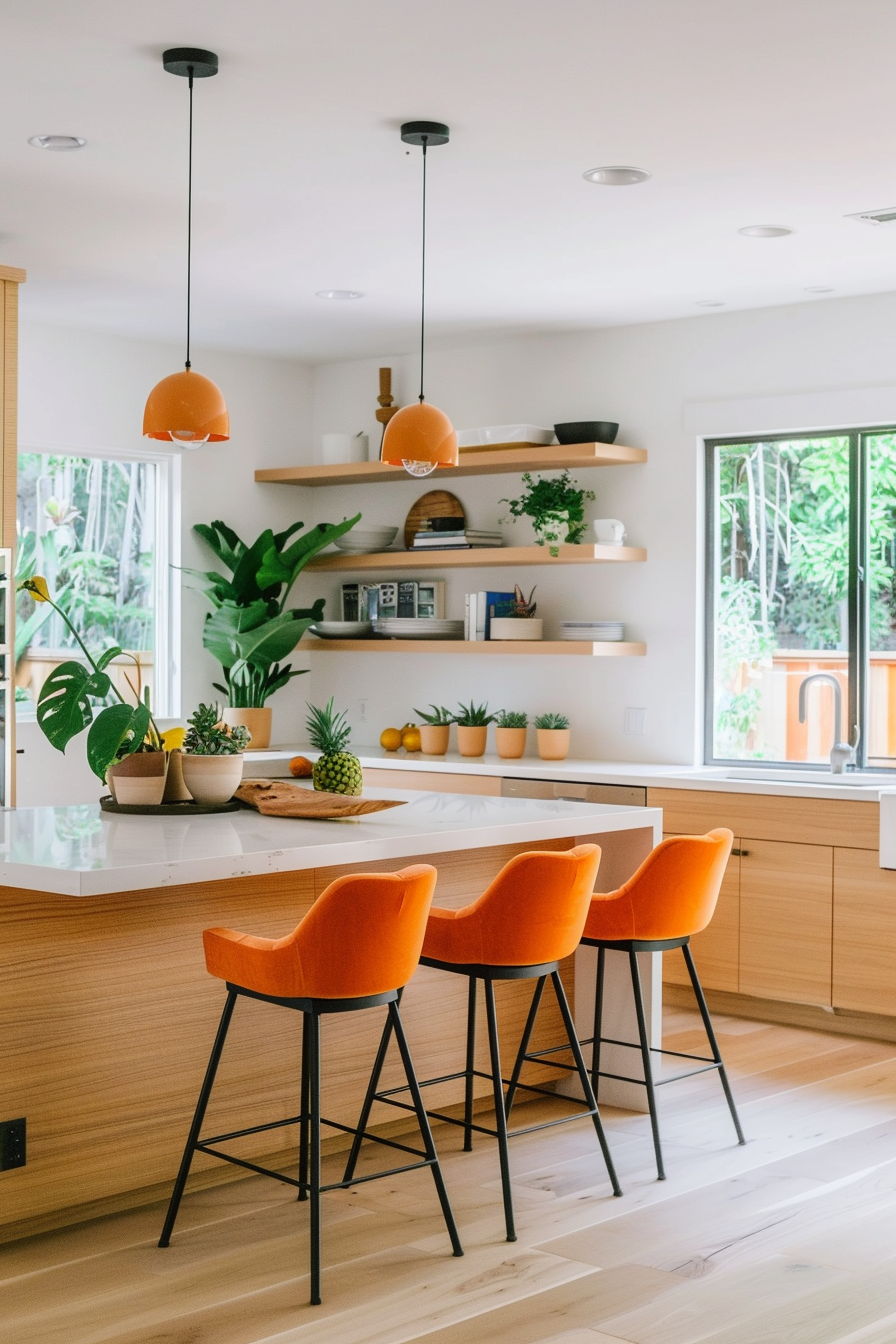
Color plays a crucial role in mid-century modern design. Stick to a neutral palette with pops of vibrant colors to create a striking contrast. Think white or light gray as your base, complemented by bold shades like mustard yellow, teal, or burnt orange. This combination brings both warmth and energy to your kitchen, making it feel inviting and lively.
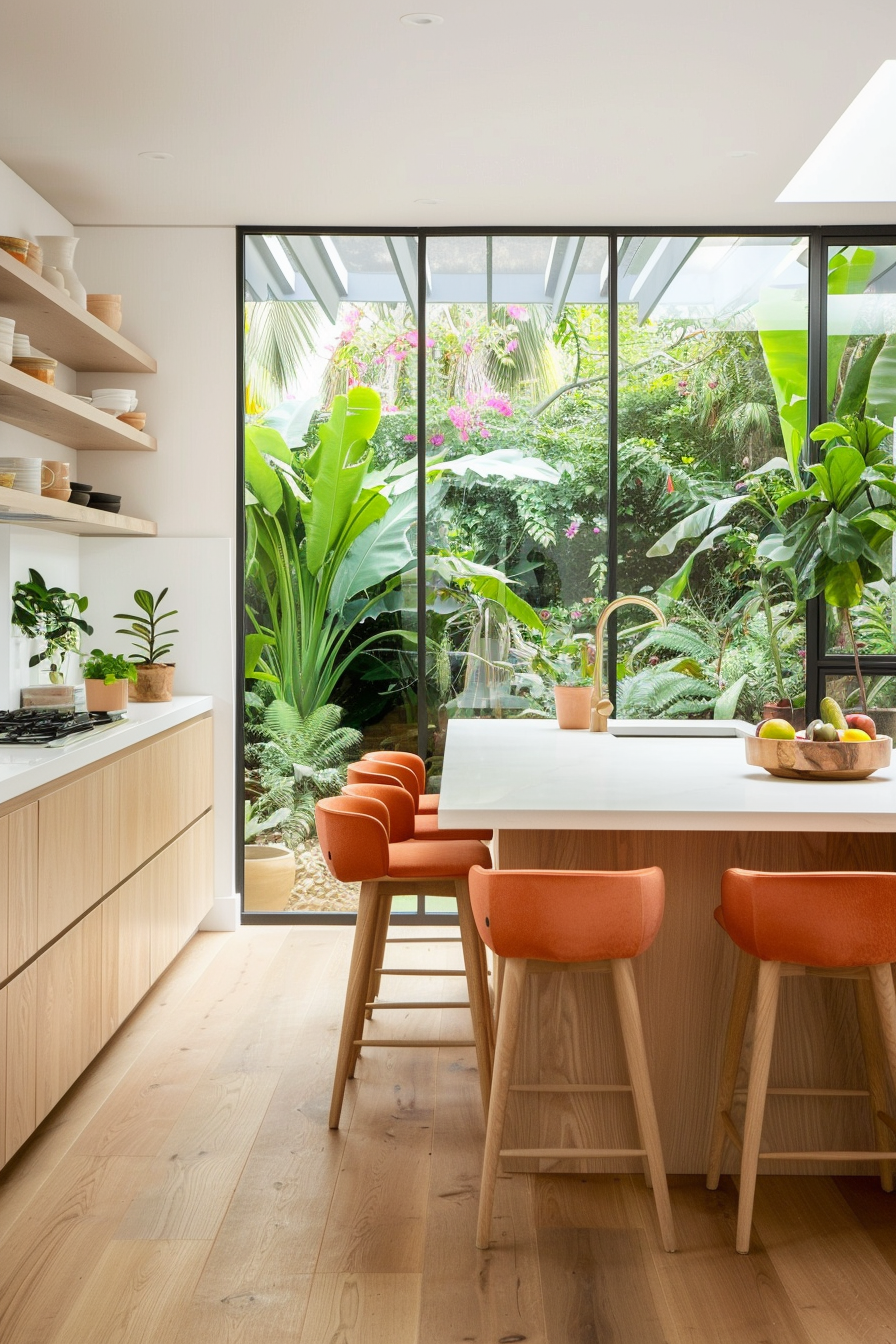
2. Opt for Geometric Backsplash Patterns
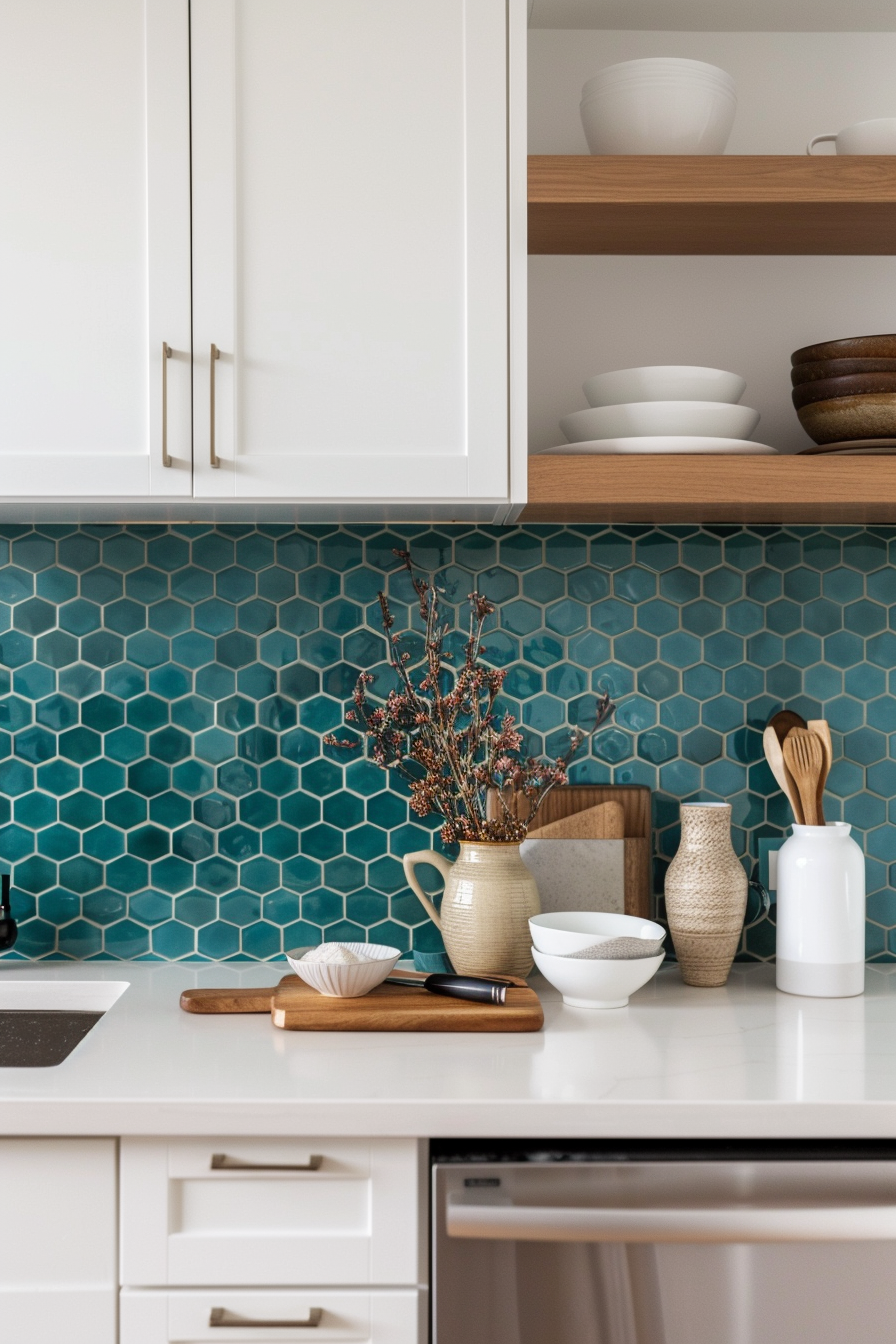
The backsplash is a perfect place to inject some personality into your mid-century modern kitchen. Geometric patterns, a staple of this design era, add visual interest and a retro vibe. Consider bold, eye-catching tiles in shapes like hexagons, diamonds, or chevrons. These patterns can be both striking and functional, making your kitchen an inviting and inspiring space.
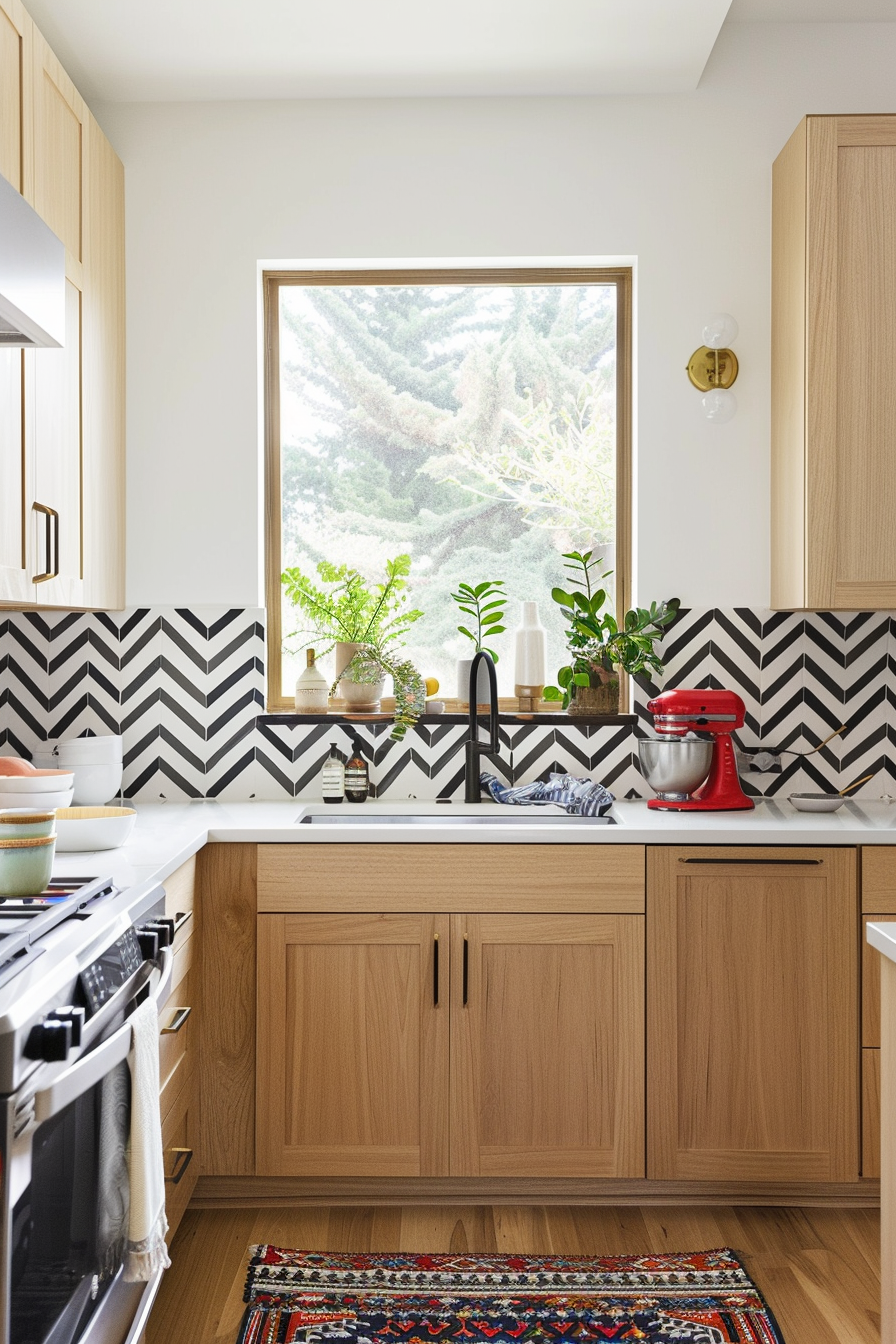
When choosing your backsplash tiles, think about color and texture. Glossy finishes reflect light and can make a space feel larger and more open, while matte finishes provide a more subtle and sophisticated look. You could go for classic black and white patterns for a timeless appeal or introduce vibrant hues to make a bold statement. The key is to find a balance that complements the rest of your kitchen decor.
Pair your geometric backsplash with simple, streamlined cabinetry and countertops to prevent the space from feeling too busy. This approach allows the backsplash to stand out as a focal point while maintaining the overall minimalist ethos of mid-century modern design. Ensure your grout lines are clean and precise, as this attention to detail enhances the sharpness of the geometric patterns.
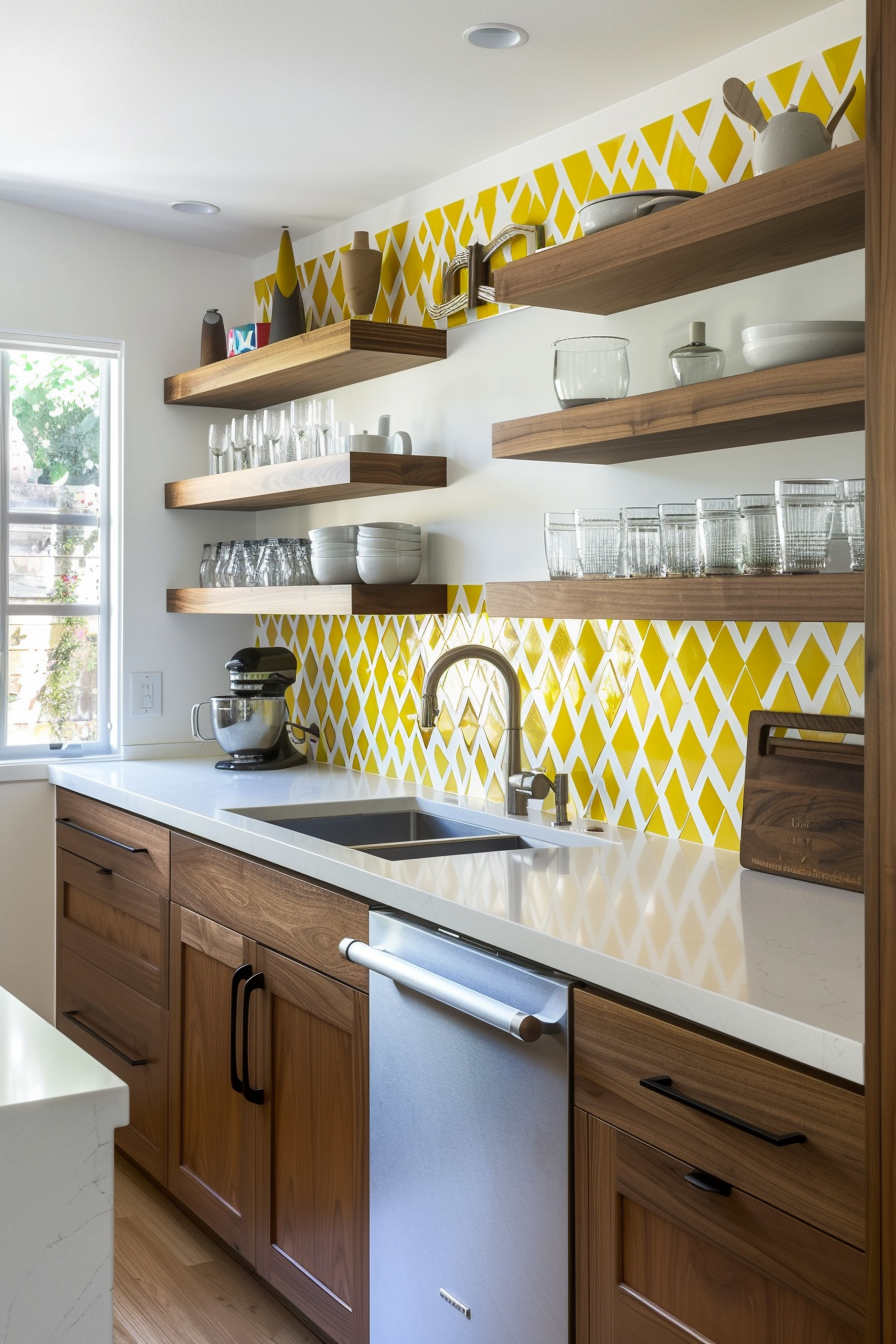
3. Highlight Your Cabinets with Contrasting Finishes
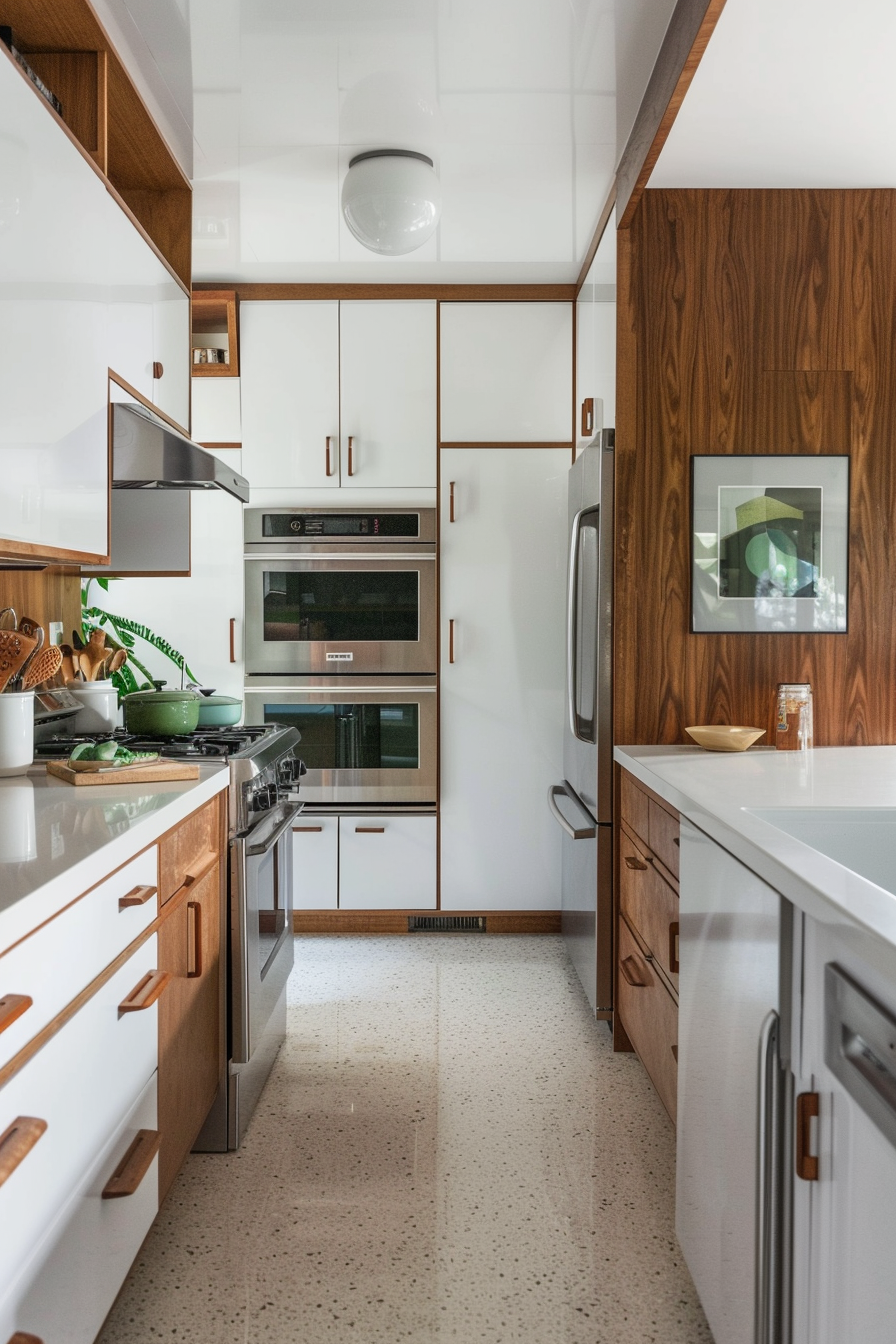
Cabinetry in a mid-century modern kitchen often serves as a canvas for experimenting with color and texture. One effective strategy is to use contrasting finishes to create visual interest. For instance, combine glossy upper cabinets in a bright color with matte lower cabinets in a neutral tone. This approach not only adds depth to your kitchen but also reinforces the clean lines and geometric focus of mid-century design.
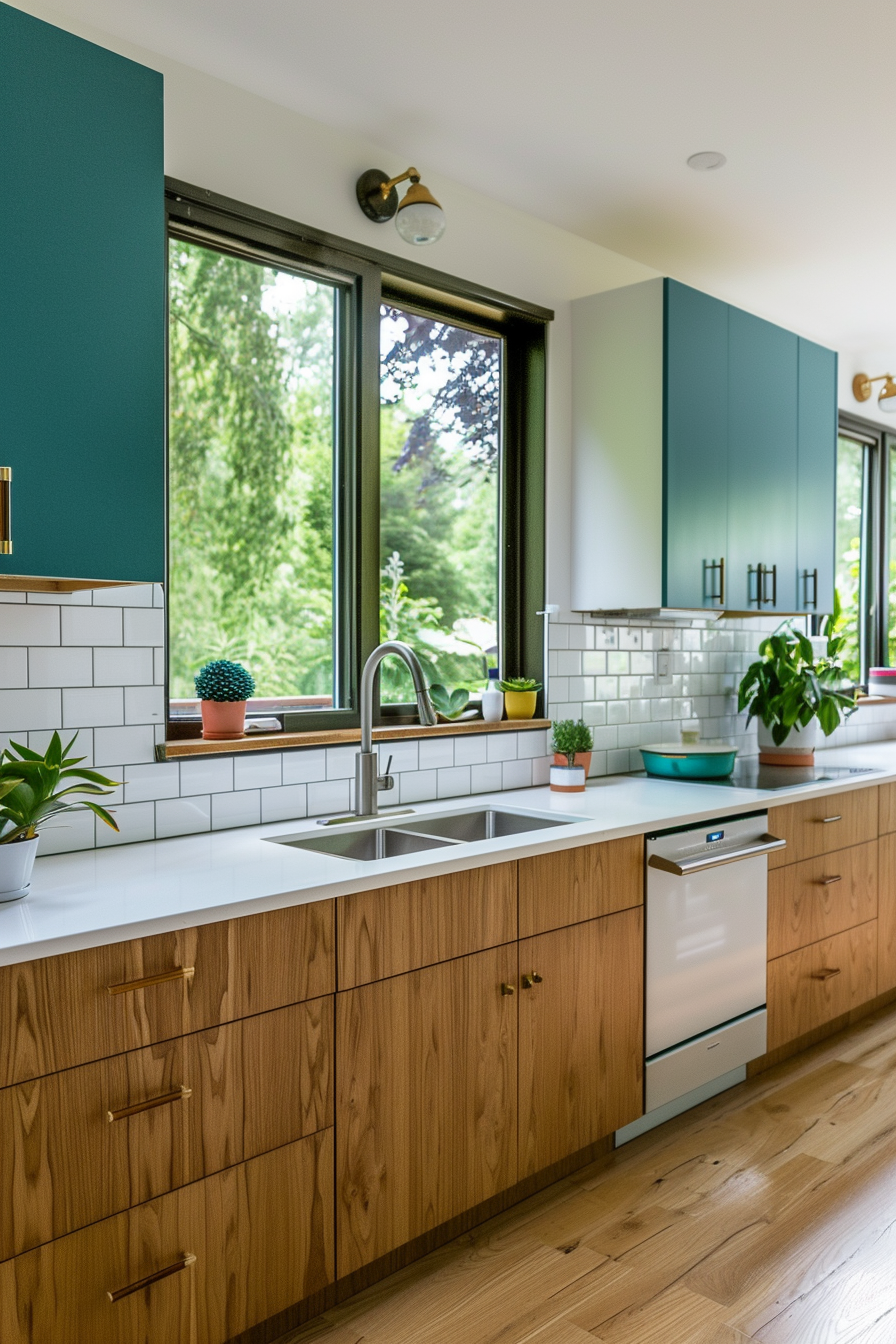
Consider integrating materials such as walnut or teak for a rich, natural look that contrasts beautifully with sleek, painted finishes. These wood tones bring warmth and an organic feel to your kitchen, complementing the otherwise minimalist aesthetic. Alternatively, laminate finishes in bold hues can provide a more vibrant and playful touch, staying true to the era’s love for color.
Don’t shy away from using cabinet fronts to introduce patterns or textures. Ribbed or fluted cabinet doors can add a subtle yet sophisticated element to your design. Mixing and matching these textures while maintaining a cohesive color scheme will help you achieve that quintessential mid-century modern vibe without overwhelming the space.
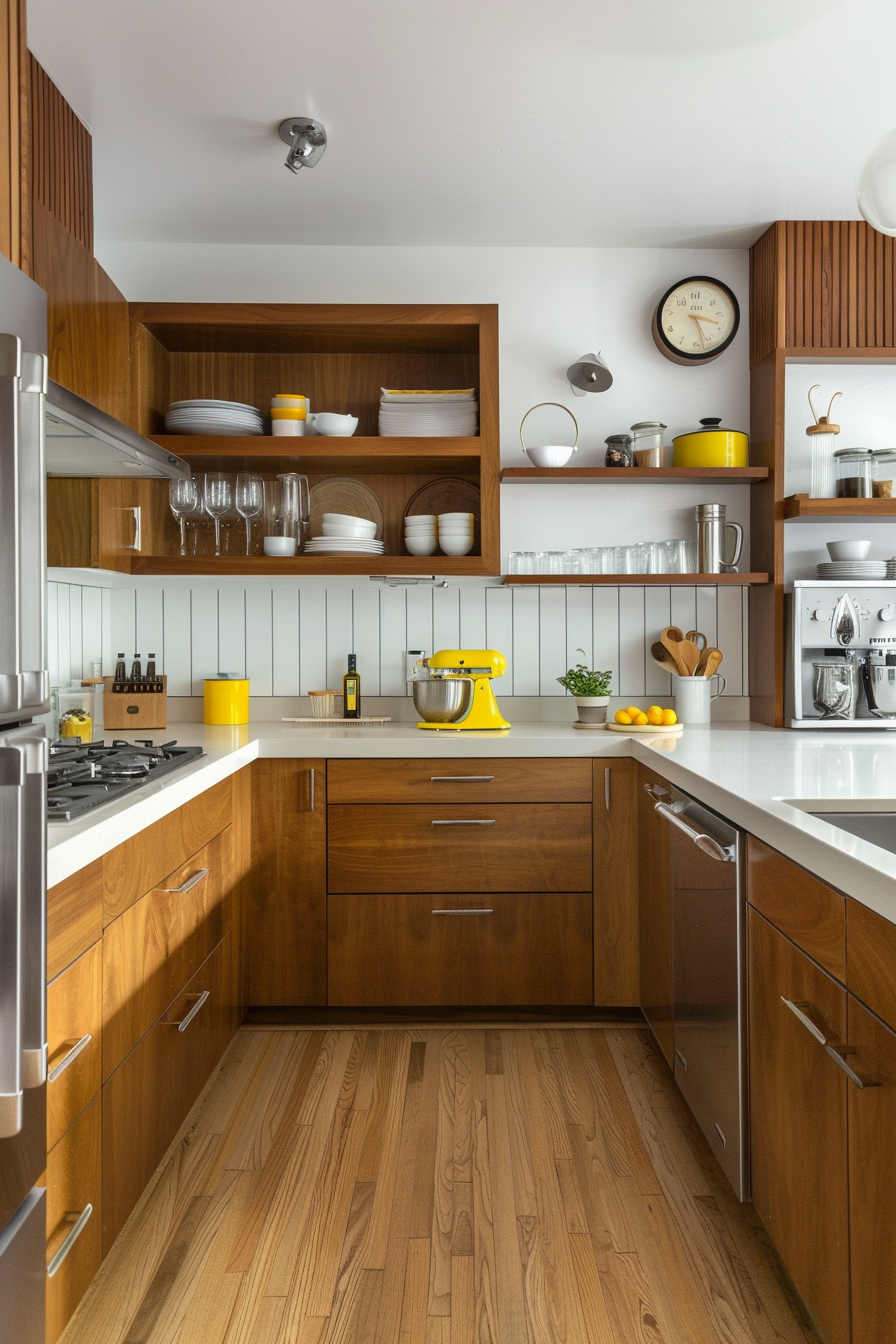
4. Integrate a Functional and Stylish Kitchen Island
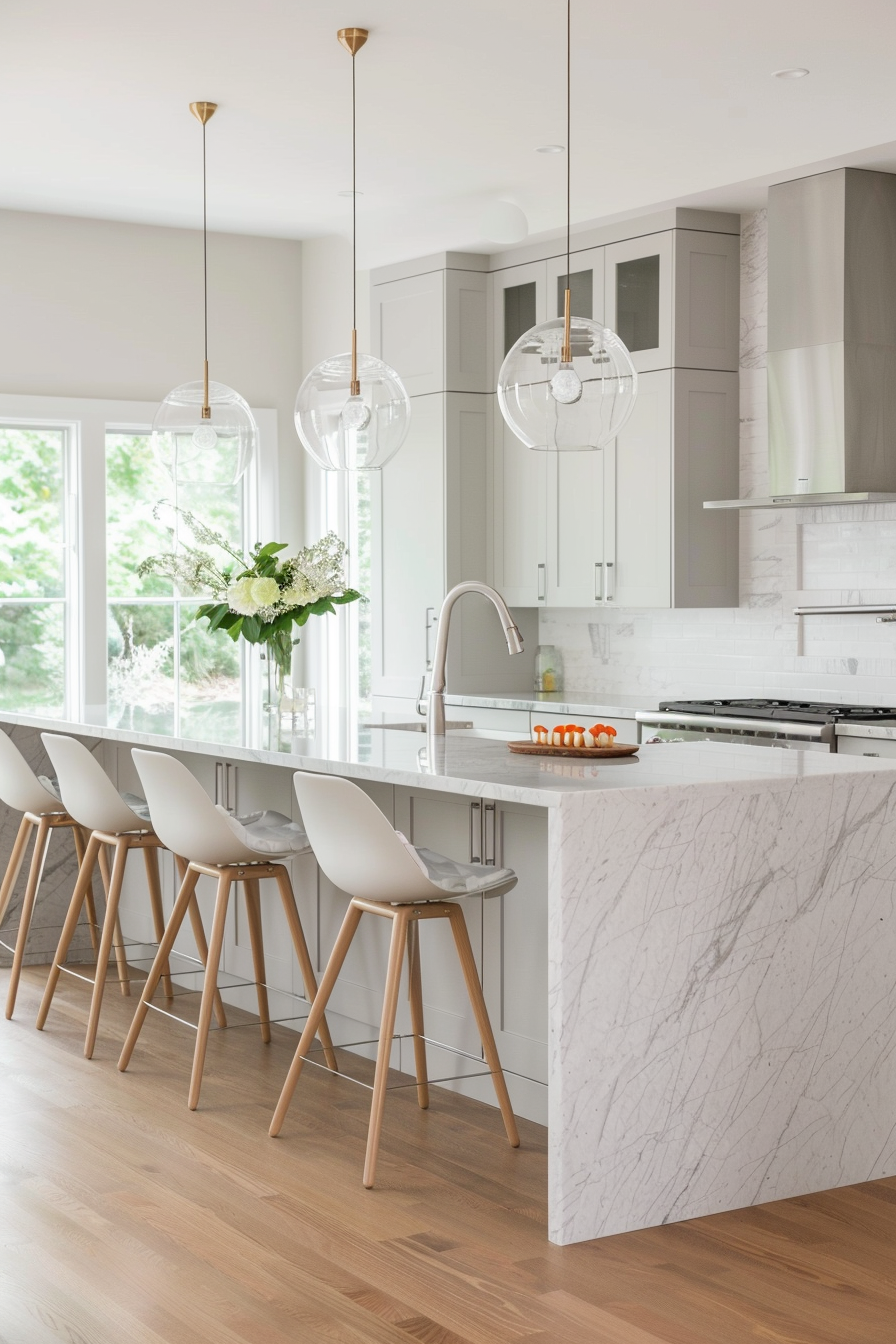
A kitchen island is not only a practical addition for extra workspace and storage but also a centerpiece that can enhance your mid-century modern design. Opt for an island with clean lines and a sleek surface to maintain the minimalist aesthetic. Consider incorporating materials like marble or quartz for a luxurious touch, or go for a laminate finish that echoes the retro vibe.
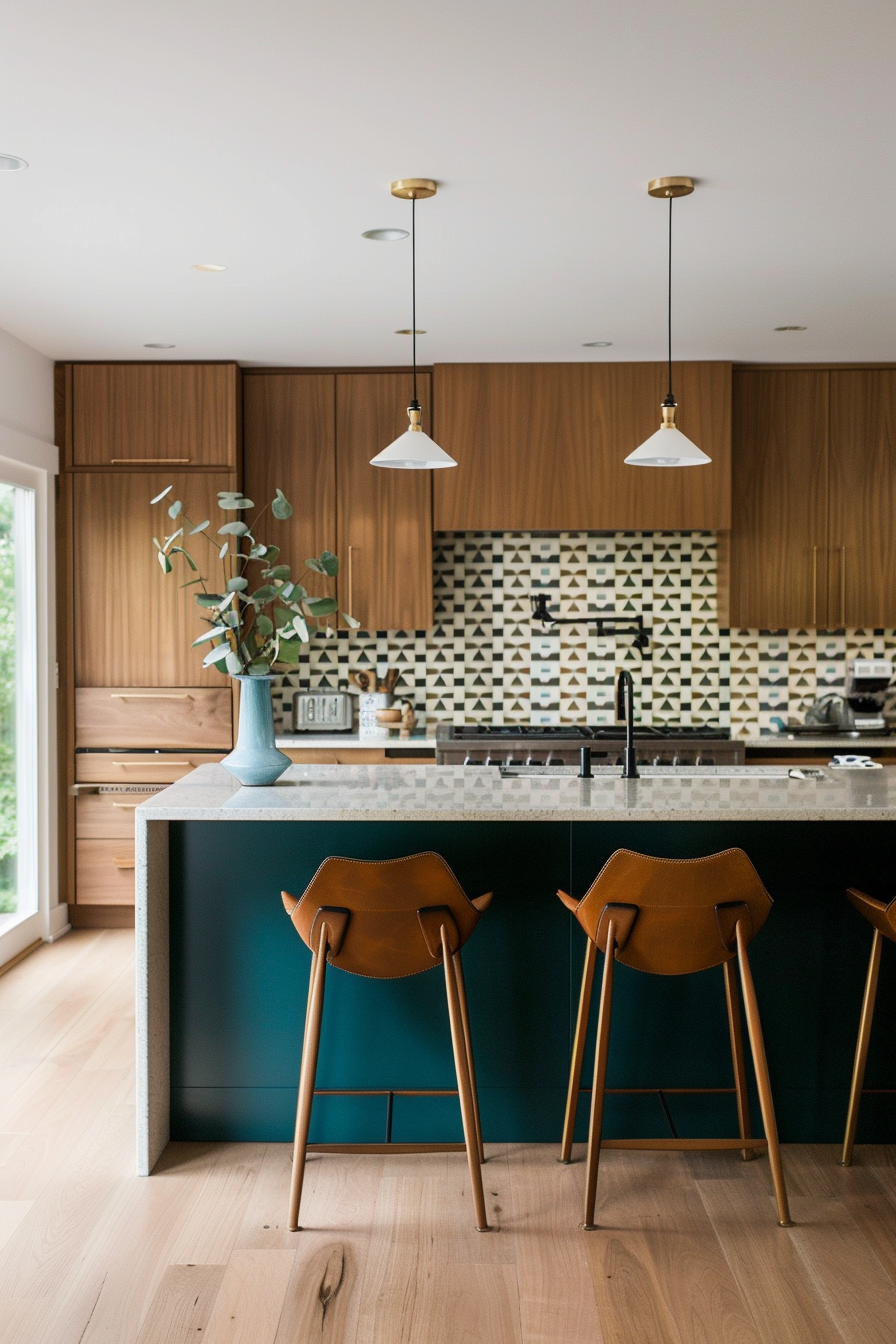
To make your island a true focal point, think about adding a splash of color or a unique design feature. A bold, contrasting color on the island can provide an eye-catching element that stands out against a more neutral kitchen backdrop. Alternatively, a waterfall countertop, where the surface material extends down the sides of the island, adds a touch of modern sophistication.
Functionality is key with kitchen islands. Incorporate built-in storage solutions like deep drawers or cabinets to keep your kitchen organized and clutter-free. If space allows, consider adding seating to your island to create a casual dining or entertaining area. Choose stools with simple, angular lines and upholstered in materials that complement your overall color scheme.
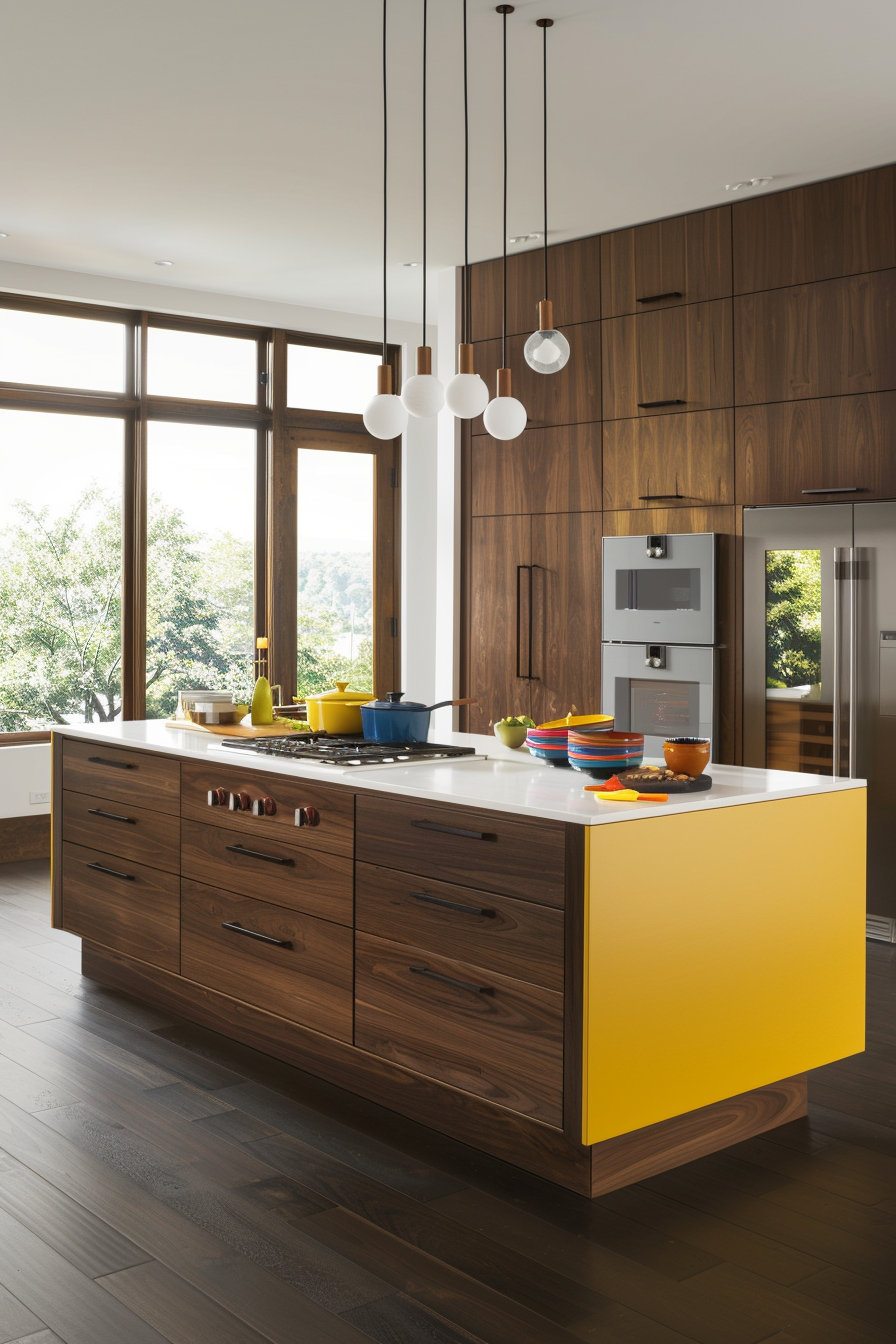
5. Choose a Retro-Inspired Kitchen Table
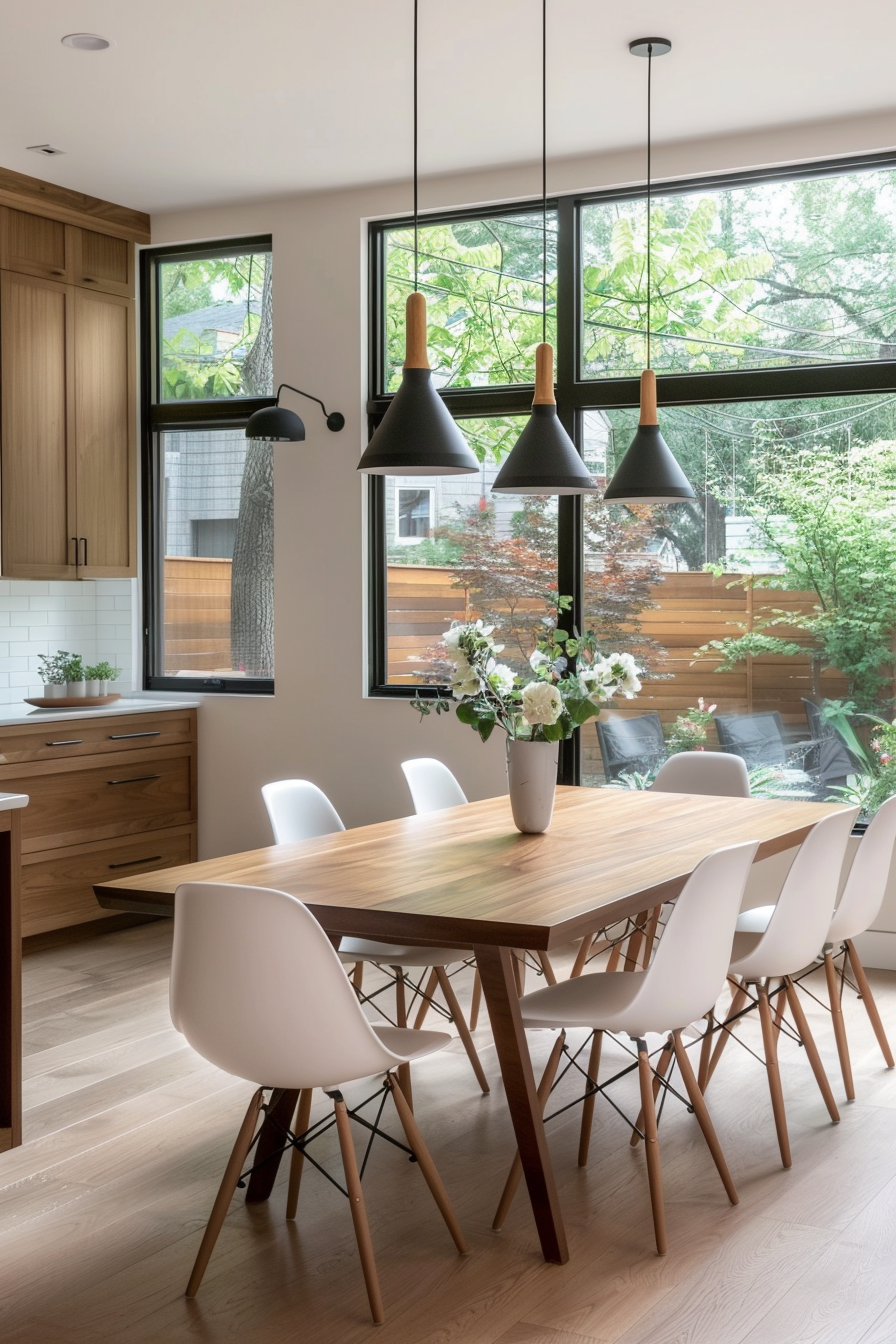
A mid-century modern kitchen table serves as both a functional dining space and a stylish design element. Look for tables with clean lines, tapered legs, and a minimalist form. Materials like wood or laminate are ideal, with natural wood finishes offering warmth and durability, while laminate surfaces provide a splash of color and a retro feel.
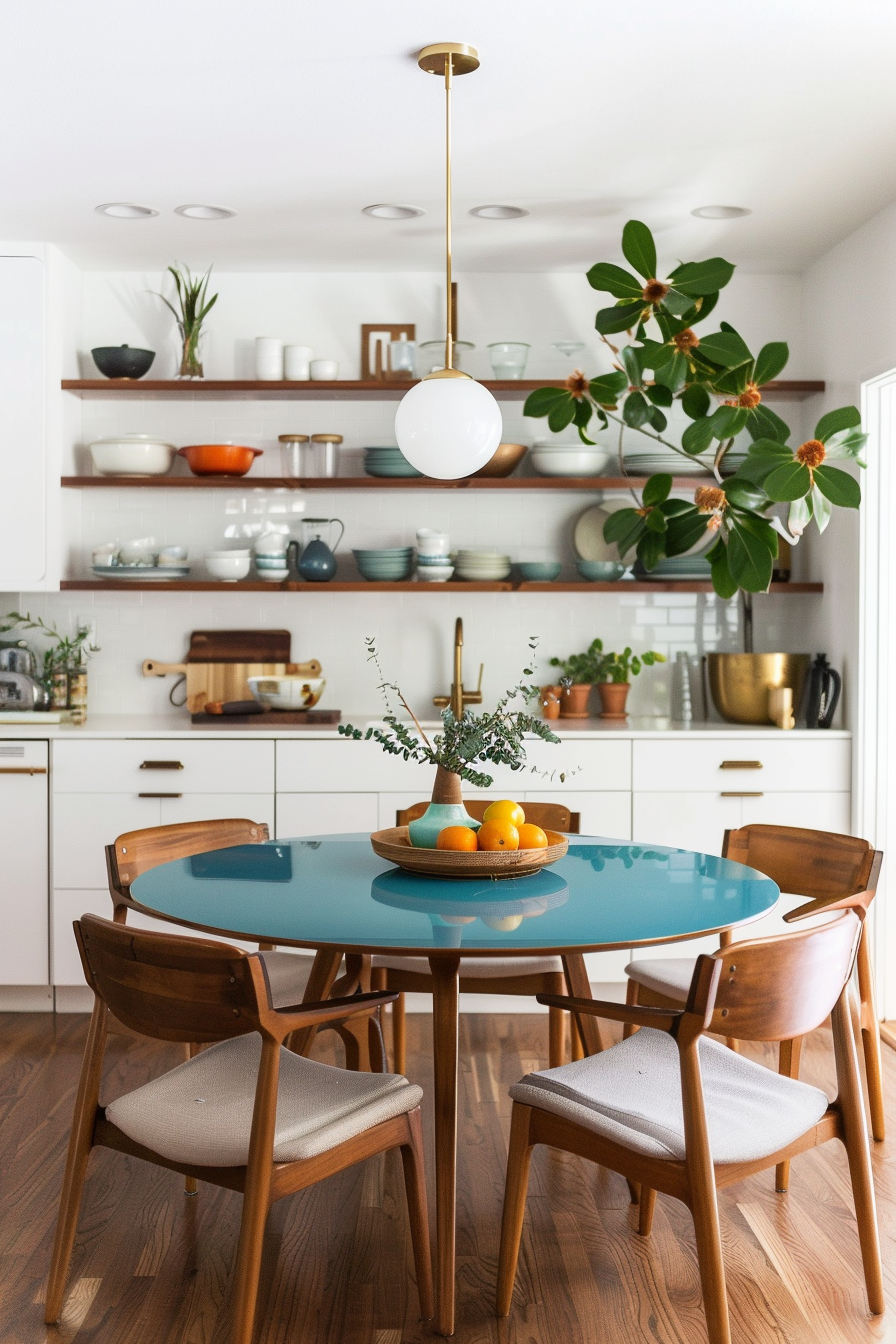
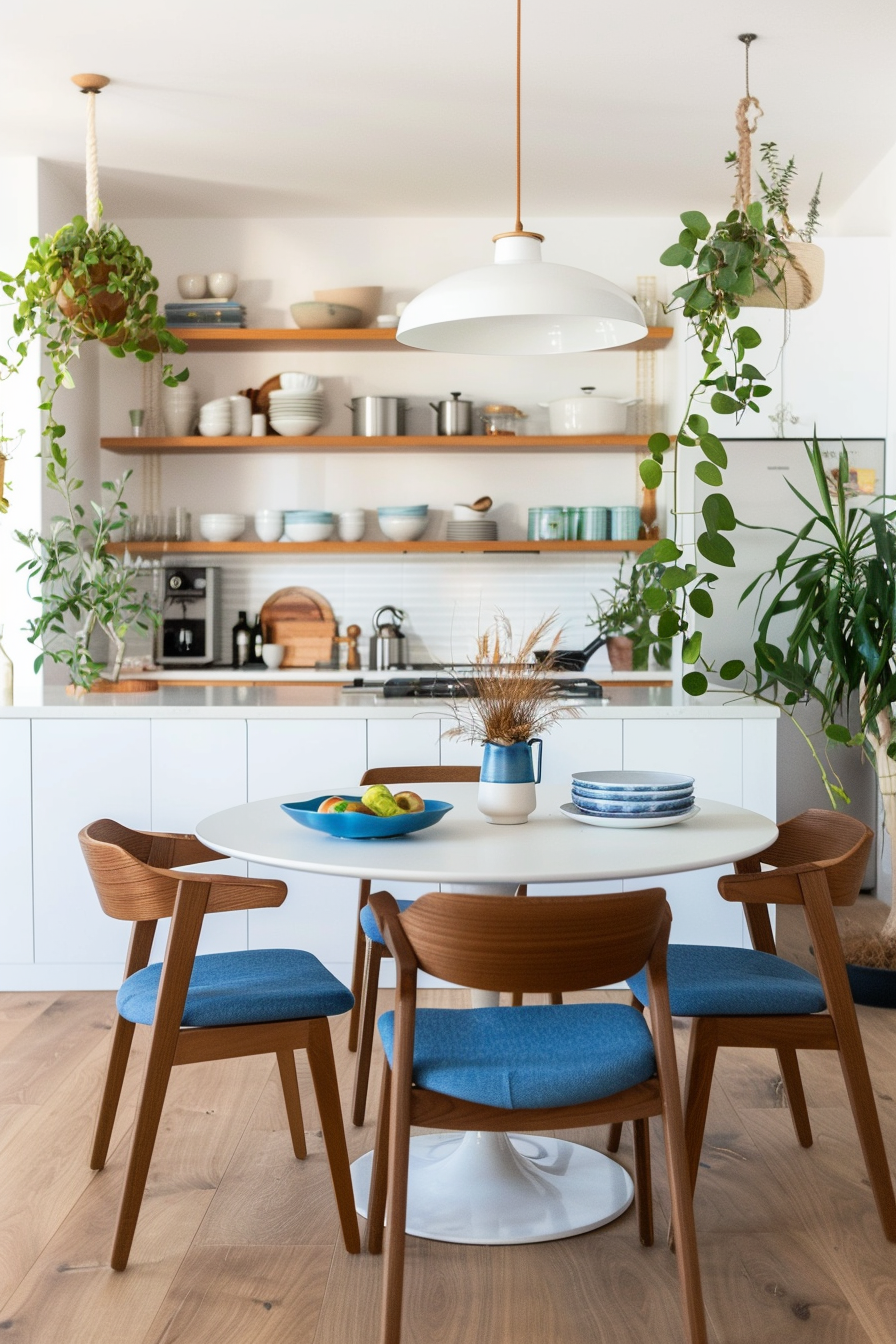
To complement the table, select chairs that enhance the mid-century aesthetic. Eames-style molded plastic chairs, for example, are iconic to this era and add a touch of timeless design. Alternatively, upholstered dining chairs with simple, angular lines can bring an additional layer of comfort and style to your dining area.
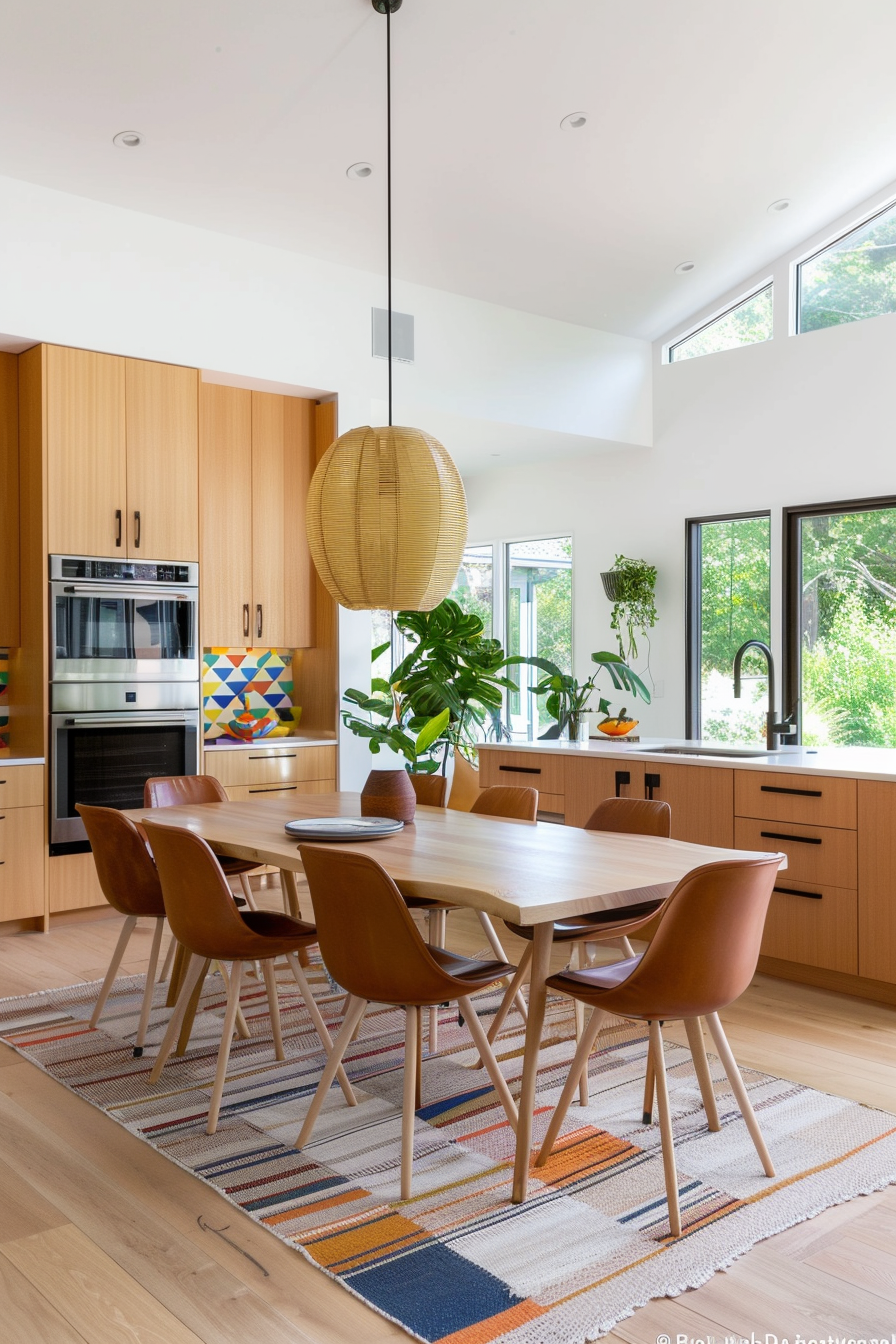
Consider the placement of your table within the kitchen. A well-placed table can serve as a central gathering point and enhance the flow of your space. If your kitchen is small, opt for a round or oval table to maximize seating and minimize space usage. In larger kitchens, a rectangular table can provide ample dining space without overwhelming the room.
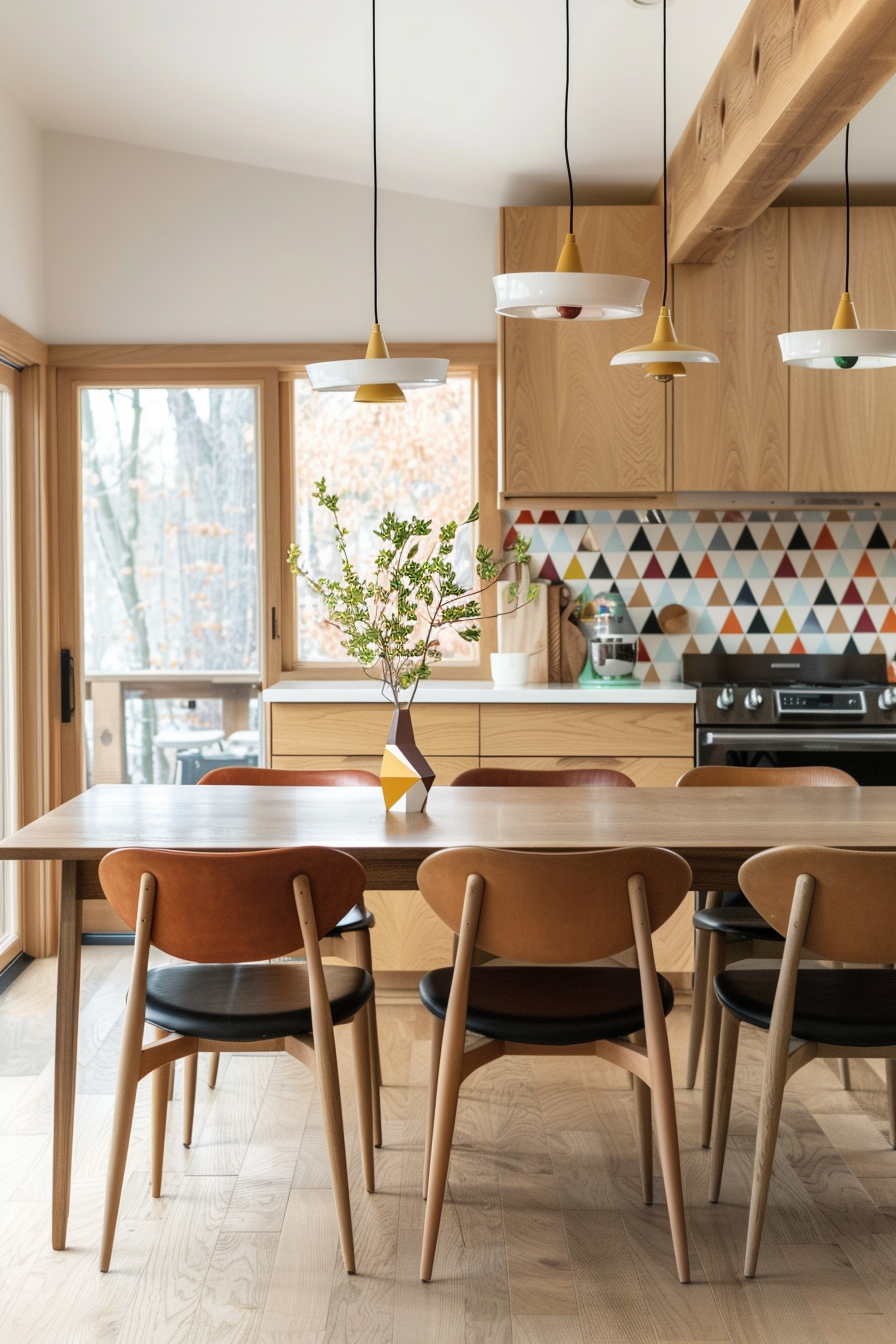
6. Incorporate Stylish and Functional Lighting
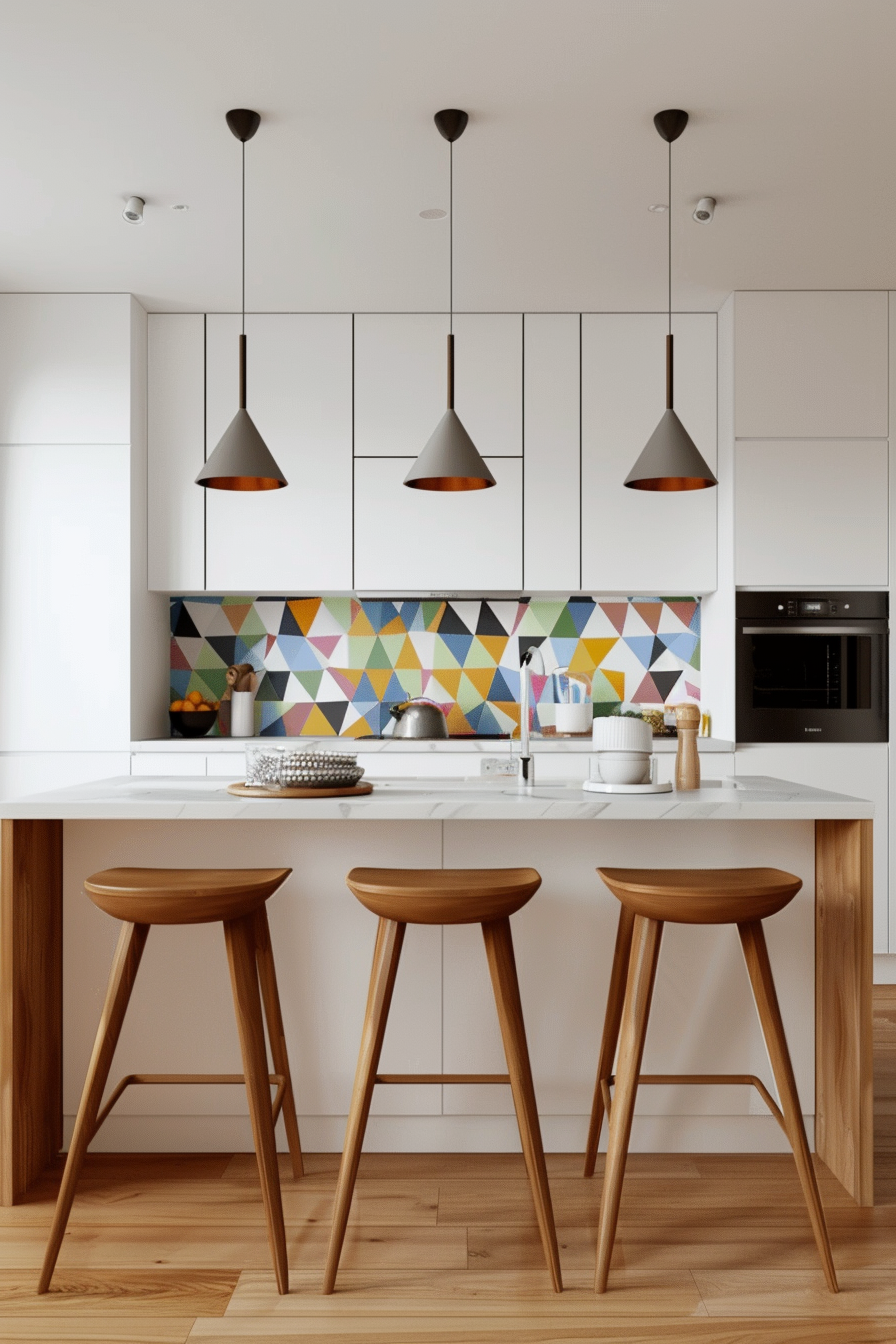
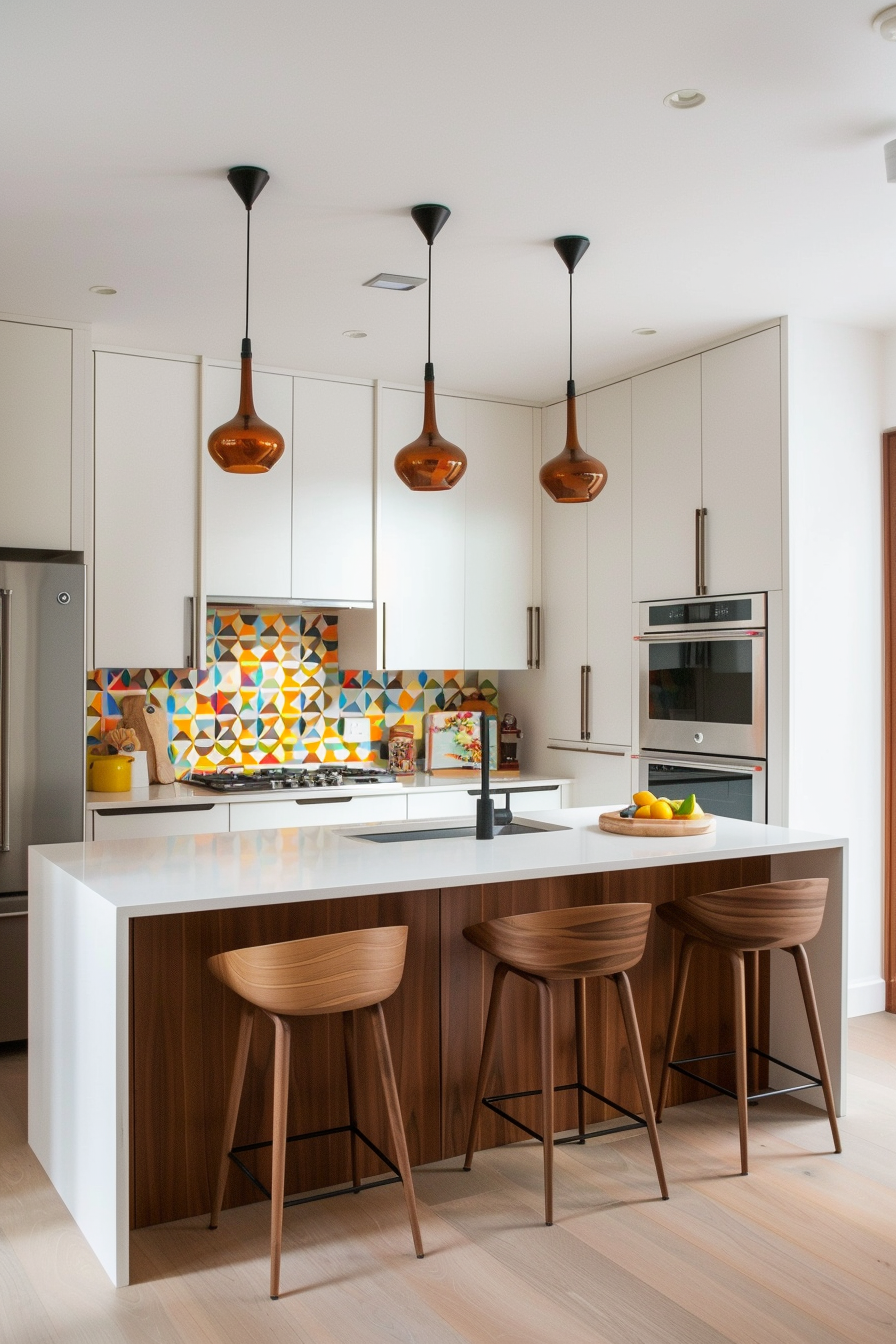
Lighting plays a crucial role in setting the tone for your mid-century modern kitchen. Pendant lights, with their sleek and sculptural designs, are a perfect choice for this style. Look for fixtures that feature clean lines, geometric shapes, and a mix of materials like metal and glass. These lights not only provide essential illumination but also serve as striking design elements.
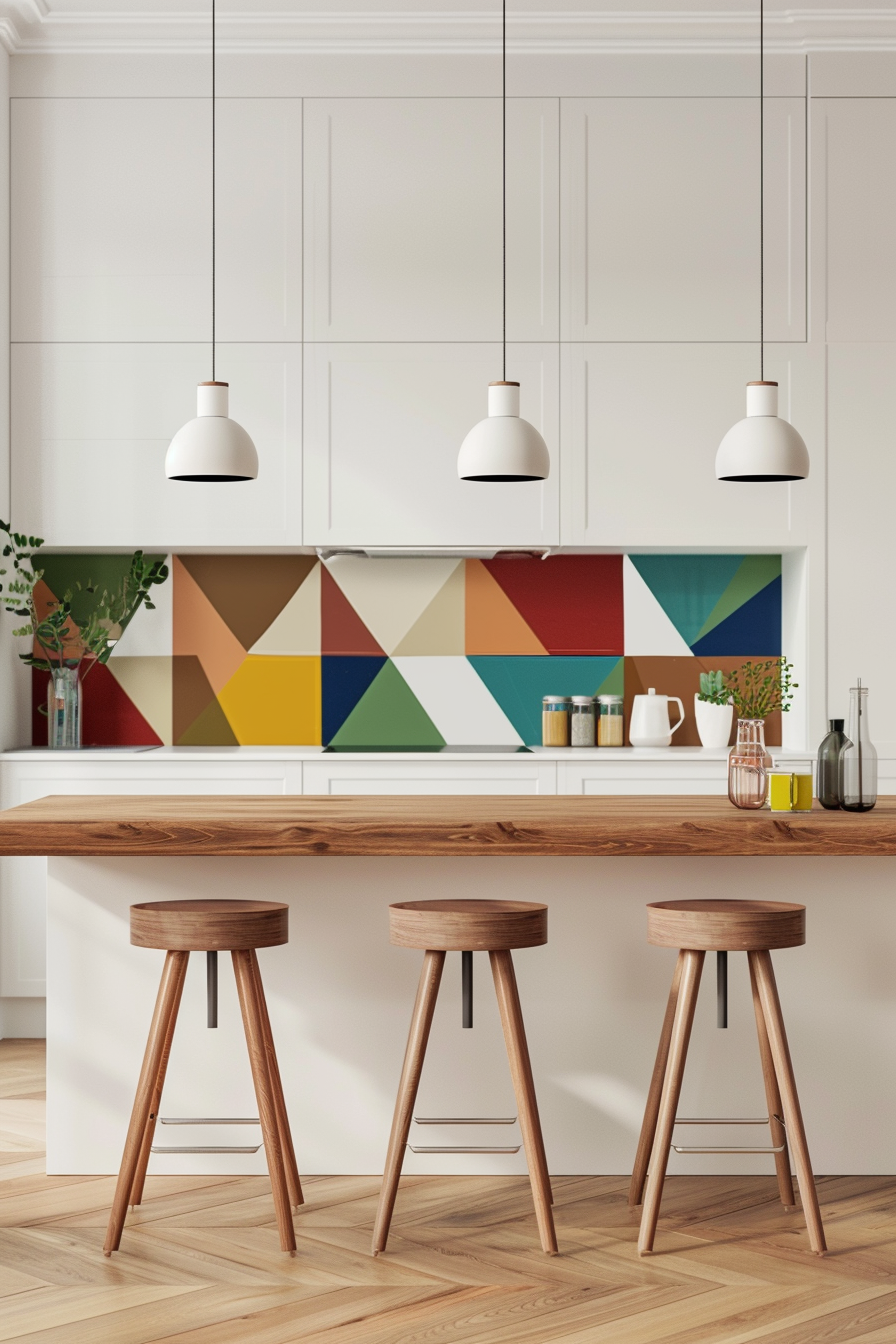
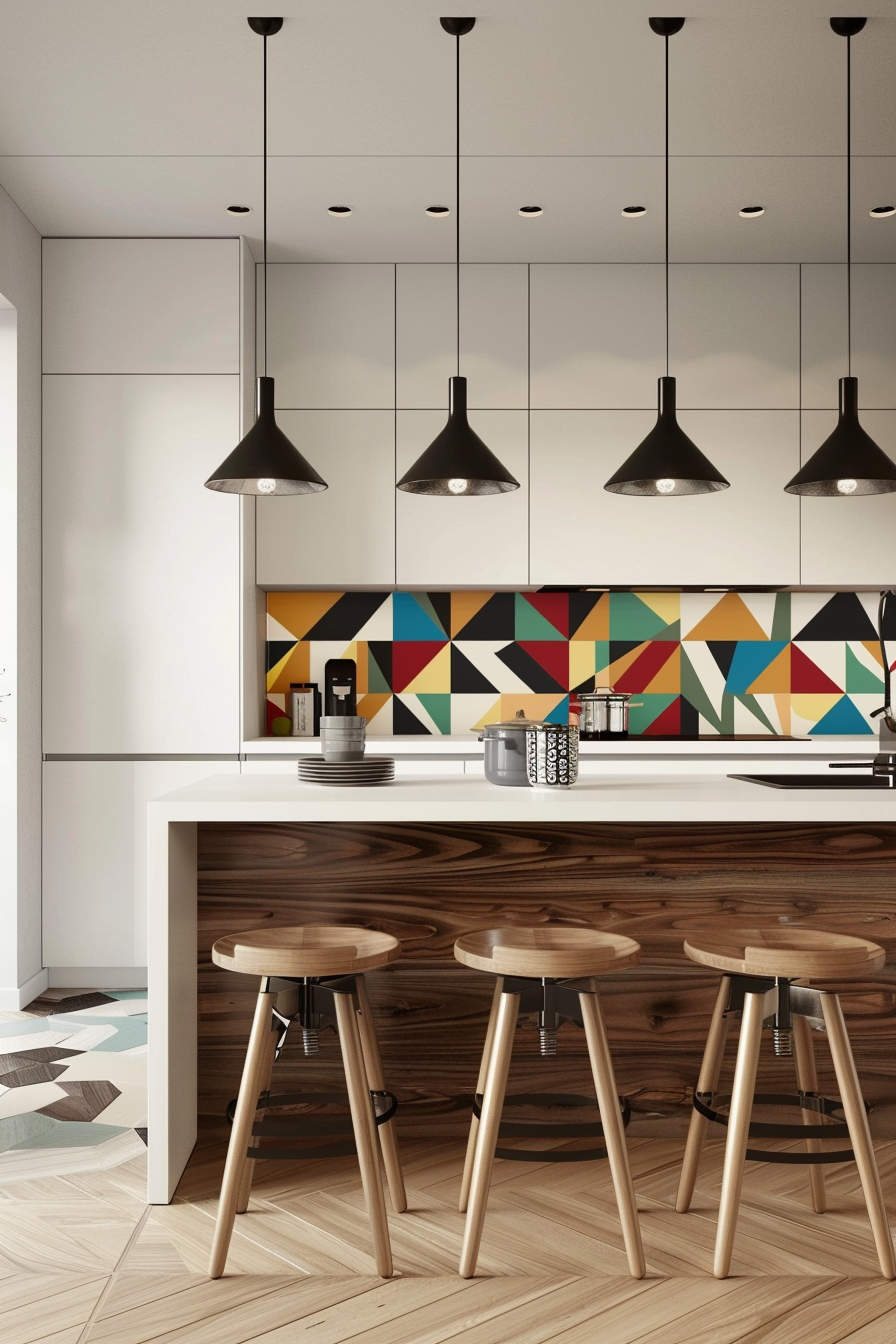
Consider grouping multiple pendant lights over key areas such as the kitchen island or dining table to create a balanced and visually appealing look. For task lighting, under-cabinet lights are both practical and discreet, ensuring that your workspaces are well-lit without disrupting the overall aesthetic. Recessed lighting can also be a good option for general illumination, offering a clean and unobtrusive solution.
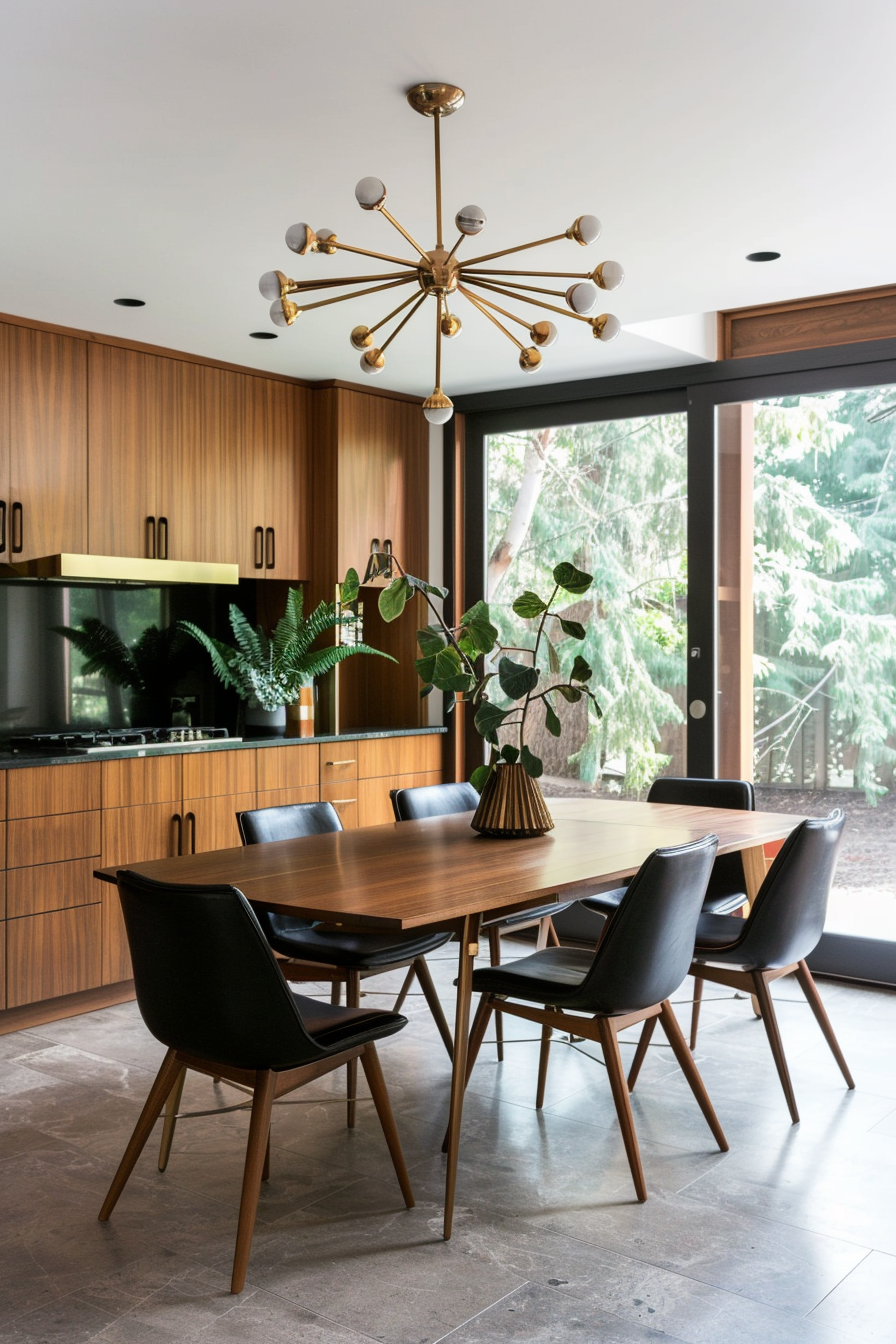
To add a touch of retro flair, choose light fixtures with a vintage-inspired design. Sputnik chandeliers, with their starburst shape and multiple arms, are iconic to the mid-century modern era and make a bold statement. Alternatively, globe pendant lights in frosted or clear glass can provide a softer, more diffuse light that complements the streamlined design of your kitchen.
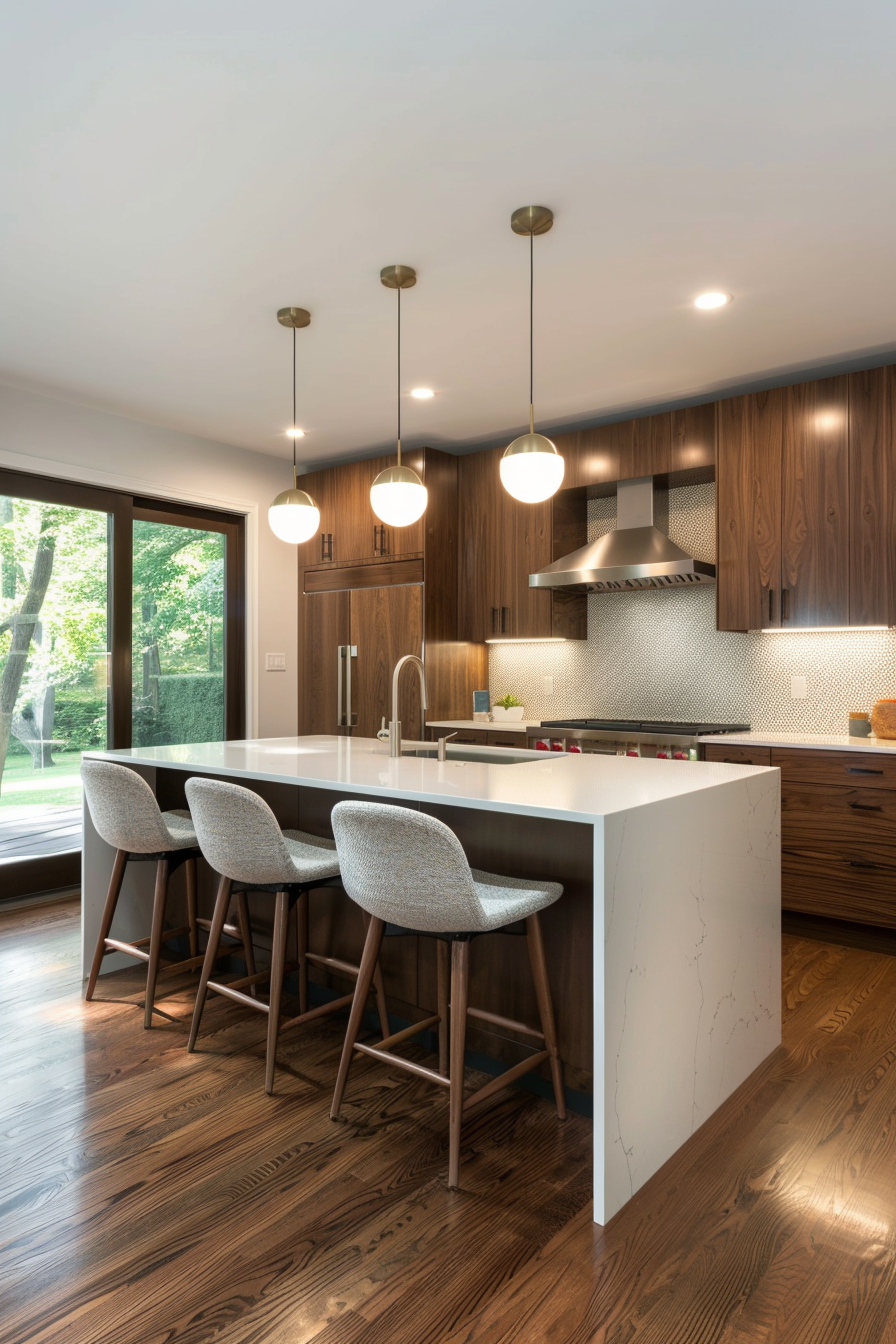
7. Create a Cozy Yet Open Feel for Small Kitchens
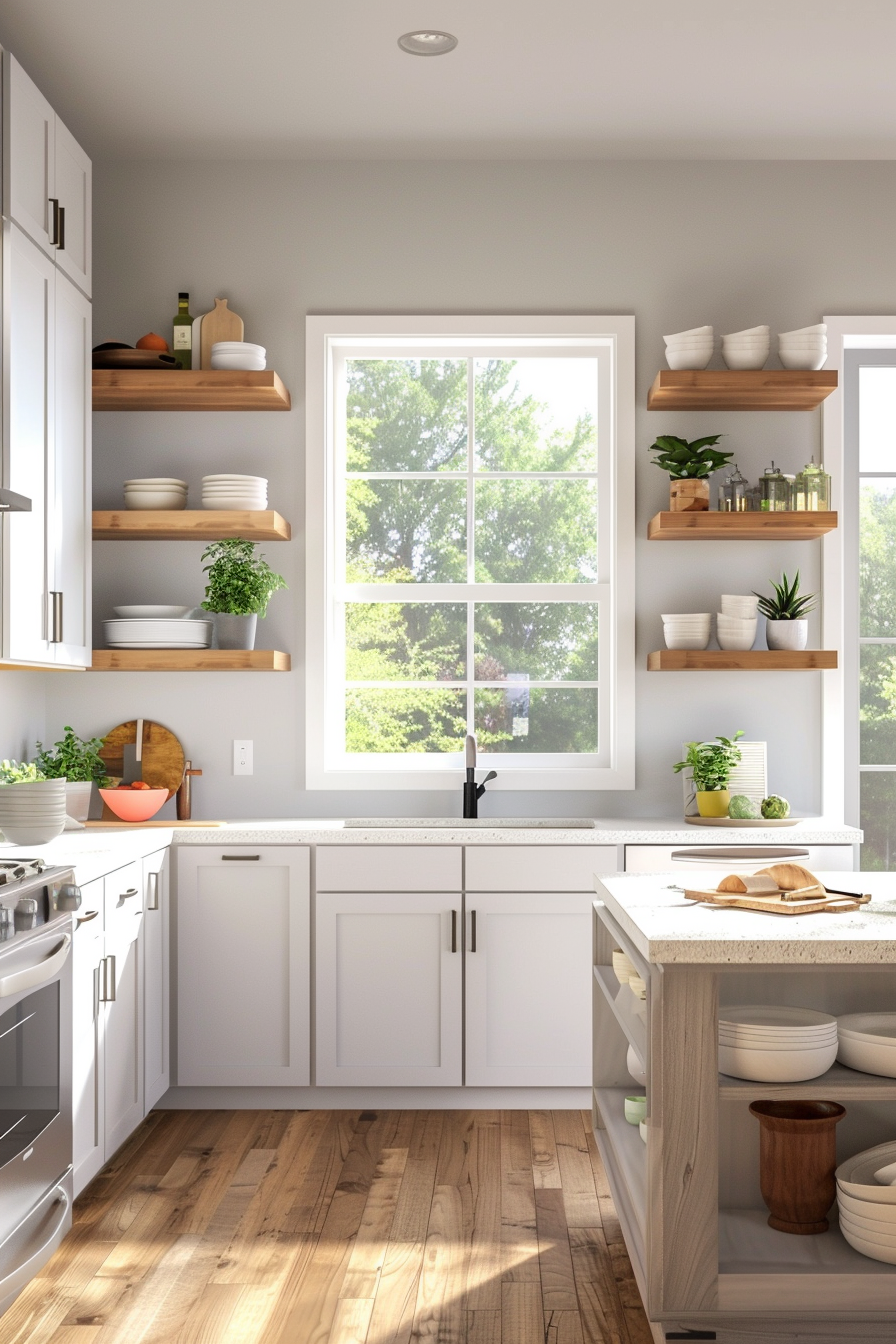
Designing a small kitchen with a mid-century modern flair can be challenging but immensely rewarding. Focus on creating a cozy yet open feel by maximizing the use of space and light. Opt for cabinetry with a high-gloss finish that reflects light and makes the room appear larger. Open shelving can also contribute to a sense of openness, providing storage without the bulk of closed cabinets.
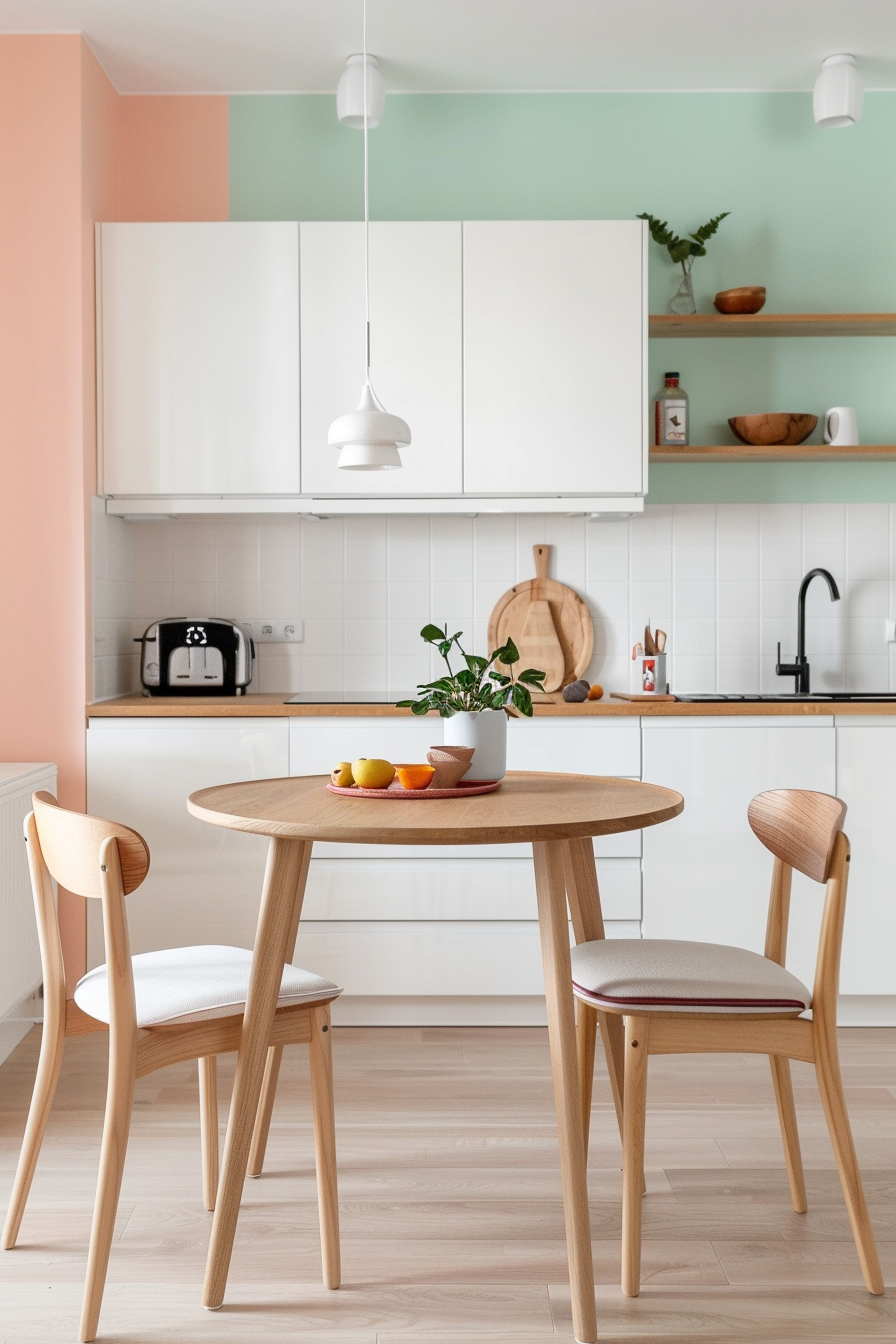
Incorporate light, neutral colors as your base palette to enhance the sense of space. Soft whites, light grays, and pastels work well in small kitchens, creating a bright and airy atmosphere. Introduce pops of color through small appliances, accessories, or a feature wall to add visual interest without overwhelming the room.
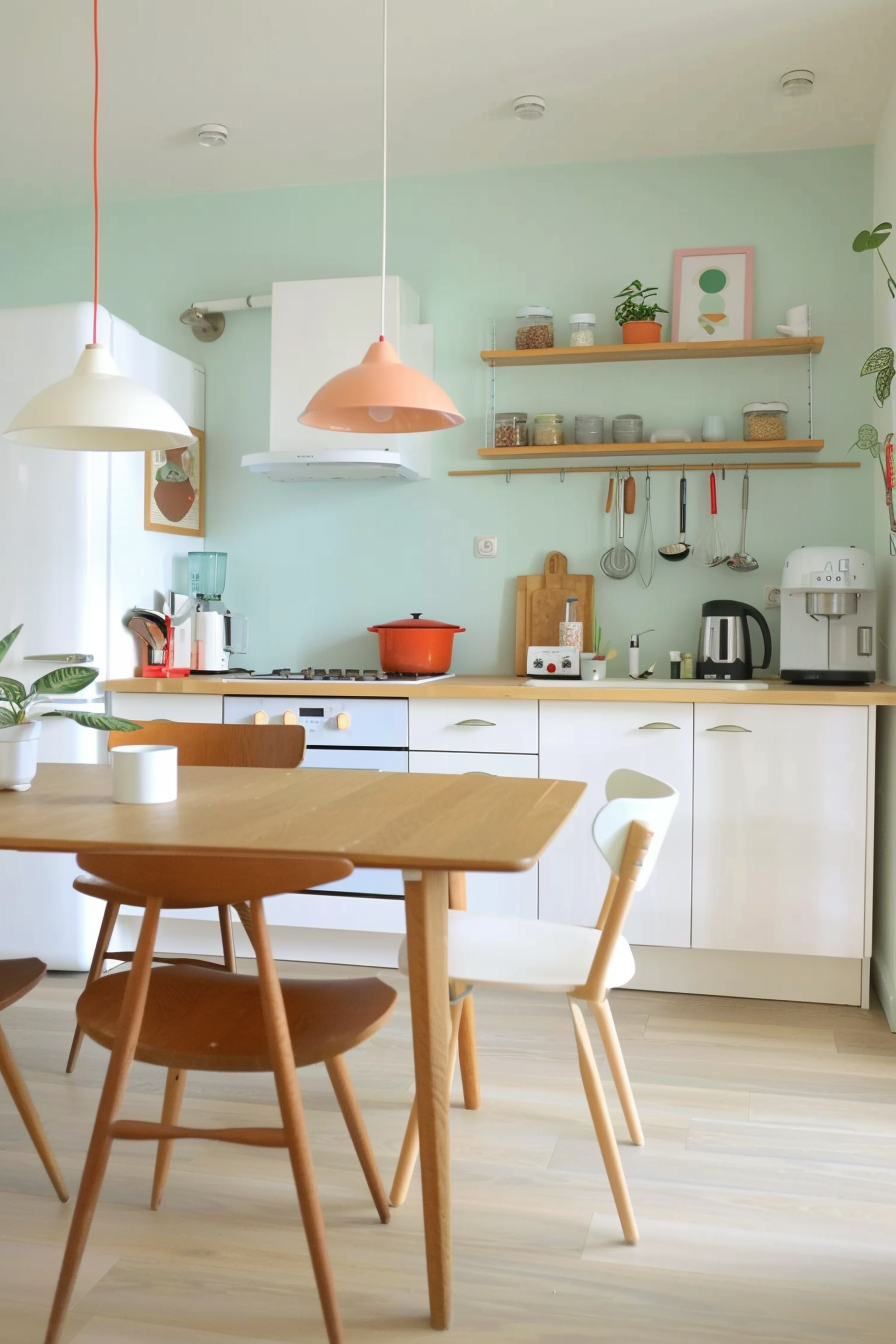
Choose furniture and fixtures that are scaled appropriately for smaller spaces. A compact kitchen island or a drop-leaf table can provide additional workspace without taking up too much room. For seating, consider stools or chairs that can be easily tucked away when not in use. The goal is to maintain functionality and style while making the most of the available space.
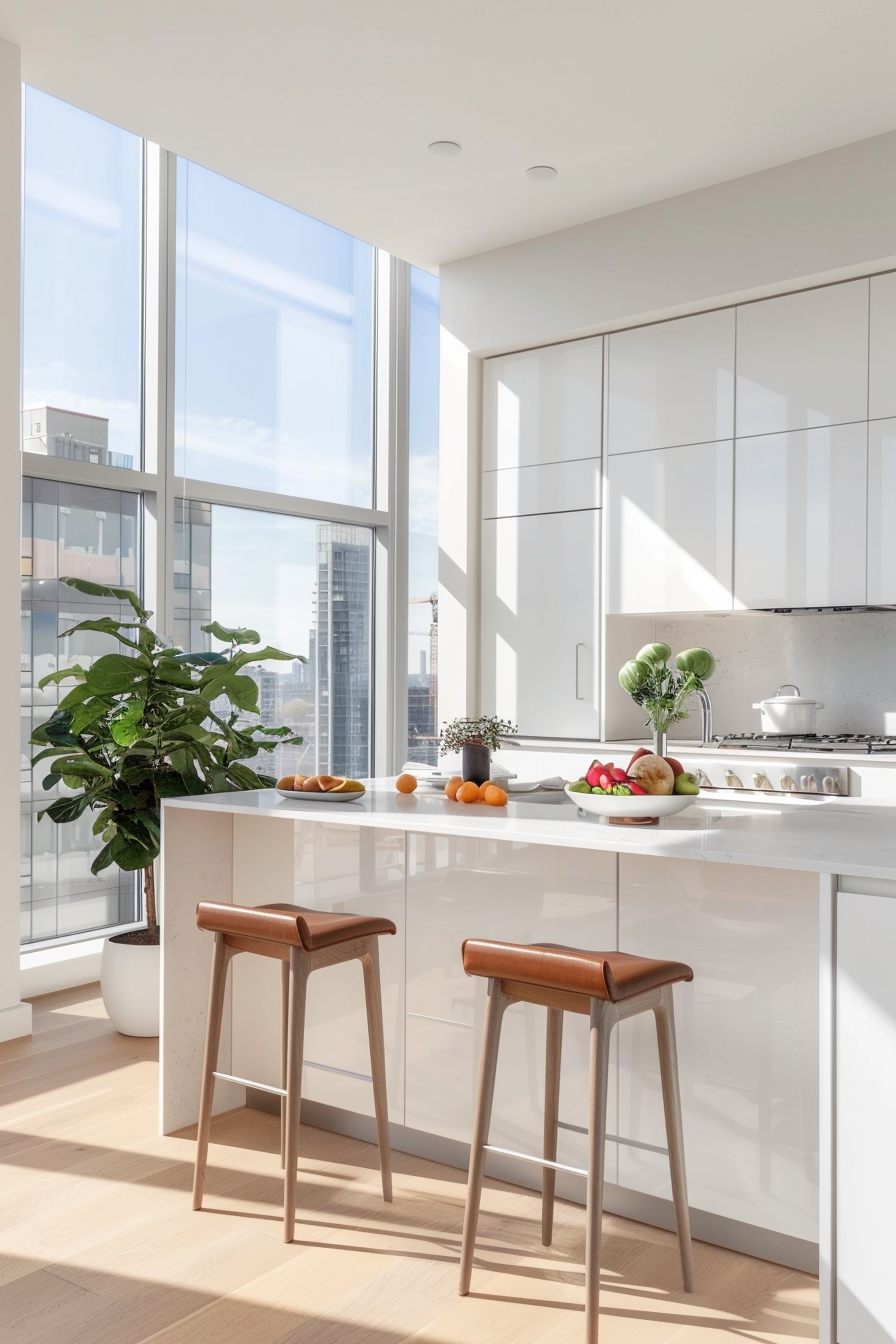
8. Introduce Green Elements for a Natural Touch
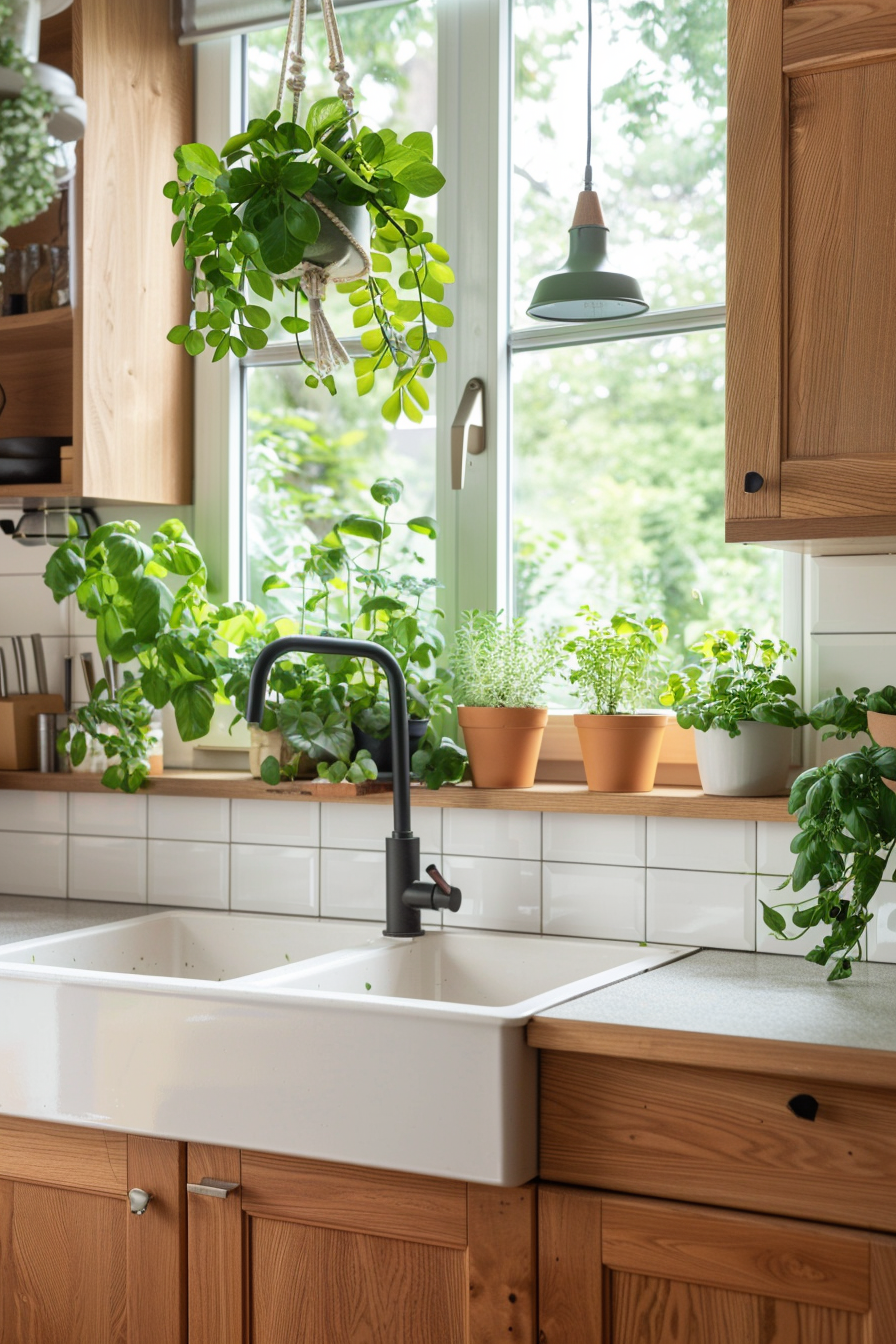
Bringing green elements into your mid-century modern kitchen can enhance the natural and organic feel of the space. Houseplants are a great way to add color, texture, and life to your kitchen. Consider potted herbs on the windowsill, hanging plants, or larger floor plants in stylish planters. These touches of greenery not only improve air quality but also create a welcoming and vibrant atmosphere.
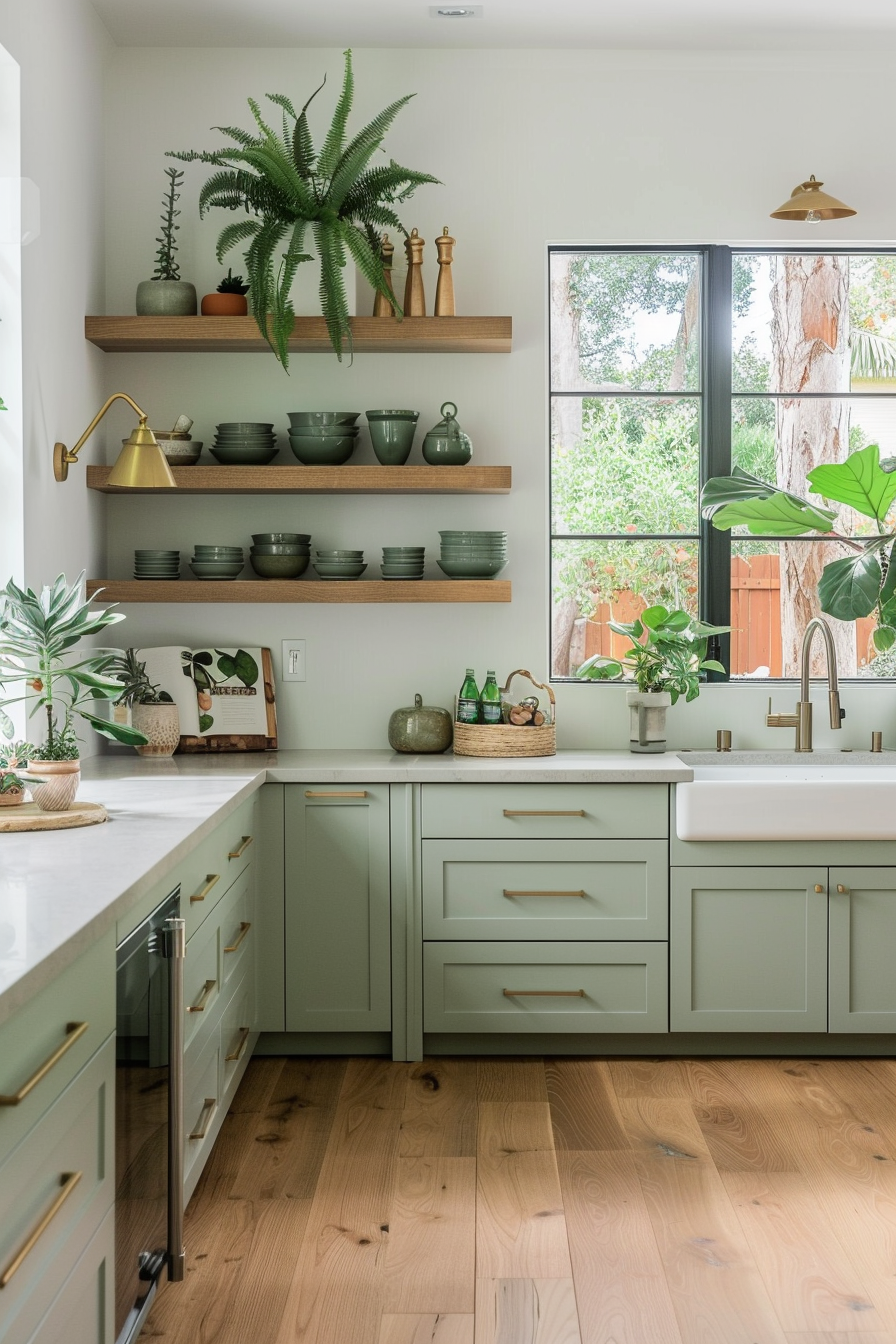
In addition to living plants, consider using green as a color in your kitchen’s design. This could be through cabinetry, backsplash tiles, or even small appliances. Shades of green, from soft sage to bold emerald, work well with the wood tones and neutral bases typical of mid-century modern design. Green can bring a fresh, natural element that complements the clean lines and geometric patterns.
If you’re not ready for a major color commitment, introduce green through accessories and decor. Think about adding green dishware, vases, or cushions to your dining chairs. These small touches can be easily updated as your style evolves and allow you to experiment with the color without a full remodel.
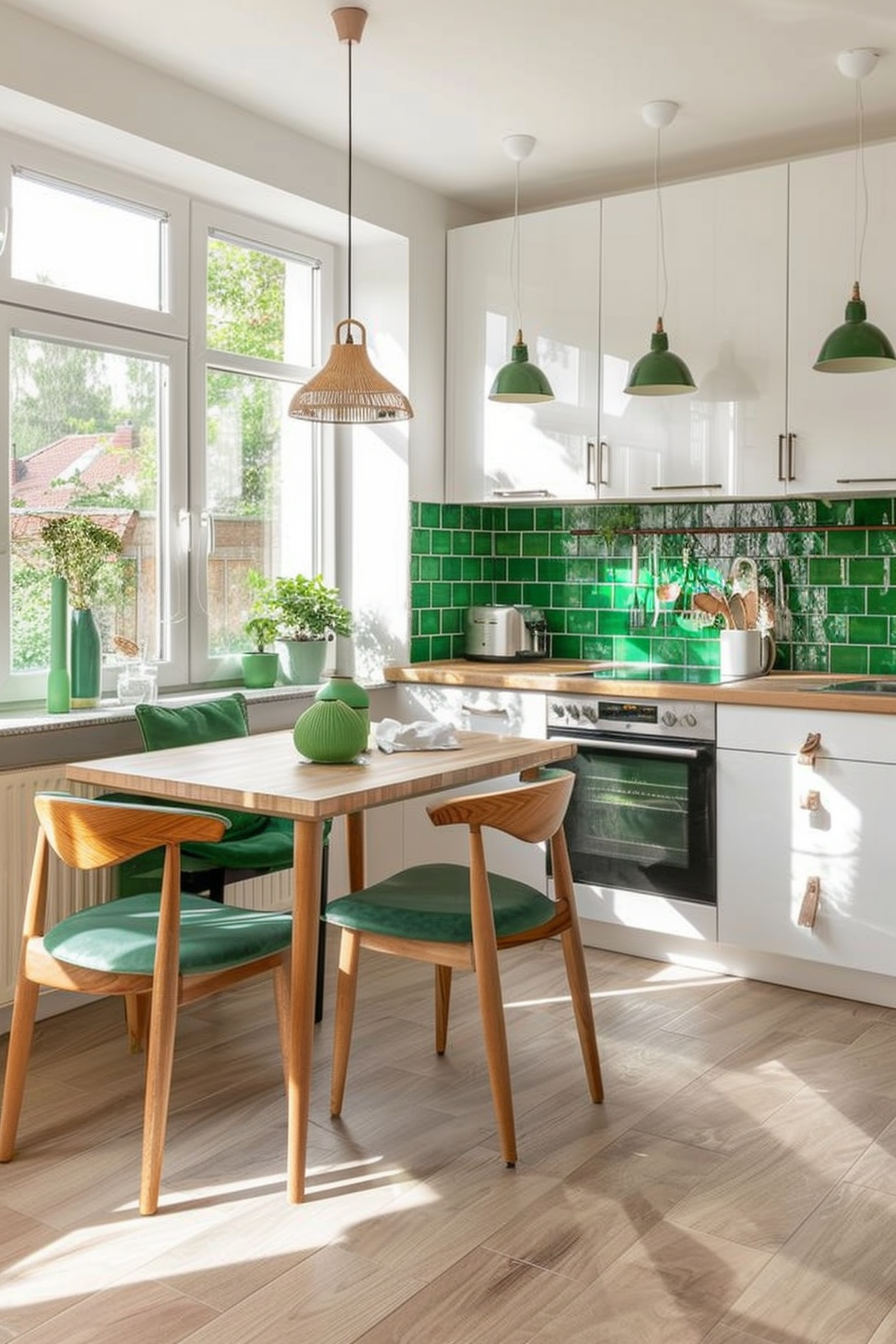
9. Add Retro-Inspired Decor for Authentic Flair
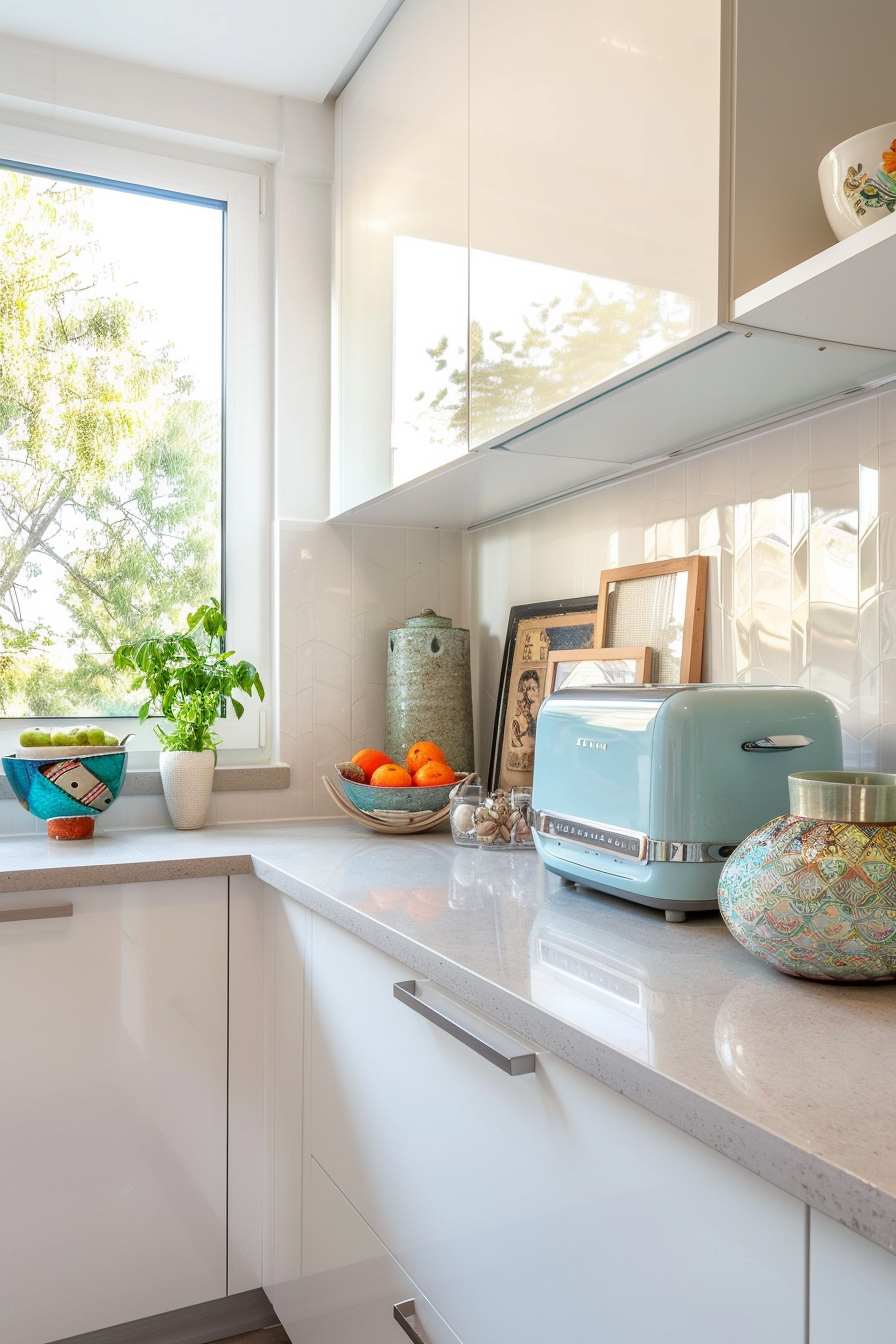
Incorporating retro-inspired decor is essential to achieving an authentic mid-century modern kitchen. Look for vintage pieces or reproductions that echo the design sensibilities of the 1950s and 60s. Think ceramic vases, geometric-patterned textiles, and bold-colored kitchenware. These elements add a touch of nostalgia and charm to your kitchen.
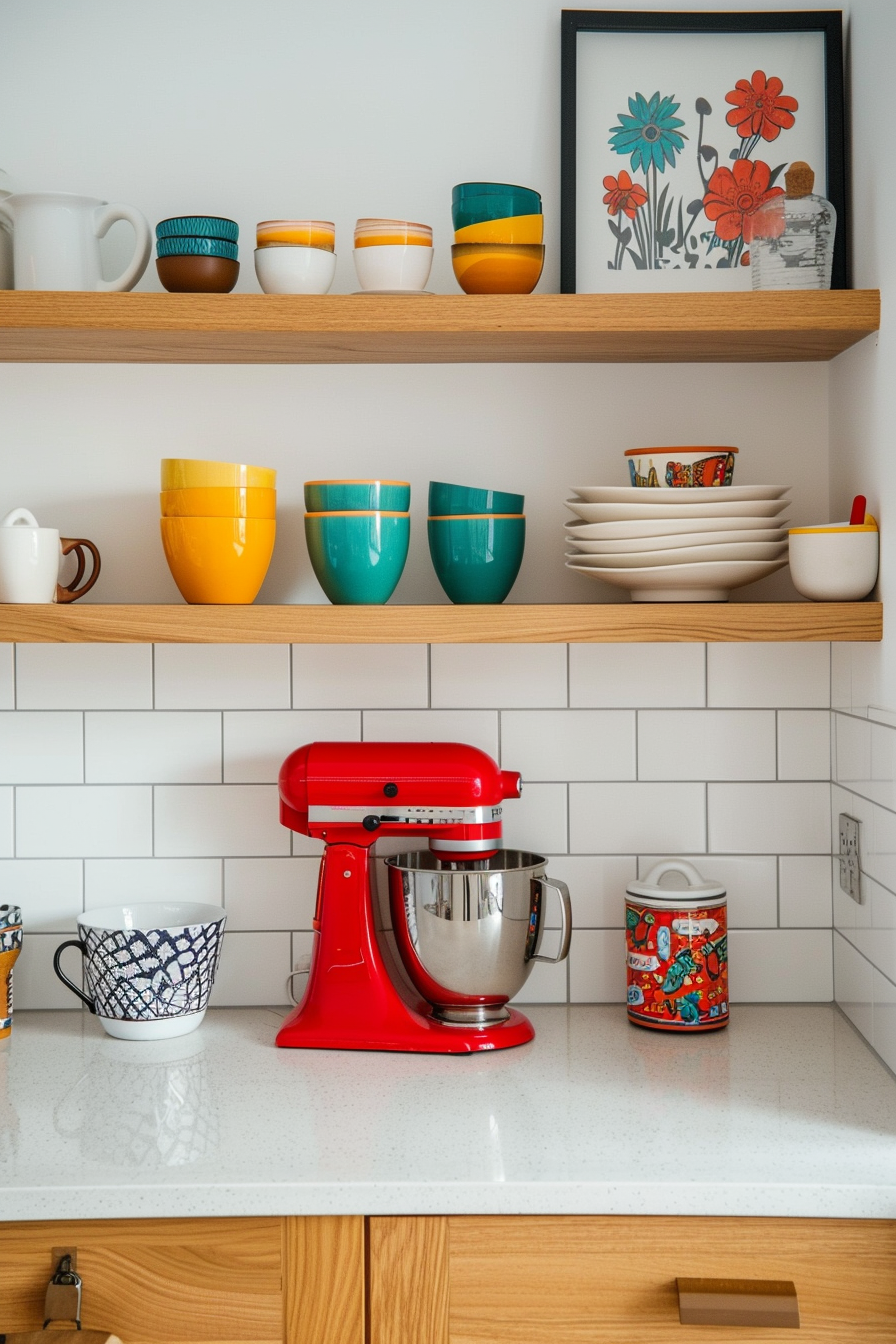
Consider displaying vintage kitchen gadgets or appliances that are functional and decorative. Retro toasters, mixers, or coffee makers in pastel shades can bring a playful and stylish touch. These items not only serve their purpose but also enhance the overall aesthetic of your mid-century modern kitchen.
Artwork and wall decor are also important in tying the design together. Choose prints or paintings that feature abstract shapes, vibrant colors, or scenes from the mid-century era. A strategically placed clock or a collection of framed vintage advertisements can add character and visual interest to your space without overwhelming the minimalist design.
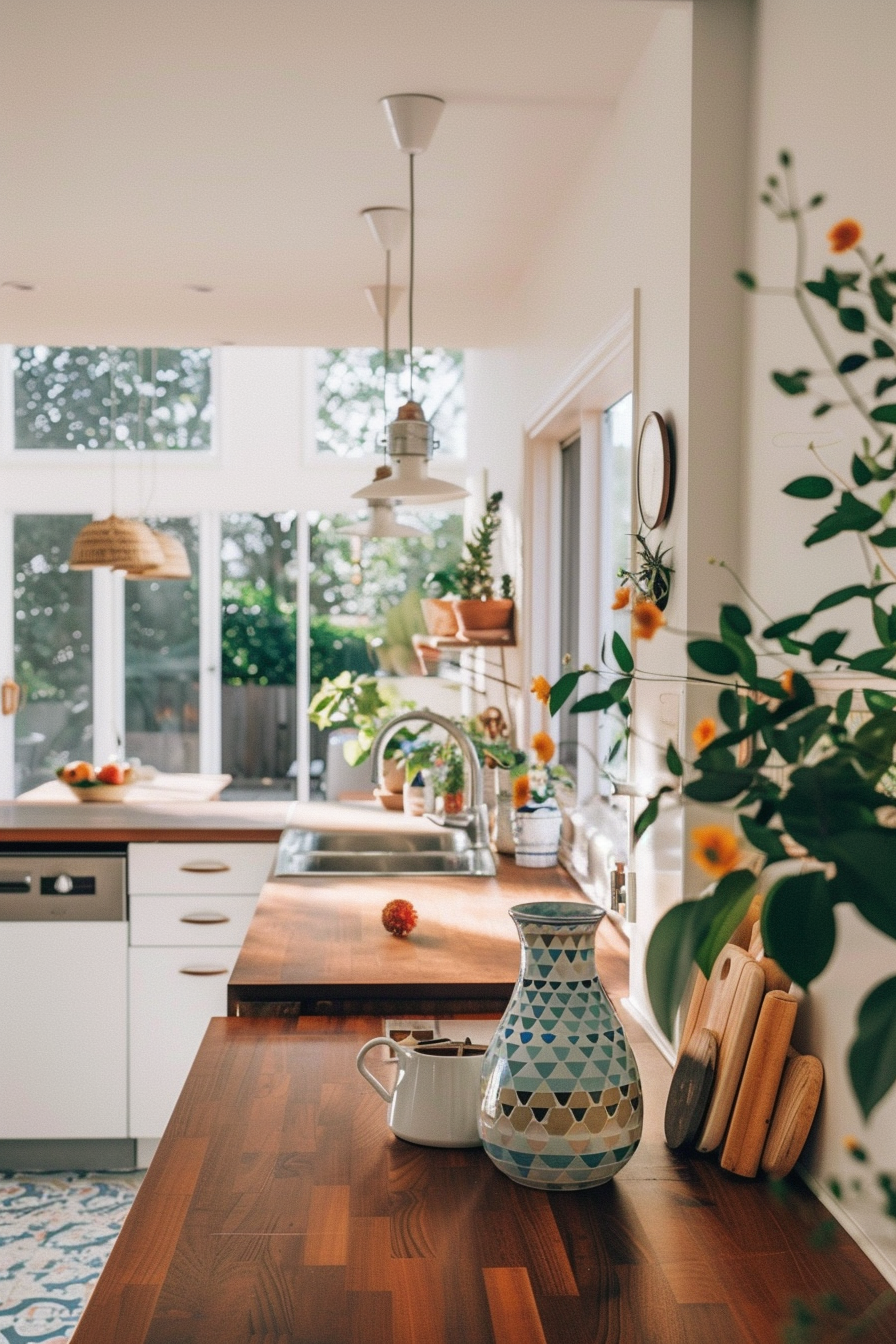
10. Utilize Iconic Mid-Century Furniture
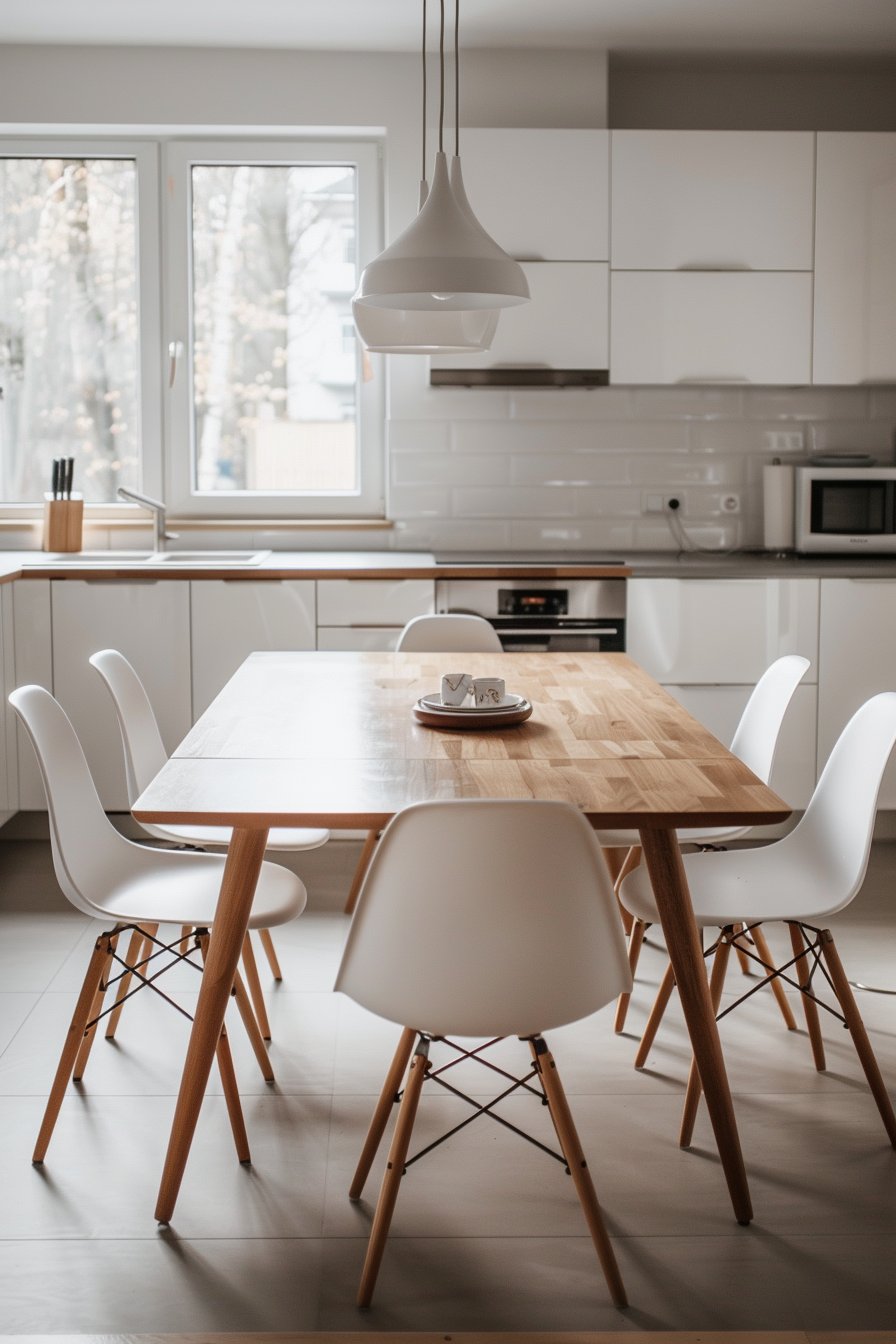
Furniture is a defining element in mid-century modern design. When selecting pieces for your kitchen, look for iconic styles that feature clean lines, tapered legs, and functional forms. Eames chairs, Tulip tables, and Saarinen stools are just a few examples of furniture that capture the essence of the mid-century modern era.
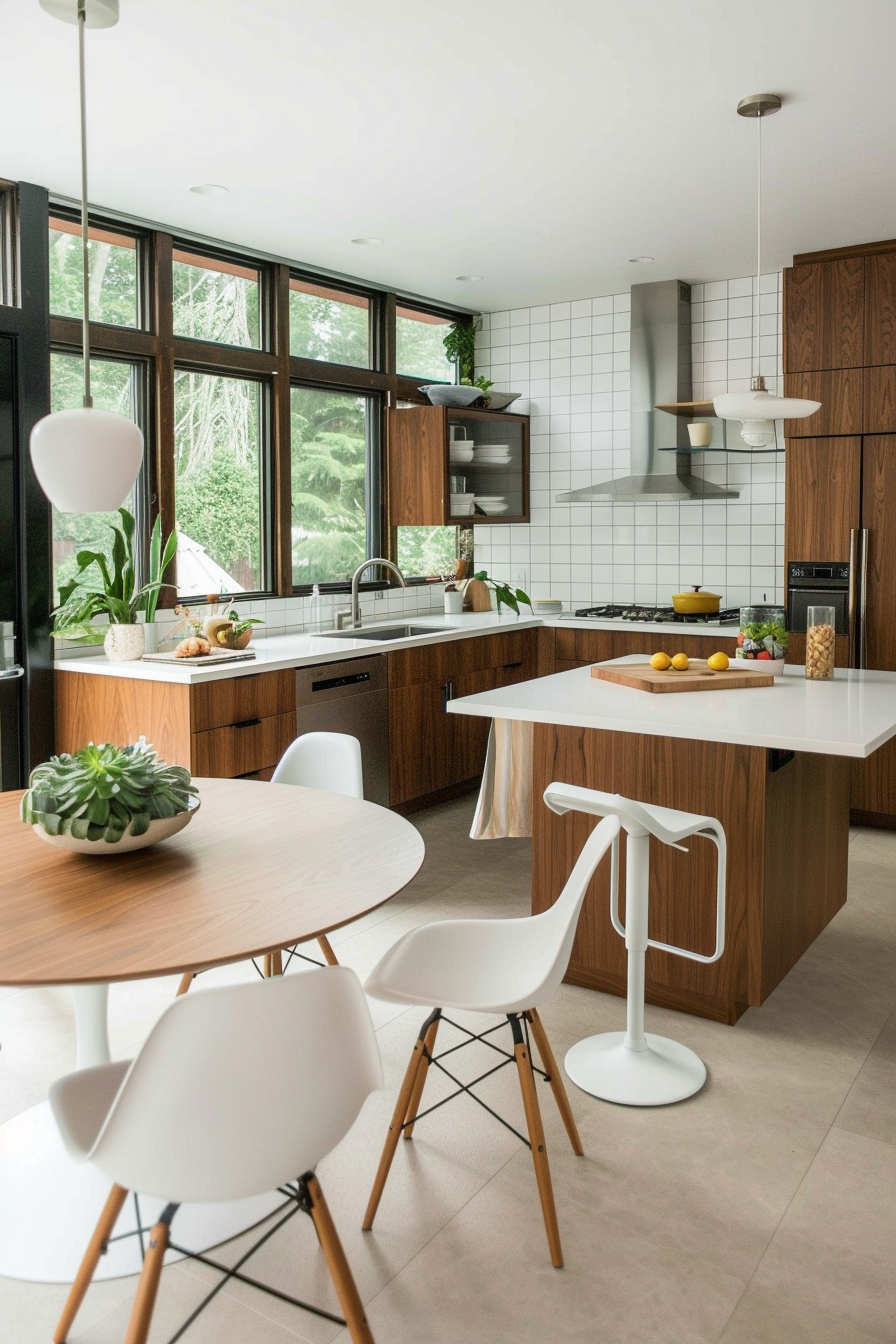
These pieces are not only visually appealing but also highly functional. A Tulip table, with its sleek pedestal base, provides ample seating without the clutter of legs, making it perfect for a small kitchen or dining area. Eames chairs, known for their ergonomic design and timeless appeal, can be used as dining chairs or as additional seating around a kitchen island.
Mix and match different styles to create a cohesive yet dynamic look. Pair a classic wooden dining table with molded plastic chairs or combine a sleek metal stool with a wooden countertop. The key is to balance different materials and shapes while maintaining the overall minimalist aesthetic.
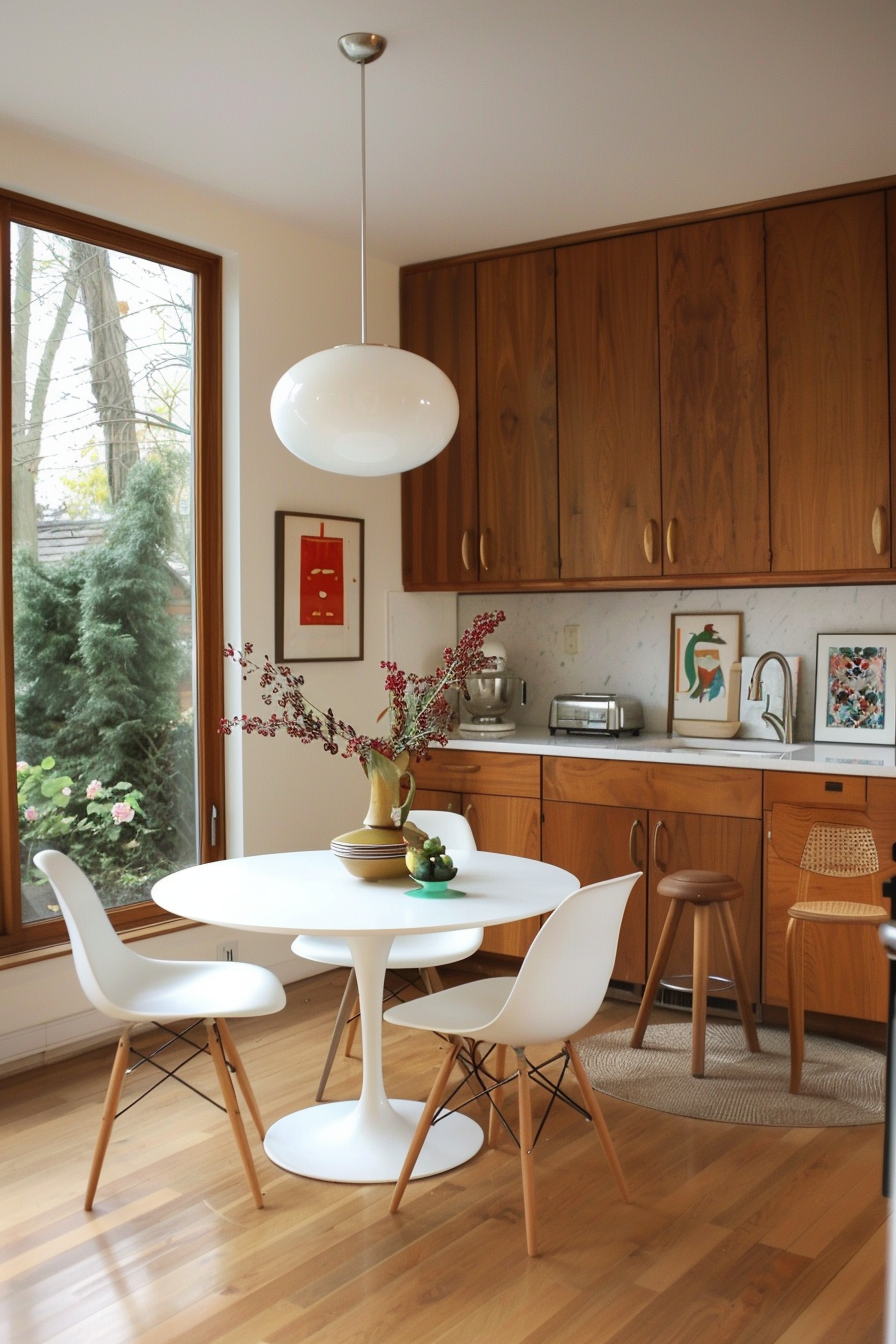
11. Incorporate Wood and Natural Materials
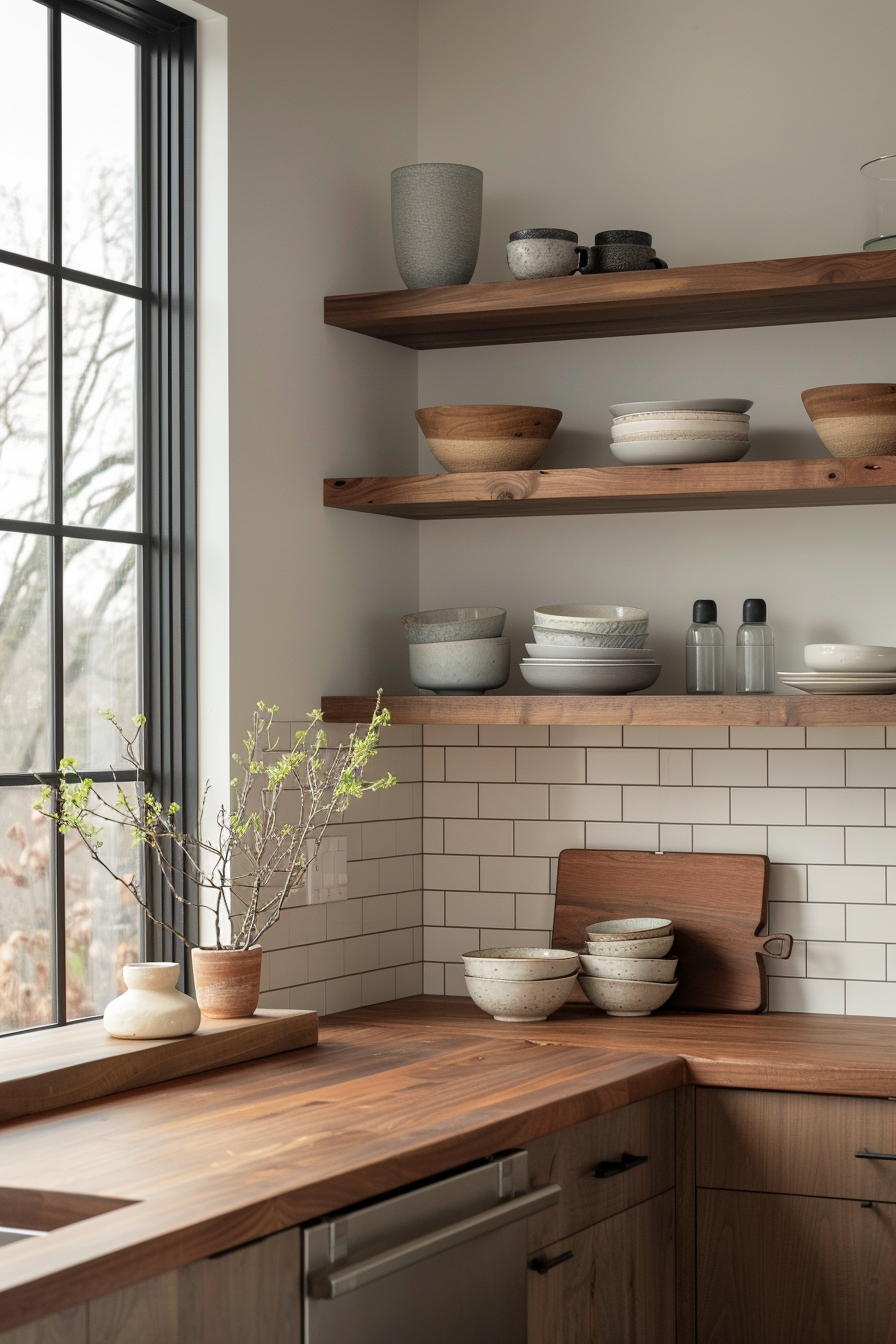
Wood and natural materials play a significant role in mid-century modern design, adding warmth and texture to your kitchen. Choose cabinetry, countertops, or furniture that features natural wood finishes like walnut, teak, or oak. These materials not only provide a rich, organic feel but also complement the clean lines and minimalist aesthetic of the style.
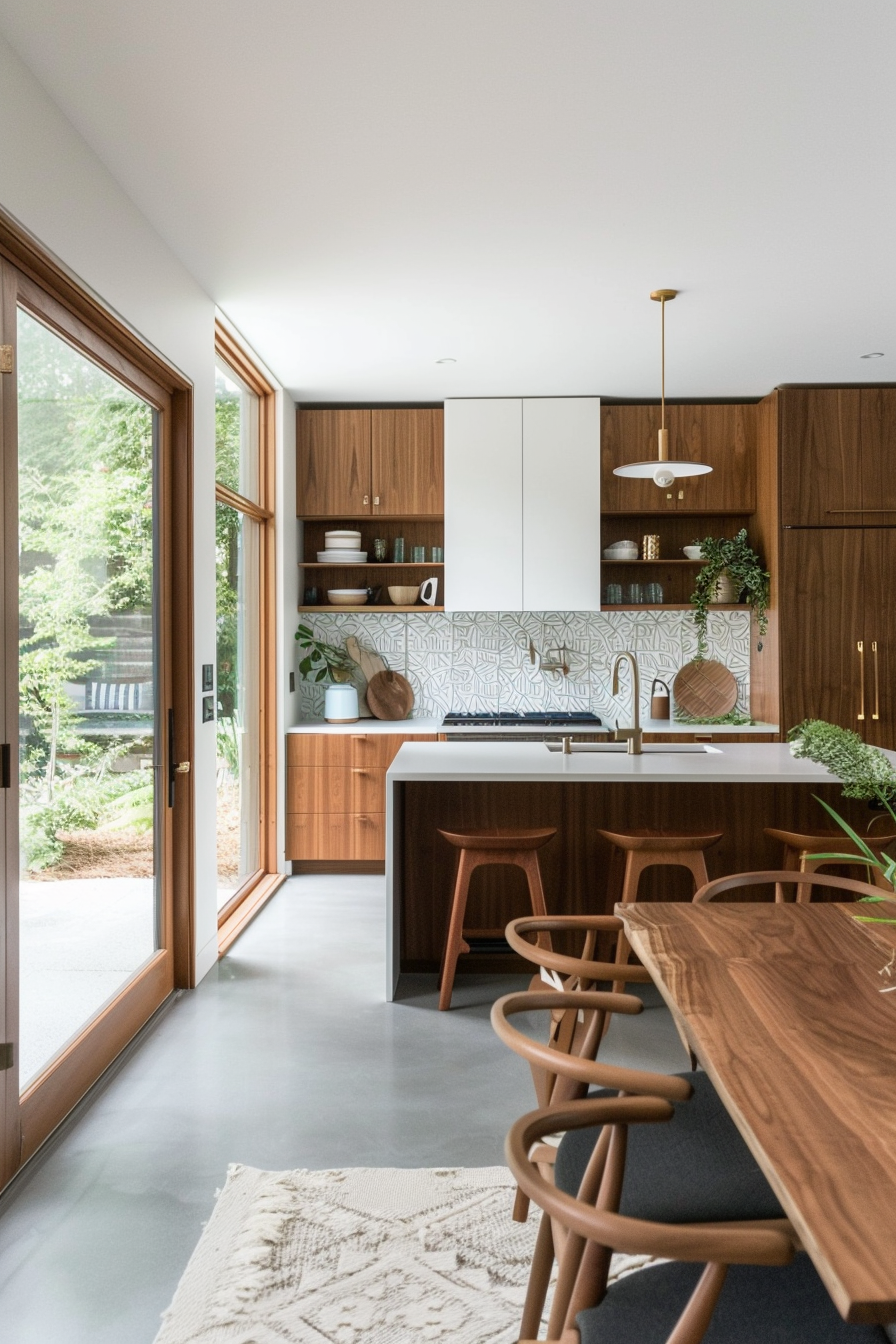
Consider integrating wooden elements in unexpected places, such as a butcher block countertop or wooden open shelving. These touches bring a sense of craftsmanship and authenticity to your kitchen, enhancing its overall appeal. Additionally, combining wood with other materials like metal or glass can create a balanced and harmonious look.
Natural materials extend beyond just wood. Stone countertops, ceramic tiles, and woven textiles also contribute to the mid-century modern aesthetic. Opt for materials that are both durable and visually appealing, ensuring that they enhance the functionality and beauty of your kitchen.
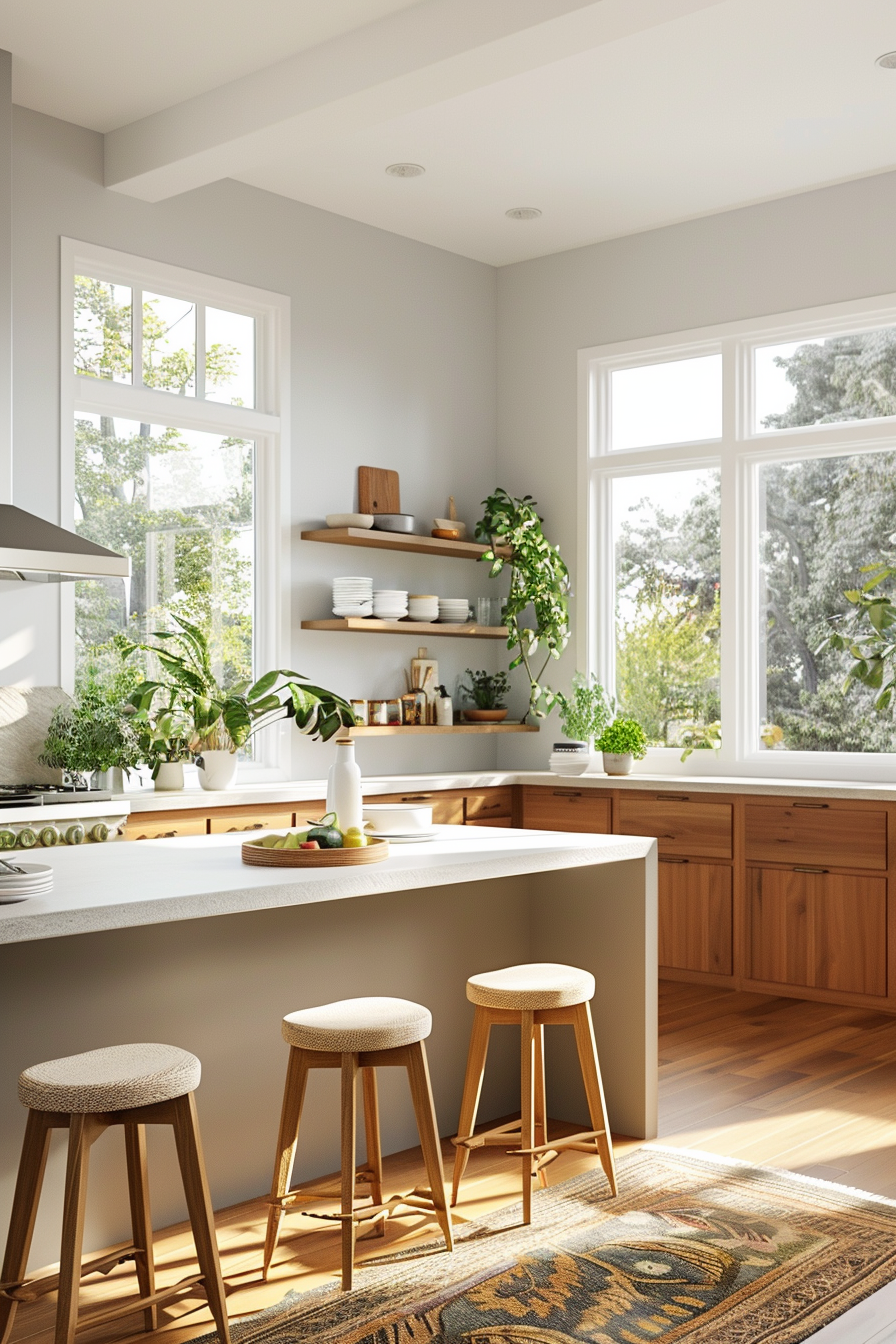
12. Implement Smart and Subtle Storage Solutions
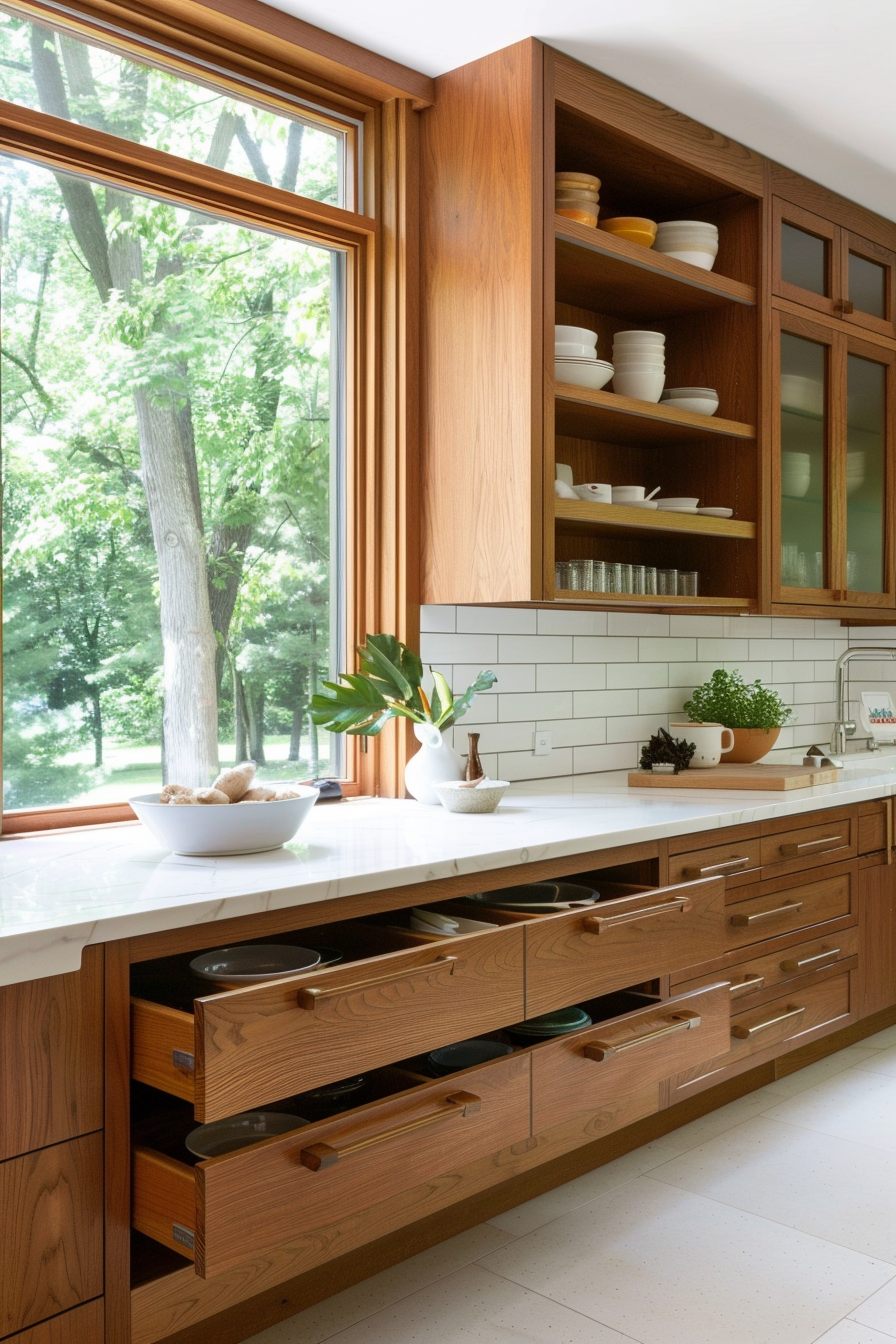
Storage is essential in any kitchen, but it’s particularly important in a mid-century modern design where clutter can disrupt the clean, minimalist aesthetic. Opt for smart and subtle storage solutions that keep your kitchen organized without compromising on style. Integrated or hidden storage is ideal, providing ample space for your kitchen essentials while maintaining a sleek and uncluttered appearance.
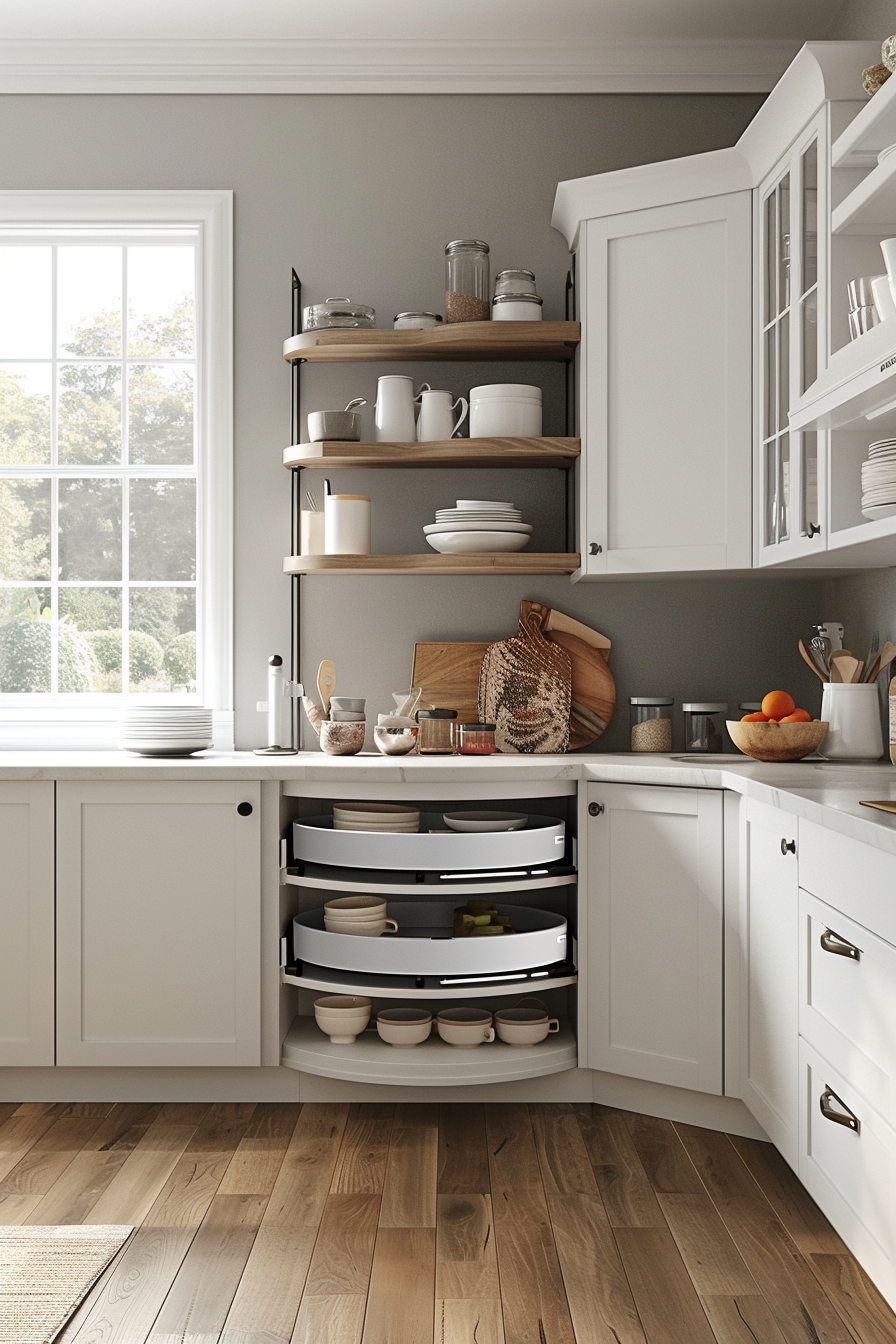
Consider using pull-out drawers, lazy Susans, and deep cabinets to maximize storage efficiency. These features allow you to store a large number of items in an easily accessible and organized manner. Additionally, integrated appliances and concealed handles contribute to a streamlined look, keeping the focus on the overall design rather than the hardware.
Open shelving can also be a functional and stylish storage option. Display your most attractive dishware, glassware, or cookbooks on open shelves, turning them into decor elements. Just be sure to keep the shelves tidy and well-organized to maintain the clean lines and visual harmony typical of mid-century modern design.
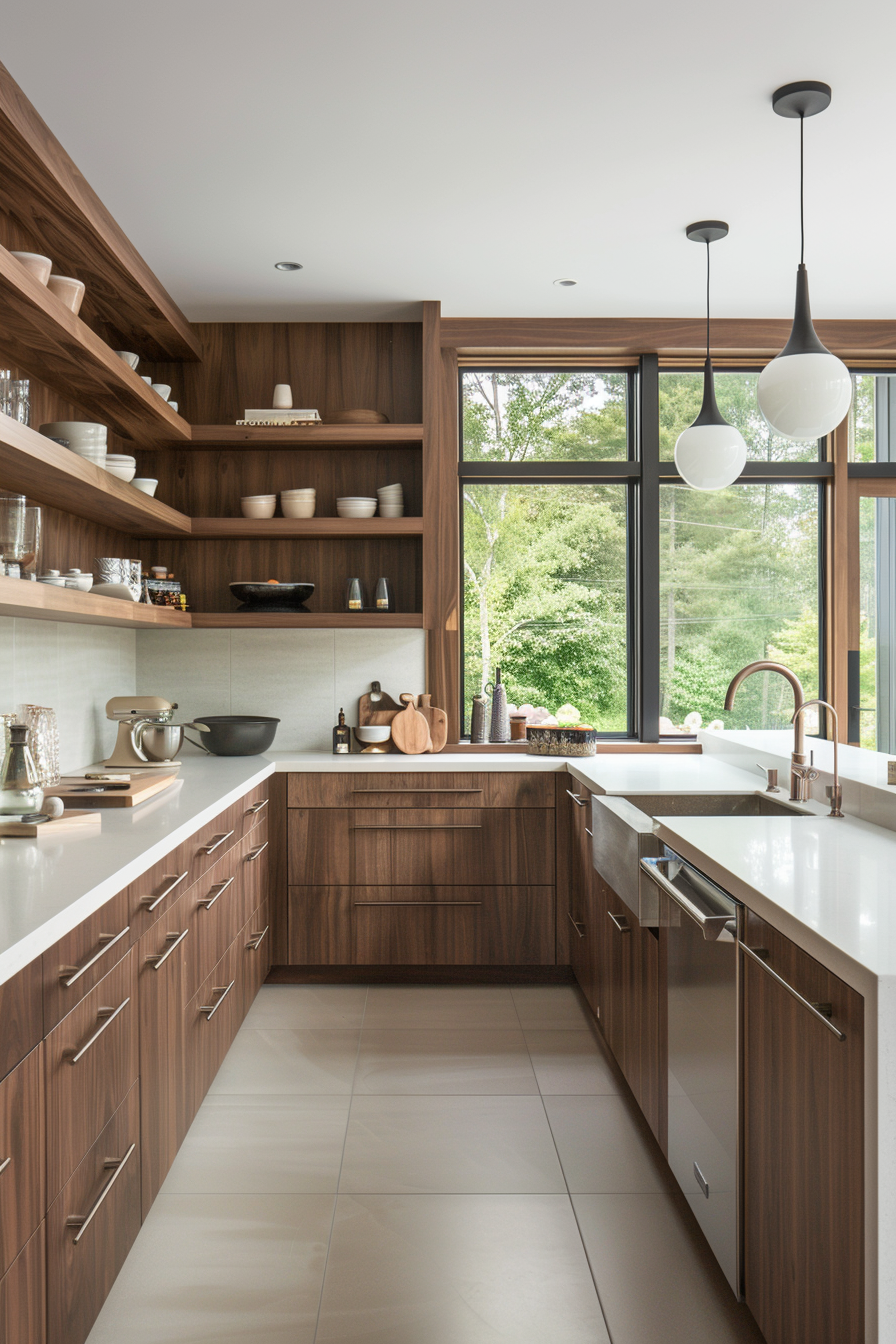
13. Experiment with Bold and Vibrant Colors
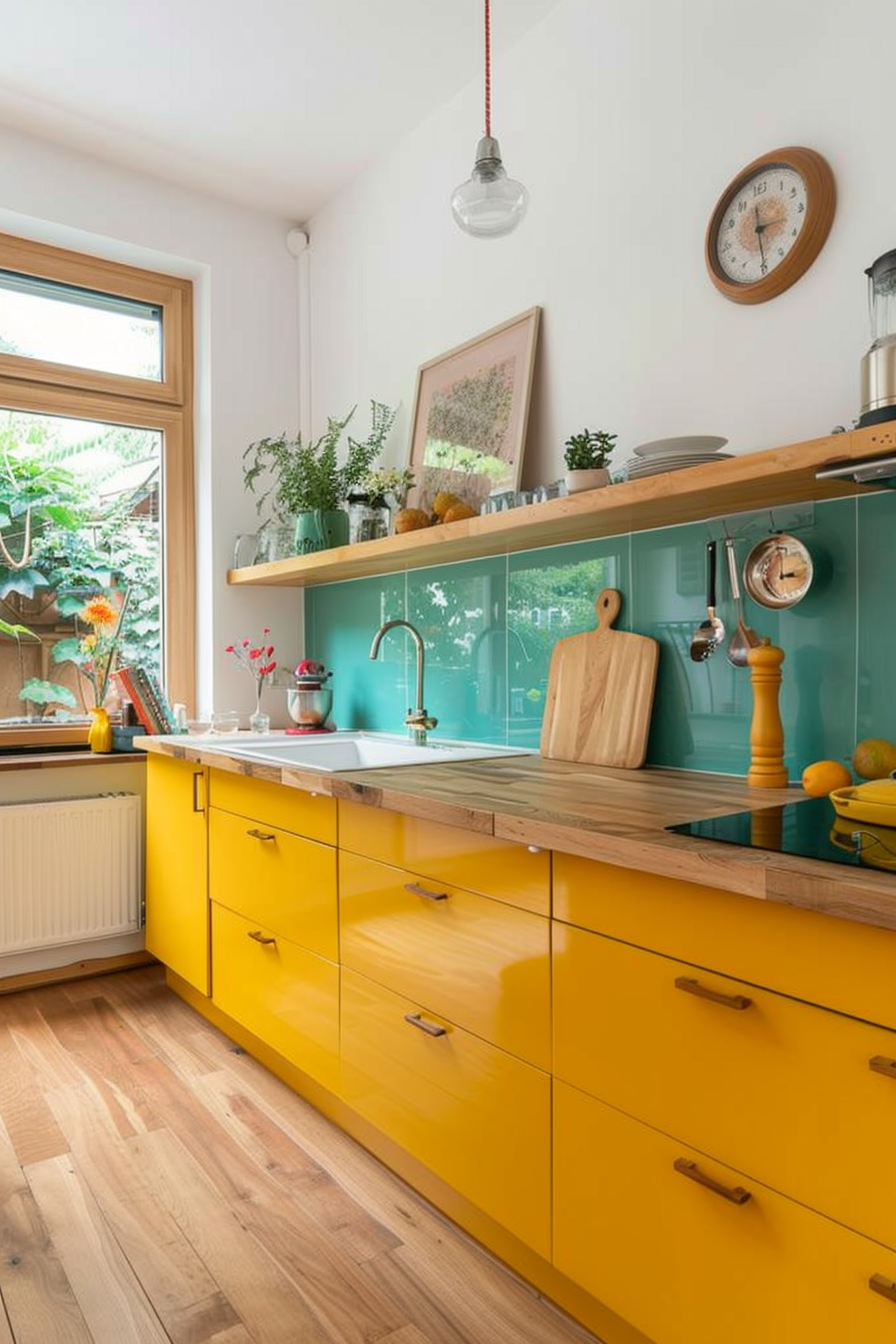
Mid-century modern design is known for its bold use of color. Don’t be afraid to experiment with vibrant hues in your kitchen. Incorporate colors like mustard yellow, burnt orange, teal, or avocado green to create a lively and dynamic space. These colors can be used on cabinets, walls, or as accents through appliances and accessories.
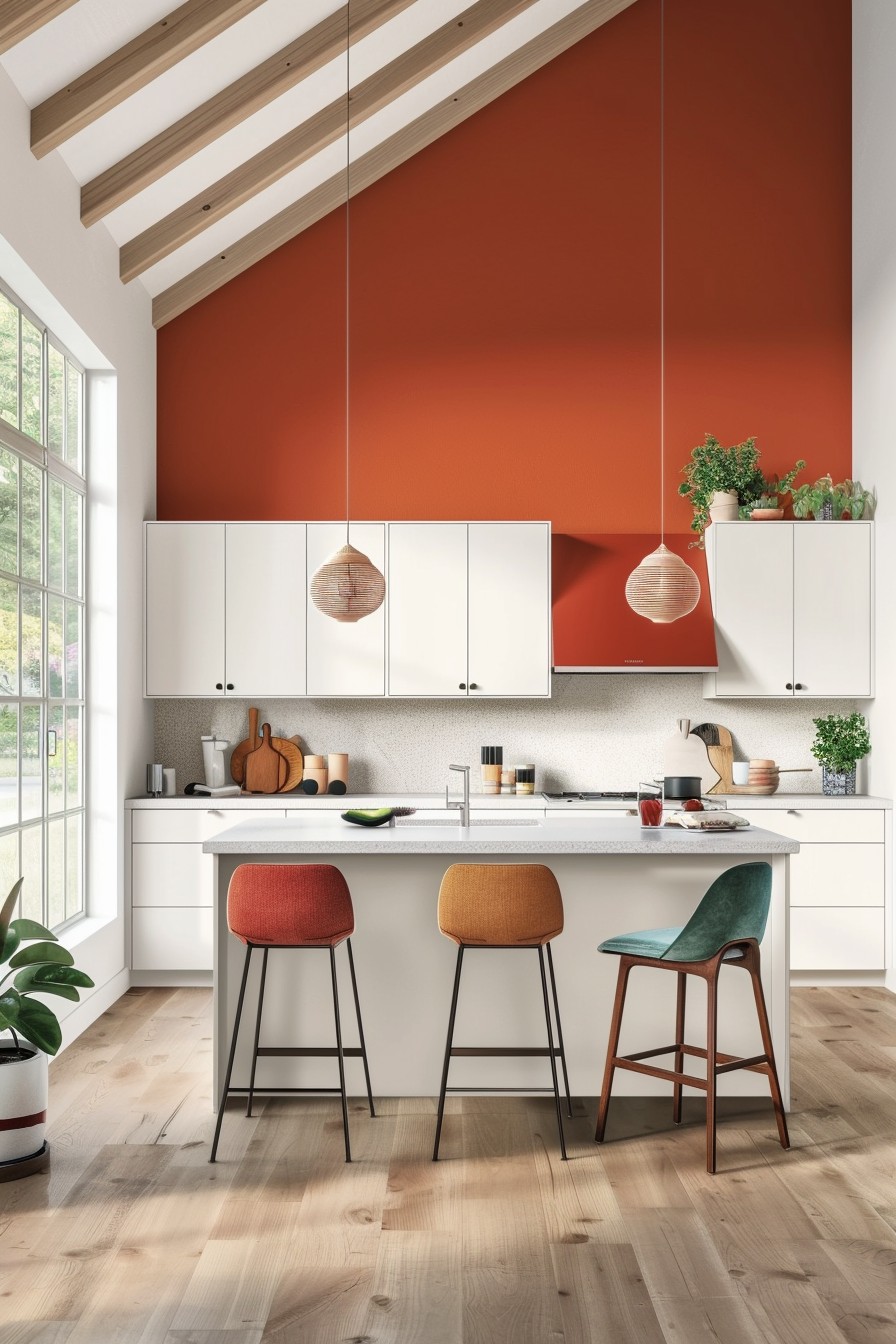
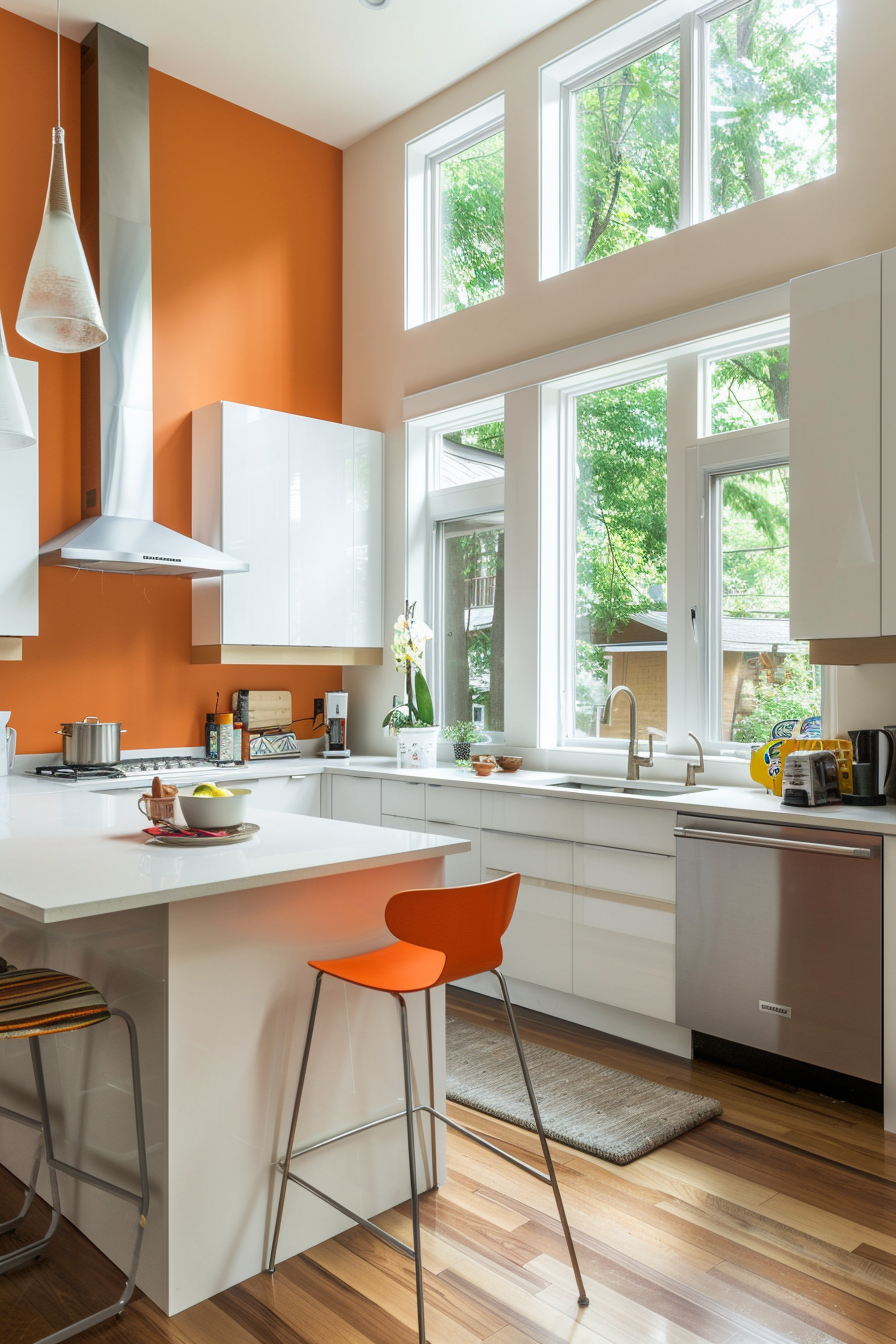
To maintain balance, pair bold colors with neutral tones. This approach allows the vibrant hues to stand out without overwhelming the space. For example, a bright teal backsplash can be beautifully offset by white or light gray cabinetry. Alternatively, a mustard yellow feature wall can be paired with natural wood finishes for a harmonious look.
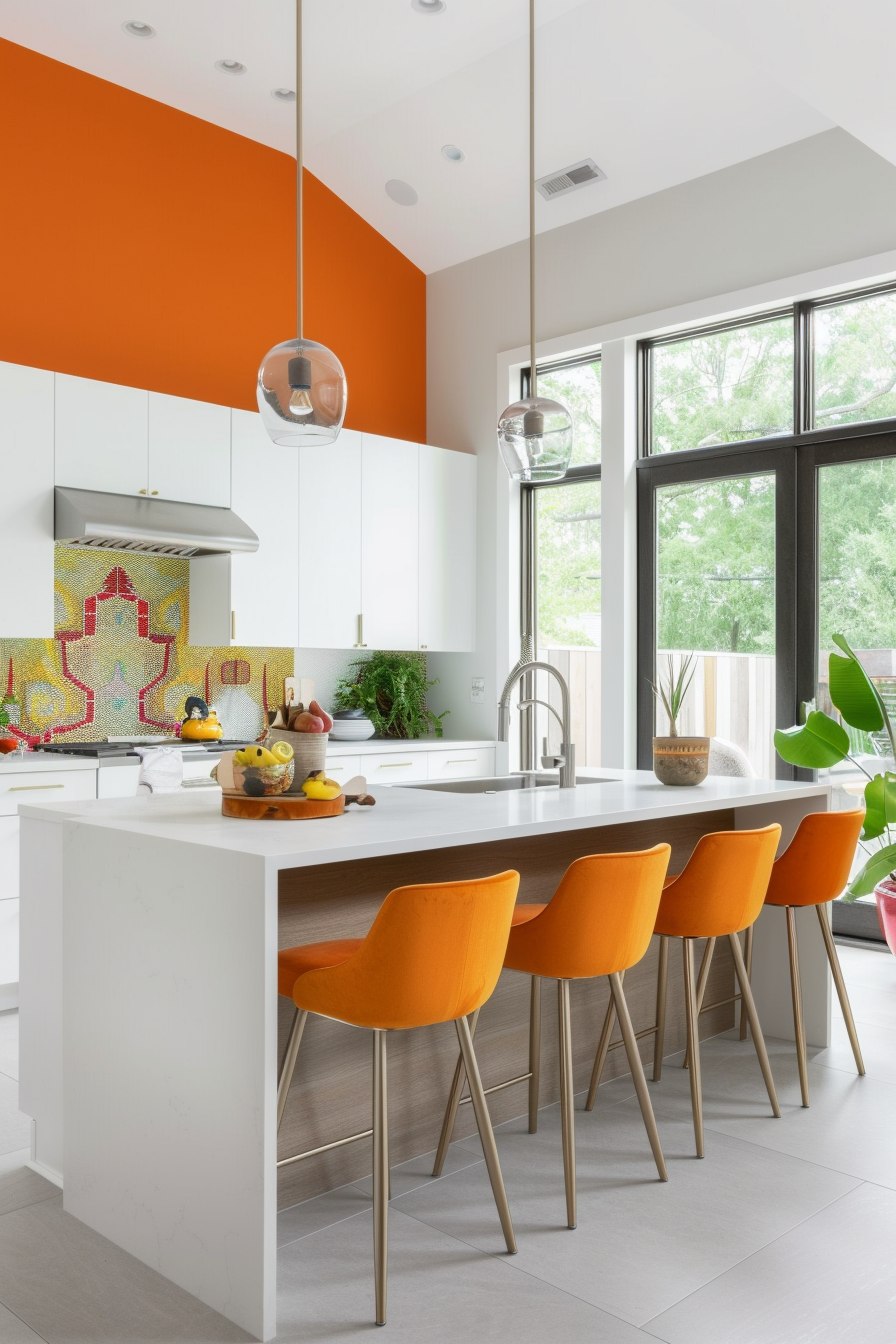
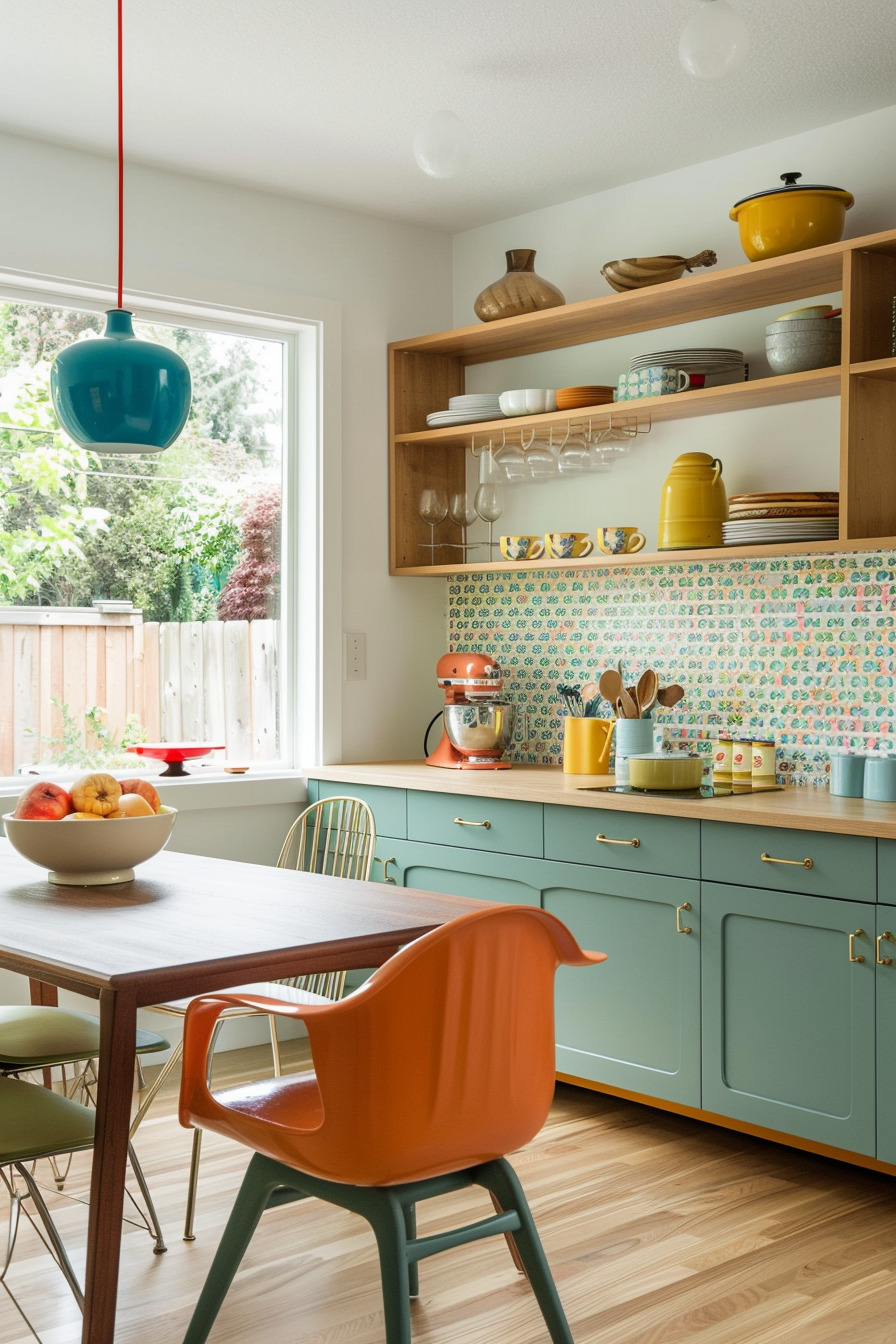
Introduce color through smaller details if you prefer a more understated approach. Colorful bar stools, kitchenware, or artwork can add pops of color without a major commitment. This way, you can easily update your decor as trends and preferences change, keeping your kitchen fresh and modern.
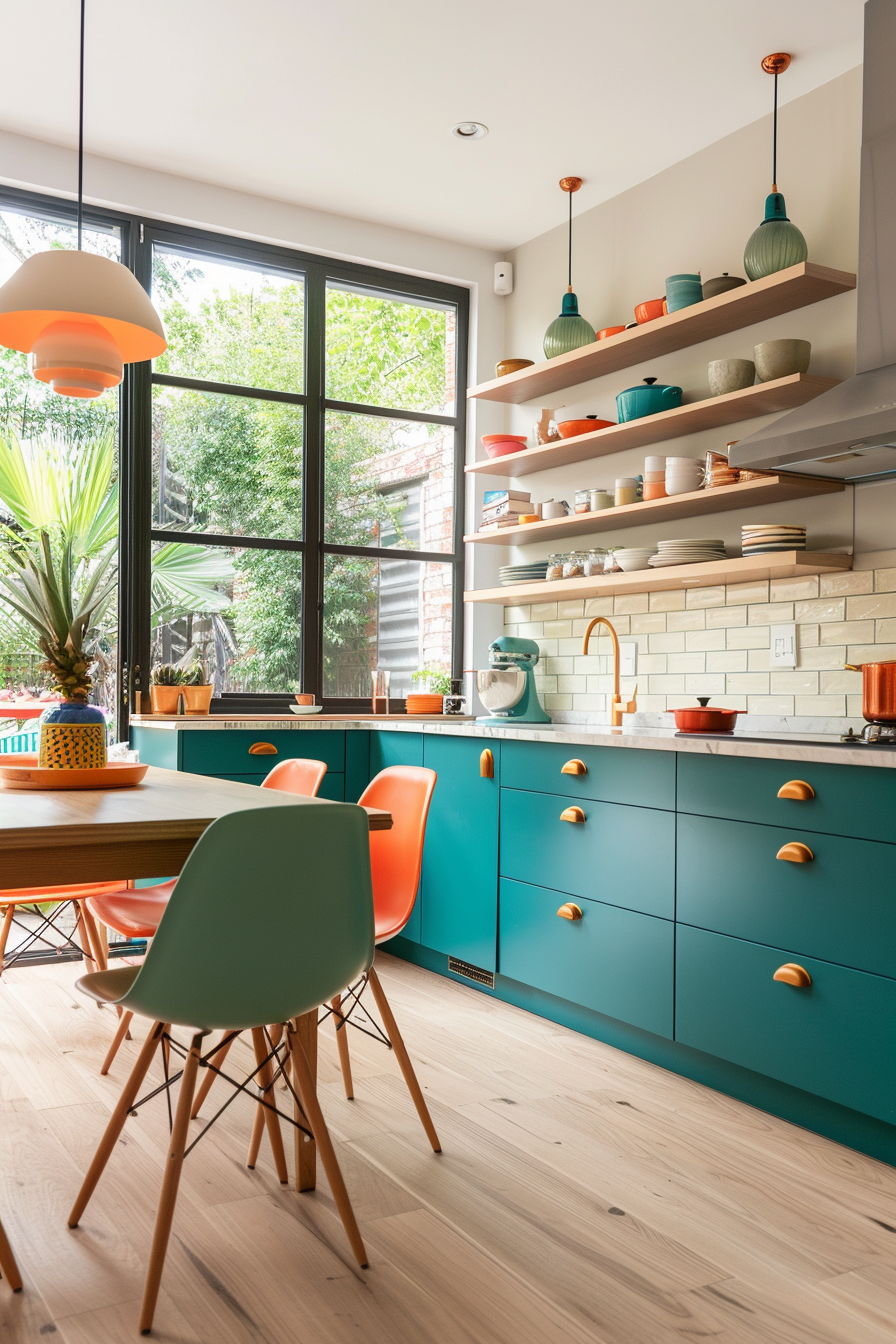
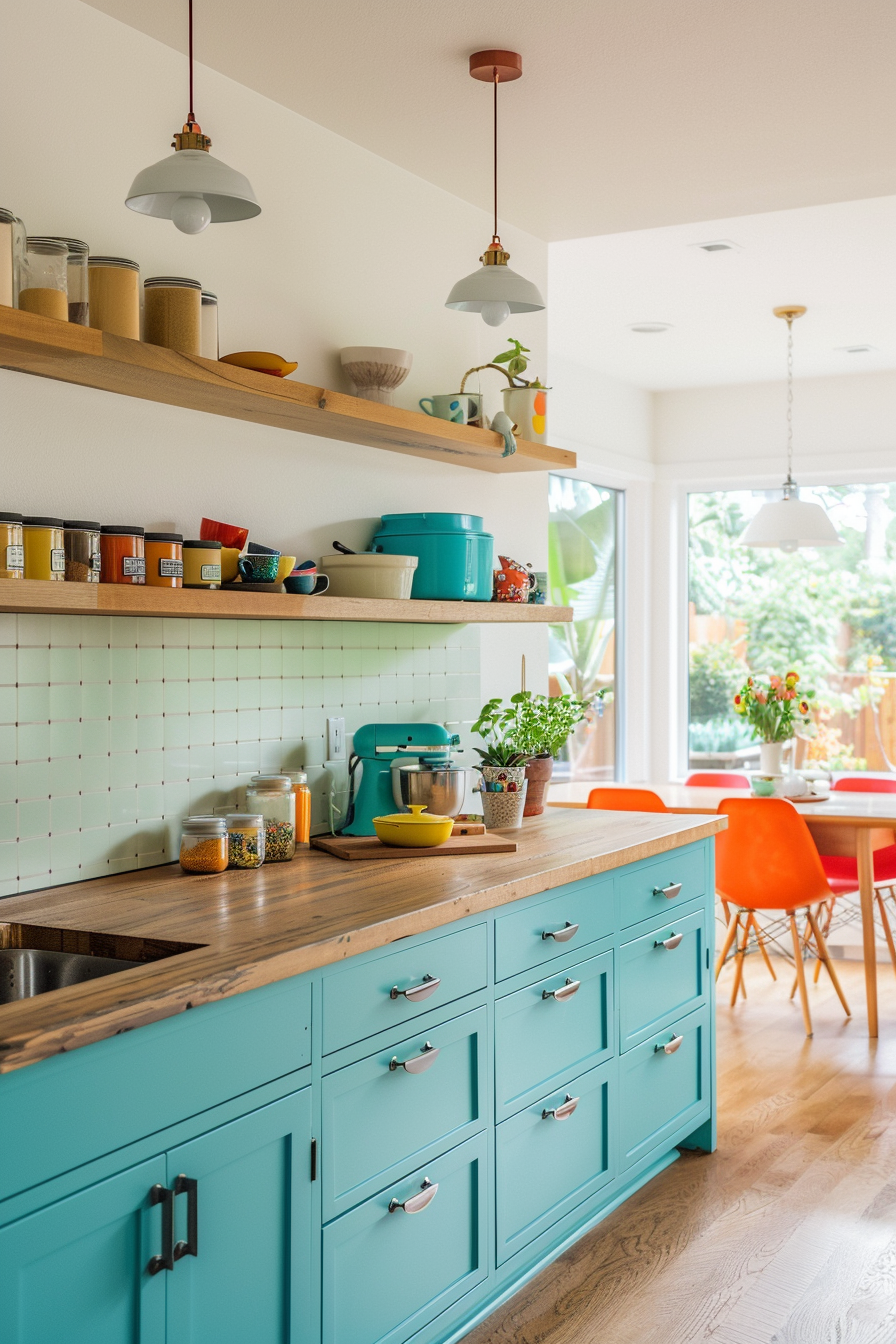
14. Blend Indoor and Outdoor Spaces
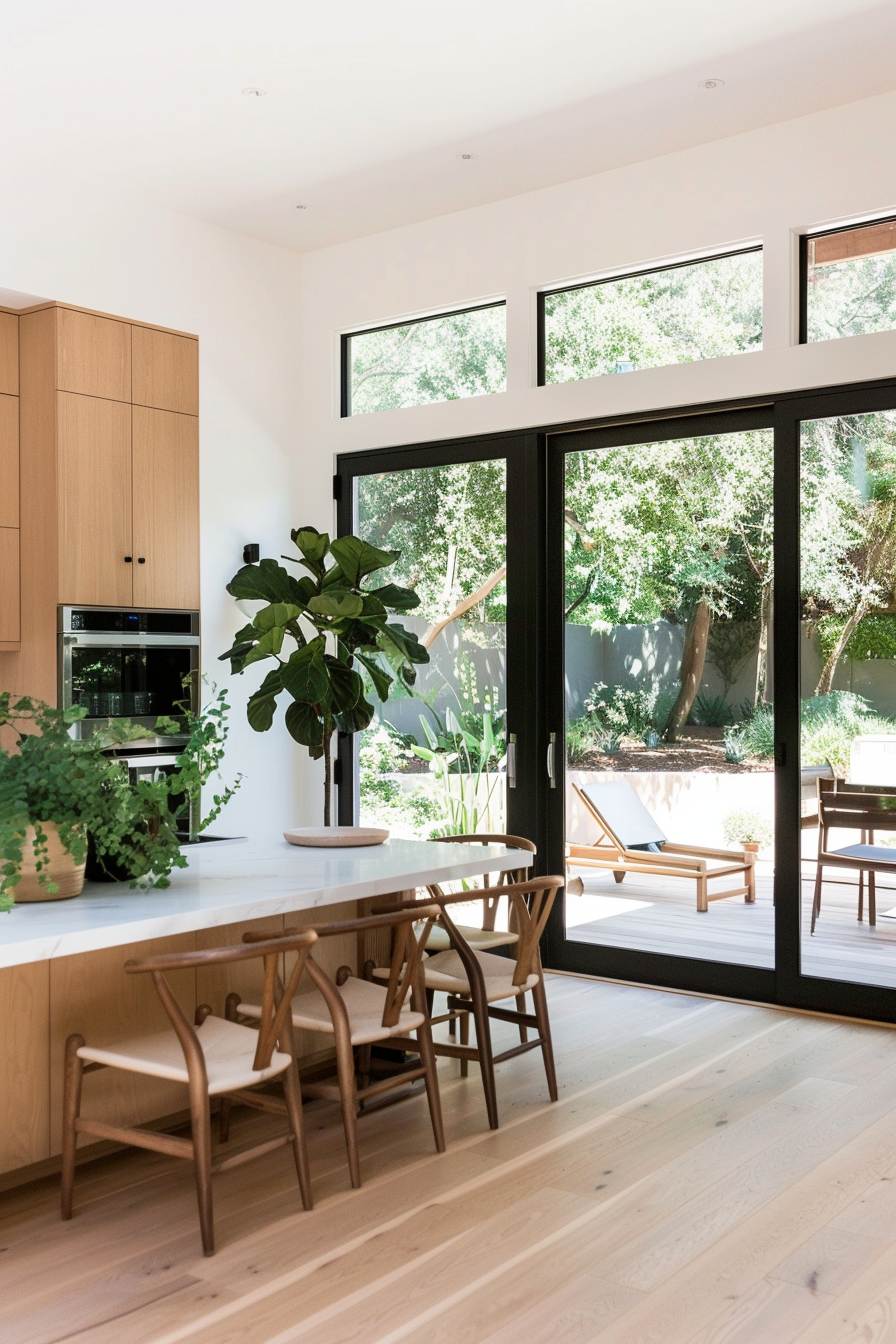
A seamless connection between indoor and outdoor spaces is a key element of mid-century modern design. In your kitchen, consider ways to blur the lines between inside and outside. Large windows or glass doors that open onto a patio or garden can create this effect, bringing in natural light and views of nature.
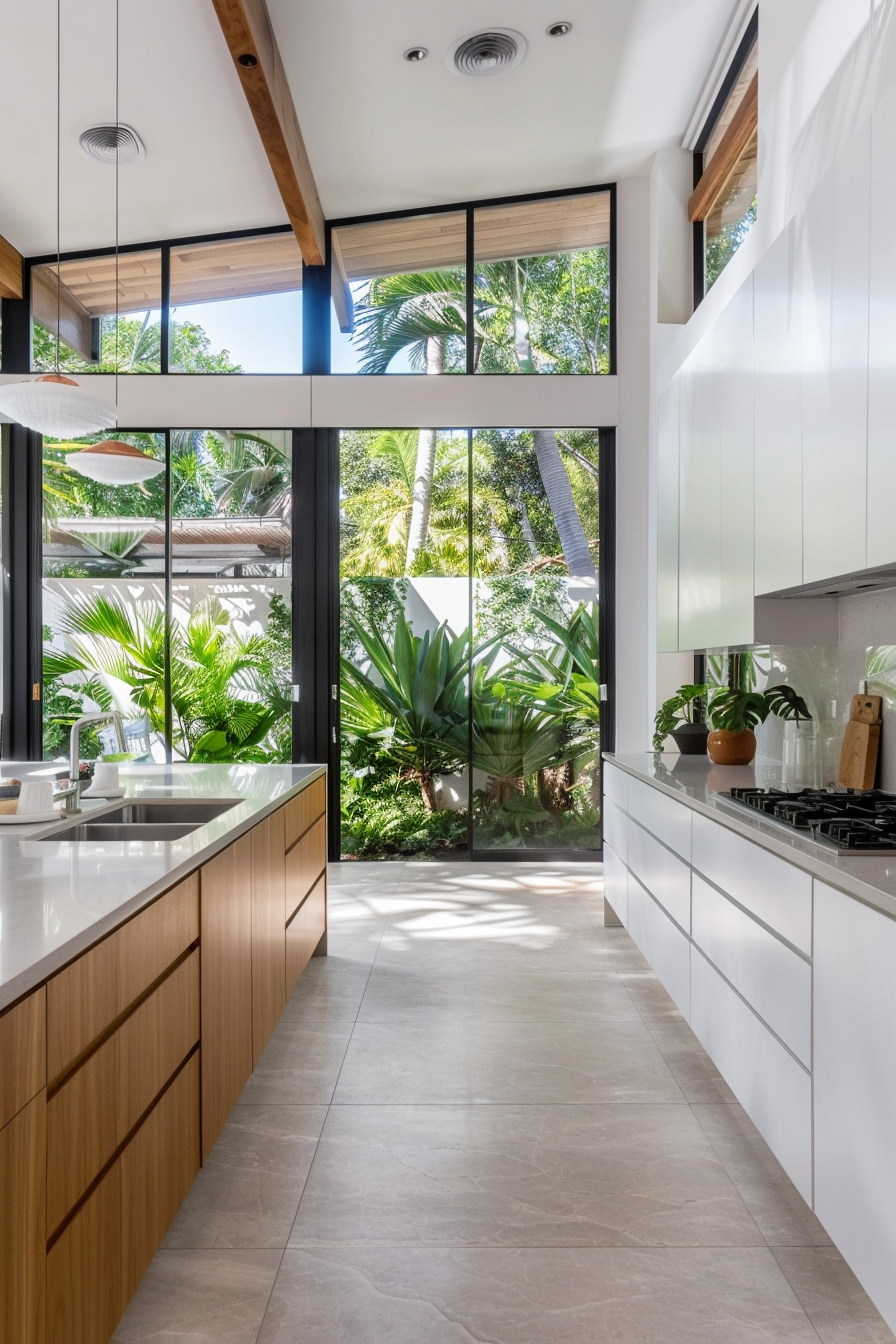
Incorporate materials and colors that reflect the outdoor environment. Natural wood, stone, and earthy tones can help create a cohesive look that extends from your kitchen to the outside. You can also use plants and greenery to enhance this connection, adding a natural and organic touch to your kitchen decor.
If space allows, consider extending your kitchen into an outdoor cooking or dining area. This could be a simple patio setup with a table and chairs or a more elaborate outdoor kitchen with cooking facilities. This approach not only expands your living space but also creates a beautiful and functional area for entertaining and enjoying the outdoors.
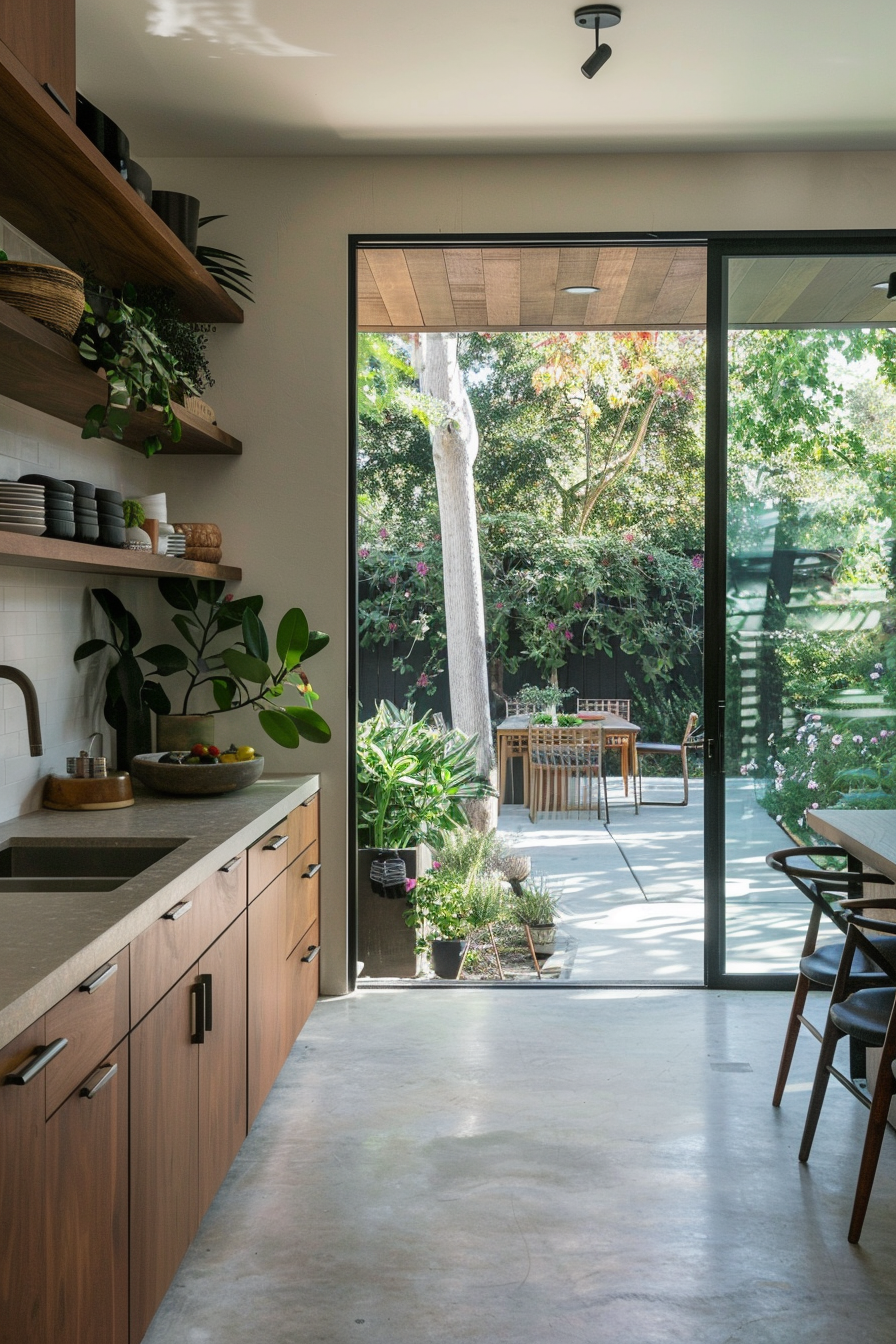
15. Balance Form and Function
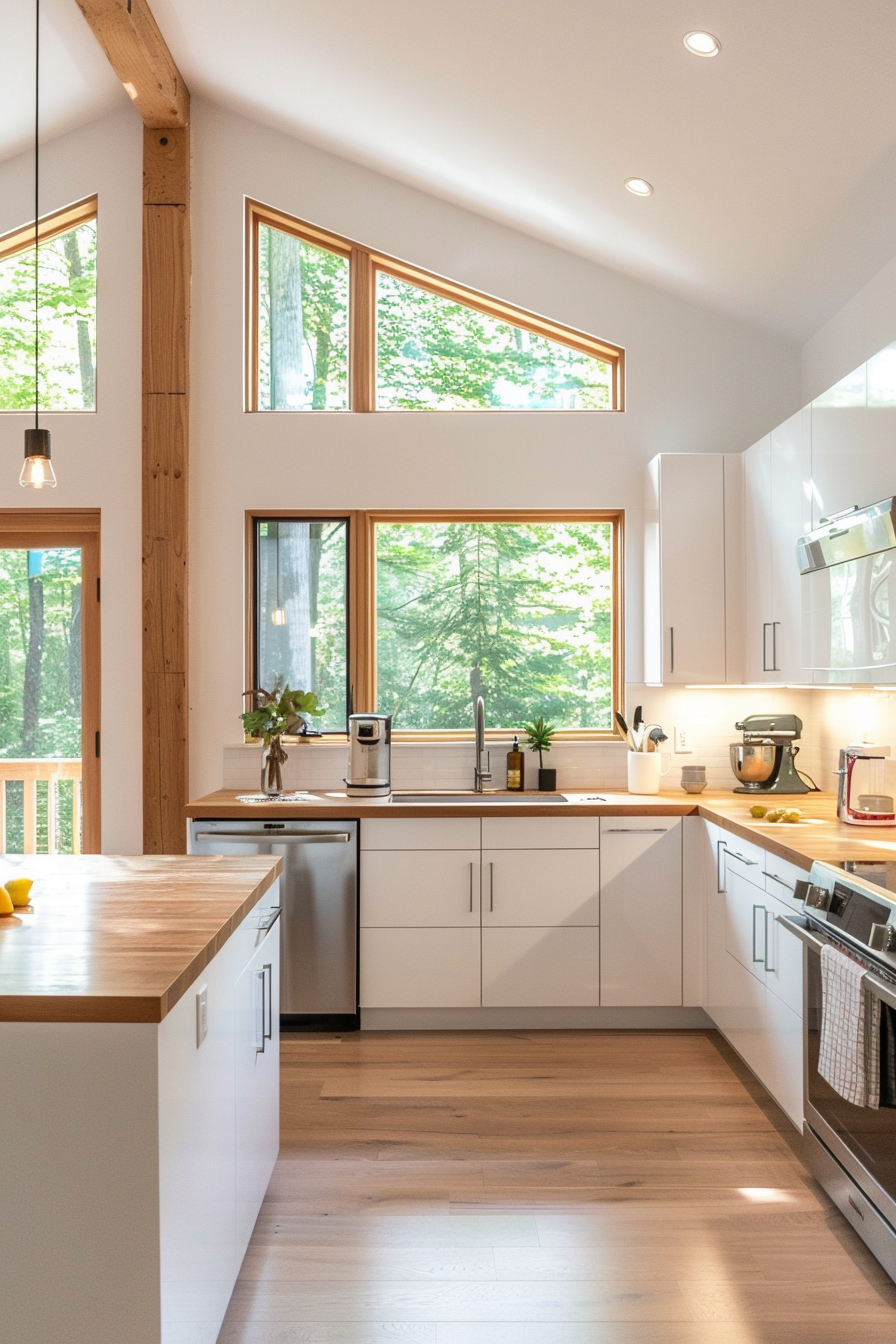
The essence of mid-century modern design lies in its ability to balance form and function. In your kitchen remodel, prioritize pieces that are both beautiful and practical. Opt for appliances, fixtures, and furniture that enhance the overall aesthetic while also meeting your functional needs.
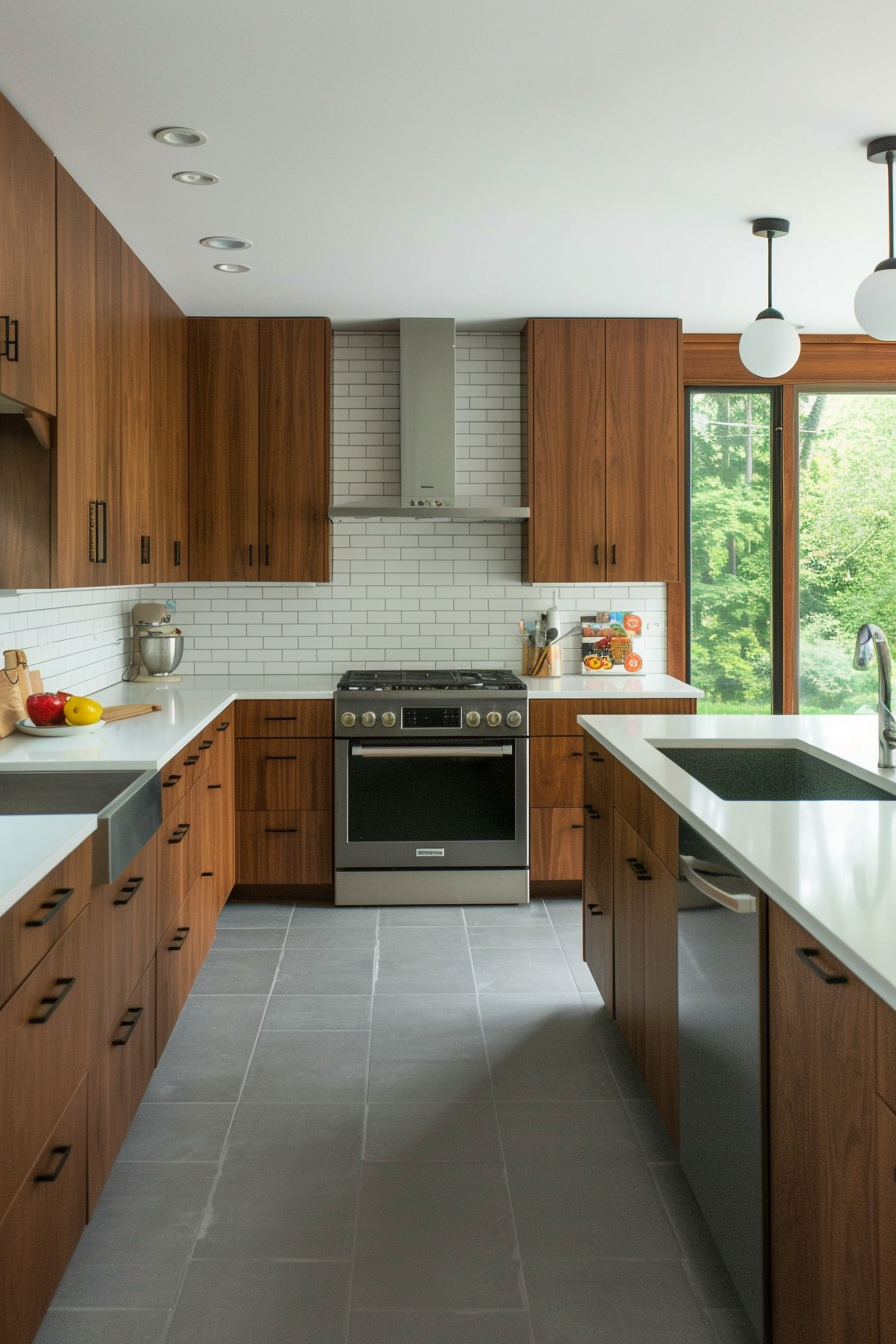
Consider the workflow and layout of your kitchen to ensure it supports efficient and enjoyable cooking and dining experiences. Arrange your appliances and workspaces in a way that minimizes unnecessary movement and maximizes convenience. A well-planned kitchen layout not only looks good but also makes daily tasks easier and more enjoyable.
Lastly, pay attention to the details. From the hardware on your cabinets to the selection of your lighting fixtures, every element should contribute to the overall design while serving a purpose. By carefully balancing form and function, you can create a mid-century modern kitchen that is both stylish and practical.
